How do I find my way around Crusader Kings 3? How do I organize Council, Realm and the necessary laws? How do I improve my Traits and Skills? What possibilities does building construction offer me and how do I wage wars efficiently? Our ultimate guide to Crusader Kings 3 answers these questions and many more.
- Blue or different-colored bars with a double arrow symbol include texts and sometimes tables, which are folded for clarity. Click or tap on the bars to open them. When using mobile devices, slide your finger to the left to fully view the tables.
In this guide for Crusader Kings 3 you will learn:
- What you have to pay attention to when starting the game (including the checklist).
- How to put together your council and rule your vassals.
- How to properly prepare wars and how to get into the battle.
- How you expand your realm and research innovations.
- How to plot schemes and how to defend yourself against them.
- How to earn gold, Piety, Prestige, and Renown.
- Which lifestyles are available for your rulers and how to choose a suitable one.
- Which traits and skills are obtainable for your rulers and how they can be improved.
Update Log
30.01.2021
- Added Section: Crusader Kings 3 Cheats
- Translated the Overview of the Game Interface
How To Start in Crusader Kings 3 – For Beginners & Pros
As a freshly crowned ruler of a smaller or larger realm, you – with the support of your council – are responsible for virtually all aspects of daily life: you take care of building up the military, waging wars, or defending yourself against raiders and attacks from your neighbors, as well as constructing new castles, temples, and cities. Or you expand existing castles, temples, and cities, and devote yourself to courtly affairs with other princes while ensuring a good atmosphere among your vassals, champions, and within your own family. Of course, you should also have an heir at hand, lest the game ends after the death of your current ruler.
Crusader Kings 3 is exceptionally complex – but our guide will accompany you from the beginning of the game all the way up to the global empire. First, use the checklist to get a general idea about the priorities of the stewardship of a realm. Ideally, you should combine our checklist with the in-game tutorial, which lets you take your first steps as the ruler of a small realm on the island of Ireland and familiarizes you with the controls and basic functions. You will find further information on the central aspects of the game in the various other sections of our guide.
- The game tutorial is also worthwhile for Crusader Kings 2 veterans since it teaches the basic functions in a compact manner – some things are different from the predecessor, so it’s the easiest way to get around.
Layout of the Game Interface
You can navigate to the different areas on this interactive map to get a better understanding of the game interface. The respective tooltip reveals what you will find there.
Note: Click on the button at the bottom right to enlarge.
Player Character & Starting Year
At the start of the game, you can choose between starting in the years of 867 AD or 1066 AD. You can also choose between prefabricated conflict scenarios and the respective rulers, or a freely selectable, existing ruler from both starting years. In the prefabricated conflict scenarios, you use one of the highlighted rulers, and by clicking on the ruler panel you will get information about difficulty, existing heirs, faith, culture, and a short scenario text for the said character:
- Wrath of The Northmen (867 AD): Ivar the Boneless (Duke of the Isles), Björn Ironside (Duke of Uppland), Halfdan Whiteshirt (Duke of York), Sigurdr Snake-In-The-Eye (Duke of Sjaelland), Earl Alfred (Count of Dorset)
- The Great Adventurers (876 AD): Rurik Rurikid (Duke of Novgorod), Jarl Hæsteinn (Count of Montaigu), Daurama Daura (Countess of Daura), Count Eudes (Count of Anjou), Álmos Árpád (King of Mogyër Confederation)
- The Carolingians (867 AD): Charles the Bald (King of France), King Lothair II (King of Lotharingia), Ludwig the German (King of East Francia), Prince Karlmann (Duke of Bavaria), King Louis II. (King of Italy)
- The Fate of England (1066 AD): King Malcolm of Scotland (King of Scotland), King Svend of Denmark (King of Denmark), William the Bastard (Duke of Normandy), Harald Hardrade (King of Norway), King Harold of England (King of England)
- Rags to Riches (1066 AD): Petty King Murchad (Duke of Munster), Duke Vratislav (Duke of Bohemia), Emir Yahya (Duke of Toledo), Duchess Matilda (Duchess of Tuscany), Duke Robert (Duke of Apulia)
- Iberia in Pieces (1066 AD): King Alfonso VI. (King of León), King Sancho II (King of Castille), King García (King of Galicia), King Antso IV (King of Navarra), Infanta Urraca (Countess of Zamora)
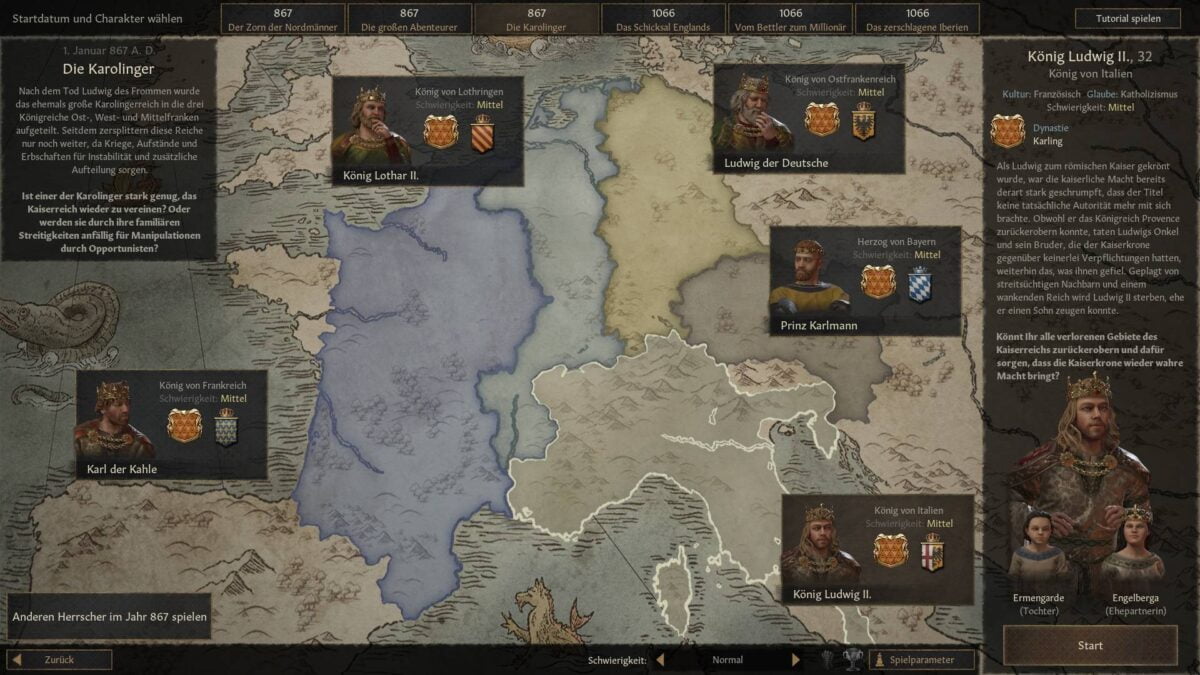
If you click on the button “Play as any Ruler in 876/1066“, you will be shown the selected character’s traits, culture, faith, as well as difficulties such as missing heirs, state of war, debts, and the like. Here you may also select the difficulty of the game (from ‘very easy’ to ‘normal’) and adjust further game parameters.
- If you activate the “Ironman” mode and continue to play the game without altering the default settings, you can try to gain some Steam achievements.
Open the game menu (via the cogwheel button at the bottom right of the screen) and click on the “Switch Character” option, if you want to try out a different ruler in an ongoing singleplayer game. Afterwards, the overview map opens, in which you can pick the desired ruler character.
Crusader Kings 3: Game Start Checklist
When starting a game with a new ruler, you must first familiarize yourself with the basic situation of this character, his family, and the area he controls. The following checklist will focus on the ruler and his heir, his court, and the important vassals until you finally get an overview of the general situation in your realm.
Ruler and Heir
- Is the ruler married?
If not, find one (or several) spouse(s) for your ruler – perhaps one that will even make an alliance possible. Is there an heir? If not, your primary aim should be to conceive a child with your spouse. Use a sway or romance scheme (right-click on the spouse) to increase the opinion values of your husband or wife. If an existing spouse is too old (over 40), infertile, and/or chaste, then divorce would not be a bad idea as there is not much of a chance to get any heirs. - Is an existing heir married?
If not, look for a spouse for your ruler’s heir as well. You will learn more about Marriage Politics and Alliances in later sections of this guide. - Which ability values does the ruler have, and are there strengths and weaknesses?
Choose a lifestyle that matches the character’s skills and education in order to begin collecting lifestyle experience points as soon as possible and to unlock the first benefits. You will learn more about Skills and Lifestyle later on in this guide. - How much Money, Prestige, Piety, and Fame do your ruler possess, and how much is added each month?
In the upper right corner of the overview screen, you can see the current stats of your ruler. Is there a negative figure somewhere? If you lose gold, move the cursor over the figure to find out what may be causing the loss (for example: if a ruler is at war and has troops in the field whose maintenance exceeds his monthly earnings). Loss of Piety and Prestige can usually be tracked by looking at traits and current modifiers in the character window (line below the character image).
You can find more information about how to increase these Resource Values in the respective section.
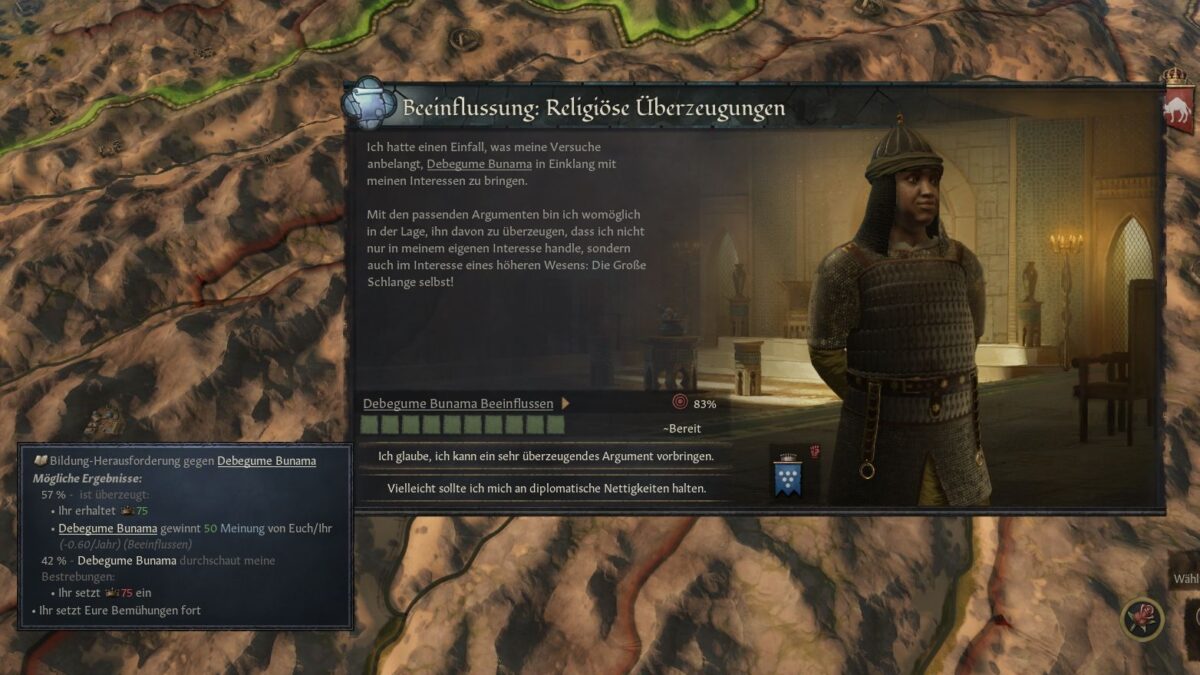
Council, Vassals and Court
- Is the Council (F4) complete and staffed with competent persons?
Empty council positions should always be re-assigned, ideally with council members whose skill value (fitting for their position) is at least 10 or more. You should favor council members who have a positive opinion about you and you should also use your spouse to help you rule. You will learn more about the Council in later sections of this guide. - How is the relationship of the Realm Priest/Court Chaplain to your ruler?
If the opinion score is negative, move the cursor over the bishop’s cap in the lower right corner of the council window of your Realm Priest/Court Chaplain. Should it be noted there that you will be denied decisions and taxes because of a lack of support from the Court Chaplain/Realm Priest, either start a sway scheme or send a gift to improve the opinion values until the opinion values are higher than +1. - Is there a Court Physician?
If not, then use the decision (F8) “Call Physician” to call competent people to the court, among whom you select a suitable candidate. A Court Physician helps in case your ruler or a member of the ruling family falls ill. - What opinions do the mighty vassals have of your ruler?
Open the Realm overview (F1) and scroll through the vassal list. Particularly important are the powerful vassals (marked with a red, clenched fist next to the character portrait). You should try to improve red (negative) opinion values by using a sway scheme. Priority should be given to the powerful vassal with the worst value. If you have enough money in stock, you can start earning points early by sending them gifts. - Do factions exist within your realm?
Open the Factions window (F7) and check if there are currently any vassals or parts of the population that are so dissatisfied with your ruler that they start organizing as a faction. You should give special attention to the leaders and participants of factions when it comes to sway schemes and monetary gifts, in order to increase their opinion as fast as possible and thus cause the factions to dissolve!
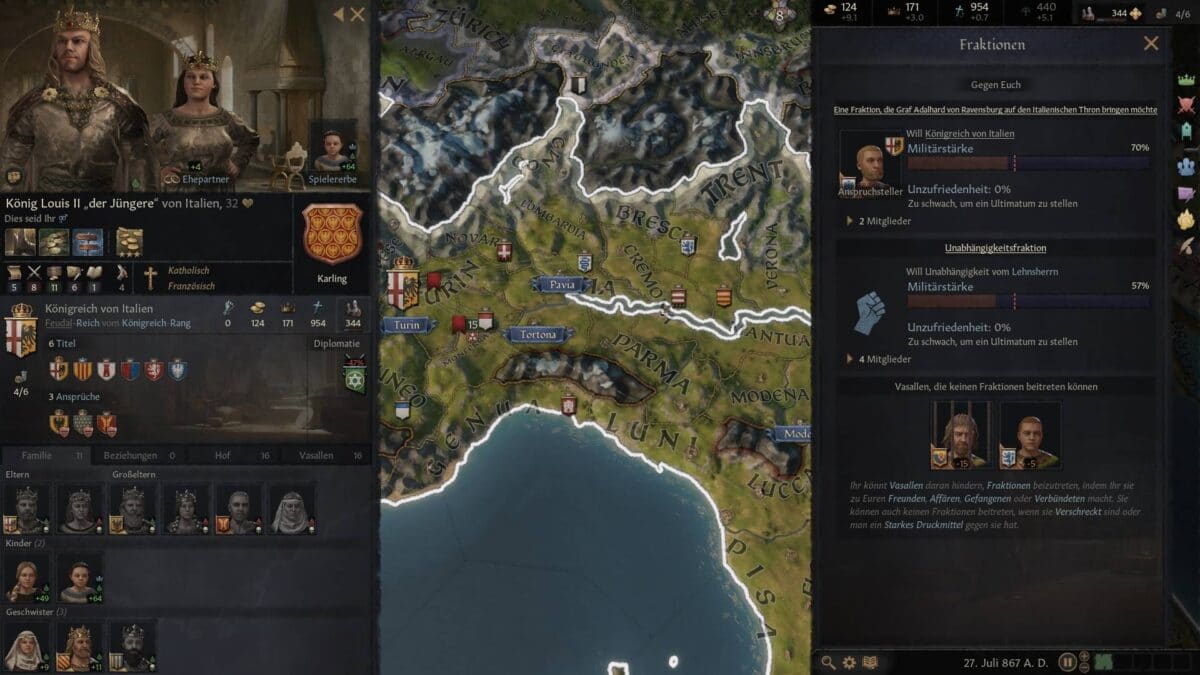
Realm, Religion and Military
- How large is your domain, and are there any penalties for a domain that is too large?
Many rulers with a high-ranking title start with too many directly stewarded counties/titles, which results in significant decreases in the opinion values of the Steward and the vassals. Look around your Court (F5): Courtiers without a title, but with a positive opinion of your ruler and at least ‘bad’ skill values should be given preference when granting surplus titles. Right-click on a courtier and use the option “Grant Title”. - What are the Tenets and Doctrines of your religion?
Open the religion overview (center button with religion icon, right next to your ruler’s portrait at the bottom of the screen) and check how your ruler’s religion views adultery, divorce, marriage, and more. Doctrines marked with “Crime” make a character who doesn’t abide by them and gets caught, a criminal! - What culture do the counties in your realm have, and what religion do the citizens adhere to?
First, check to which culture your ruler belongs (in the ruler overview window) and then examine whether the culture of your counties (in the culture overview map, bottom right in the game window) is a good match – different cultures lower the public opinion in the individual counties and cause unrest! With the councillor task “Promote Culture” performed by your Steward, you can adapt counties with a foreign culture to the culture of your ruler. The same applies to religion: If the people believe in something else than the ruler, that will lead to a decrease of the ruler’s reputation in the popular opinion. Your Court Chaplain/Realm Priest hunts down unbelievers in the the respective county if you give him the task “Convert Faith in County”, and over time he will convert all citizens. Both tasks will be accomplished more efficiently if the values of your council members in Learning (Court Chaplain/Realm Priest) and Stewardship (Steward) are high. - How big is the military?
Open the Military window and see how large your levies are, how many champions you have at your disposal and whether your ruler has Men-at-Arms (who need to be paid even in times of peace). Open the Champion window by clicking on the Champion picture and examine the Prowess of the available champions. Values of 10 and higher should be available. If these are not reached, use the “Invite Champions” decision to call recruitable guests onto your court. More information about Wars can be found in later sections of this guide. - Can you extend your empire?
Take a look around in your counties if you have a small military or a low income of gold. Click on the tab “Domain” in the realm overview (F1). Here you can see the counties that you control directly, where you can build, and whether there are free holdings available. Double-click on the Coat of Arms of the county to centralize the view on the most important settlement. Click on the name of the settlement on the map or the name of the settlement in the Domain list to open the respective overview window. Here you can see available building sites and other important information. If you click on a free building site, it will show you what you can build there, how long it would take to build it, what bonuses the completed building would bring, and how much it would cost. - What other hints does the game give?
To the left of the “Gold” value at the top of the screen is the “Issues” icon. When clicked, it will show you the options that are available to you based on your existing title entitlements, problems at court, and other opportunities.
Gold, Prestige, Piety and Fame
The possibilities of a ruler are determined not only by his attributes but also by acquired resources. His gold supply, as well as the amount of prestige, fame, and piety, offer you more advanced game options, which is why you must make sure that the income of these resources increases steadily.
Gold
Use gold to buy new properties and buildings in your provinces or upgrade them to higher levels with better bonuses. Gold gifts significantly increase the opinion of other characters about your ruler.
Armies at war need to be maintained and the higher quality regiments of warriors need to be paid even in times of peace. Gold also allows you to bring new people with high character values to your court or to pay for decisions such as hunts or feasts.
How to increase your Gold Income
- Higher tax income: Build city holdings or buildings (Forestry, Quarries, Pastoral Lands, Tradeports, Manor Houses, Farms & Fields, Orchards, Tax Offices, Desert Agriculture, Guilds) to increase your counties tax revenue.
- Collect Taxes: Let a council steward with a high stewardship value perform the council task “Collect Taxes” to collect a higher percentage of taxes from your domain.
- Raid your neighbors: If you have the option “Raise All as Raiders” in the military window, you can raid your neighbors and try to rob their treasures. More about this in the section “Warfare and Looting“.
- Increase Stewardship skill: Since taxes generated from your holdings also depend on the Stewardship skill, you should keep it as high as possible or focus on increasing it.
- Asking the Head of Faith for gold: If your ruler has a religion with a Head of Faith who has a good opinion of your ruler, you may very well ask for a subsidy.
- Payment for leverage: If your Spymaster has discovered secrets of your subjects, you can silver this leverage to the respective person with the perk “Golden Obligations” (Stewardship/Avaricious).
- Blackmailing subjects: With the perk “It is MY domain” ( Stewardship/Avaricious) you can get extra gold from a subject by using the decision “Blackmail target”.
- Lifestyle Focus: Use the Stewardship Lifestyle Focus “Wealth Focus” to increase your monthly tax revenue by 10%.
- Lifestyle Path “Avaricious”: Skill all the perks of the Stewardship Lifestyle “Avaricious”, because of the Lifestyle trait “Avaricious” that becomes available at the end of the Lifestyle path and which increases your holdings taxes by 15%.
Prestige
Prestige combines familiarity and social standing of your character. The more prestige a character gains over the course of his life, the more likely he is to advance to the next level of fame, which in turn has a direct effect on the reactions of other rulers and characters. Rulers of tribal societies use prestige to buy buildings for the expansion of their possessions.
Declarations of war cost prestige as well as the enactment of new laws and inheritance laws, the adoption of the feudal way of life or the conversion of your ruler to a local culture, the creation of new titles and the founding of universities and new kingdoms or empires. The higher your fame level, the more knights you can add to your retinue.
Achievable Levels of Fame
| Level | Designation | Effect Secular Opinion | Number of knights |
|---|---|---|---|
| 1 | Established | — | — |
| 2 | Distinguished | +3 | +1 |
| 3 | Illustrious | +5 | +2 |
| 4 | Exalted Among Men | +10 | +3 |
| 5 | The Living Legend | +20 | +4 |
How to Increase your Prestige Income
- More prestige through buildings: Build assembly halls (Tribal Realms) or orchards (Feudal and Clan Realms) for a small monthly prestige bonus.
- Prestige income through innovation: Explore the innovations “Hereditary rule” (Early Middle Ages) and “Heraldry” in the High Middle Ages for five percent more prestige each month and “ermine coats” in the Late Middle Ages for a monthly prestige plus of ten percent.
- Call Hunt: Use the decision “Call Hunt” and pay the required fee to go on a search for particularly rare prey. If the hunt is successful, you will be rewarded with a small prestige bonus.
- Foreign Affairs: Have your Chancellor perform the “Foreign Affairs” council task. Your ruler receives a bonus of Prestige per month depending on his diplomacy value.
- Carry out successful wars and raids: Successful wars and raids earn your ruler Prestige. Try to acquire new lands or loot from your neighbors in any case, if the Casus Belli and the balance of power favor you.
- Making decisions that earn you prestige: During the life of your character, there may be situations where you will be able to make decisions that promise to give you Prestige. Use the appropriate response option to increase your Prestige.
- Lifestyle Focus: The Diplomacy Lifestyle allows you to choose the “Majesty” focus to receive a 1.0 Prestige bonus per month.
- Lifestyle Path “August”: Choose the Diplomacy Lifestyle Path “August” and skill several perks that promise to increase your Prestige: “Inspiring Rule” increases your monthly Prestige by five percent for every powerful vassal in the council, “Firm Hand” increases your monthly Prestige by one percent for every terror, “Praetorian Guard” increases your monthly Prestige by two percent for every knight. If you skill the Lifestyles Path to the end, the trait “August” will earn you an additional 1.0 prestige per month.
- Lifestyle Trait “Gallant”: Follow the Martial Lifestyle tree to the end and unlock the trait “Gallant”, which will add a whopping 20% more Prestige per month.
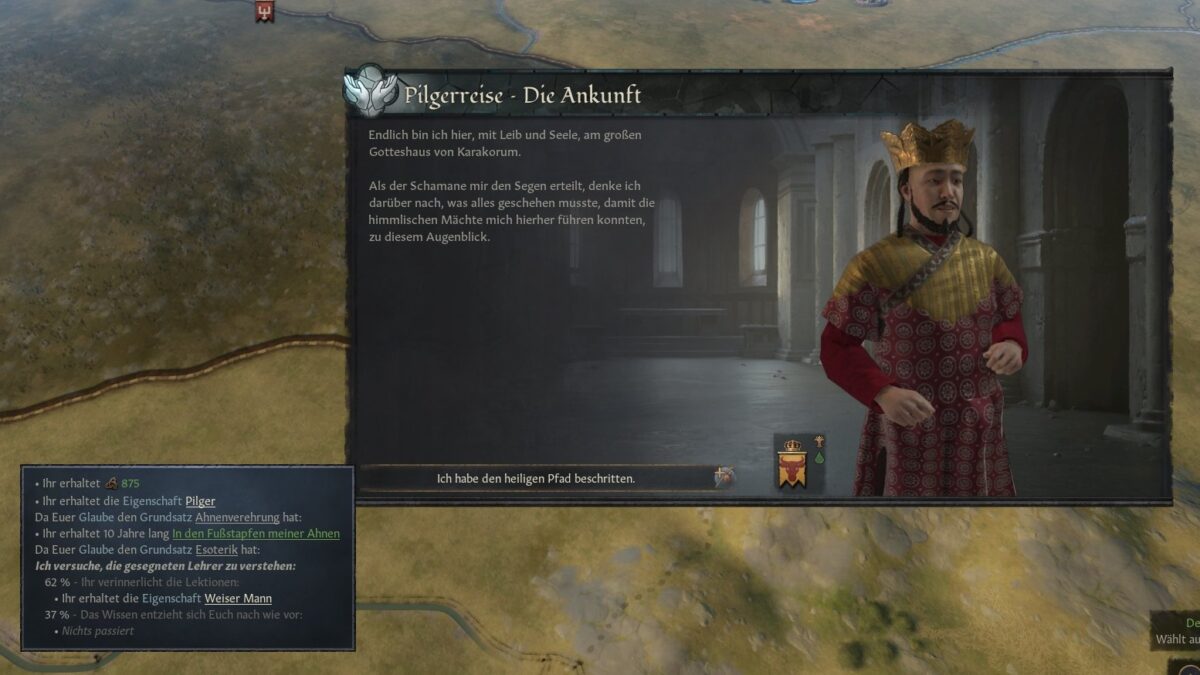
Piety
The piety value of a character indicates how virtuously he acts according to the doctrines of his own faith. For every action he performs in accordance with these doctrines, his piety grows. For example, in a religion where human sacrifices are performed, this can be the capture, imprisonment, and execution of strangers! With piety, you can consecrate the bloodline of your character, found a warrior order, introduce new doctrines and principles in a faith reformation, or found a new kingdom or realm. Some decisions also require a certain amount of piety.
The more devoted a character is, the higher his level of devotion becomes. This directly influences the opinion of the clergy of the faith that the character practices.
Achievable Levels of Devotion
| Level | Level of Devotion | Clergy Opinion |
|---|---|---|
| 1 | Dutiful | — |
| 2 | Faithful | +5 |
| 3 | Devoted Servant | +10 |
| 4 | Paragon of Virtue | +20 |
| 5 | Religious Icon | +30 |
How to increase your income of Piety
- More piety through buildings: Build a temple holding and build a monastery within it. Although it is the only building that can give you a piety bonus, a monastery can be built in each temple holding.
- Piety through Innovations: The early medieval innovation “Reconquista” increases your monthly piety bonus by ten percent, but is only available for cultures from the Iberian Peninsula. The Innovation ” Divine Right” (High Middle Ages) grants all cultures ten percent piety per month.
- Religious relations: Have your Realm Priest/Court Chaplain perform the council task “Religious Relations”. This will increase your monthly piety according to the educational ability value of the Realm Priest / Court Chaplain.
- Choosing decisions that bring piety: From time to time, your character will be confronted with decisions concerning the virtues and sins of his faith. If you make decisions that are virtuous for your faith, an increase in piety is likely.
- Successfully wage a great religious war: If the faction in which your ruler fights in a great religious war wins, abundant amounts of piety will be offered as a reward.
- Go on a Pilgrimage: Let your character travel to one of the holy sites of his faith. The further he travels, the more piety he can receive. However, longer journeys are more expensive (at least 50 gold) and you have no influence on government business during your character’s absence.
- Lifestyle focus: The Learning Lifestyle allows you to take advantage of focus “Theology” and gets you 1.0 piety per month.
- Lifestyle Path “Theologian”: Within the Learning Lifestyle Path “Theologian” you may increase your piety income by one percent per knight by choosing the perk “Prophet”. If you complete the path and your character receives the trait “Theologian”, your monthly piety income will be increased by another twenty percent.
Renown
Your character shares this value with all other members of his dynasty. Renown is similar to Prestige in effect and increases the level of splendor of the dynasty as a whole. The number of living members, the number of rulers, and the number of spouses of other rulers are included in the renown value. If a ruler has a feudal lord of the same dynasty, he does not add any renown.
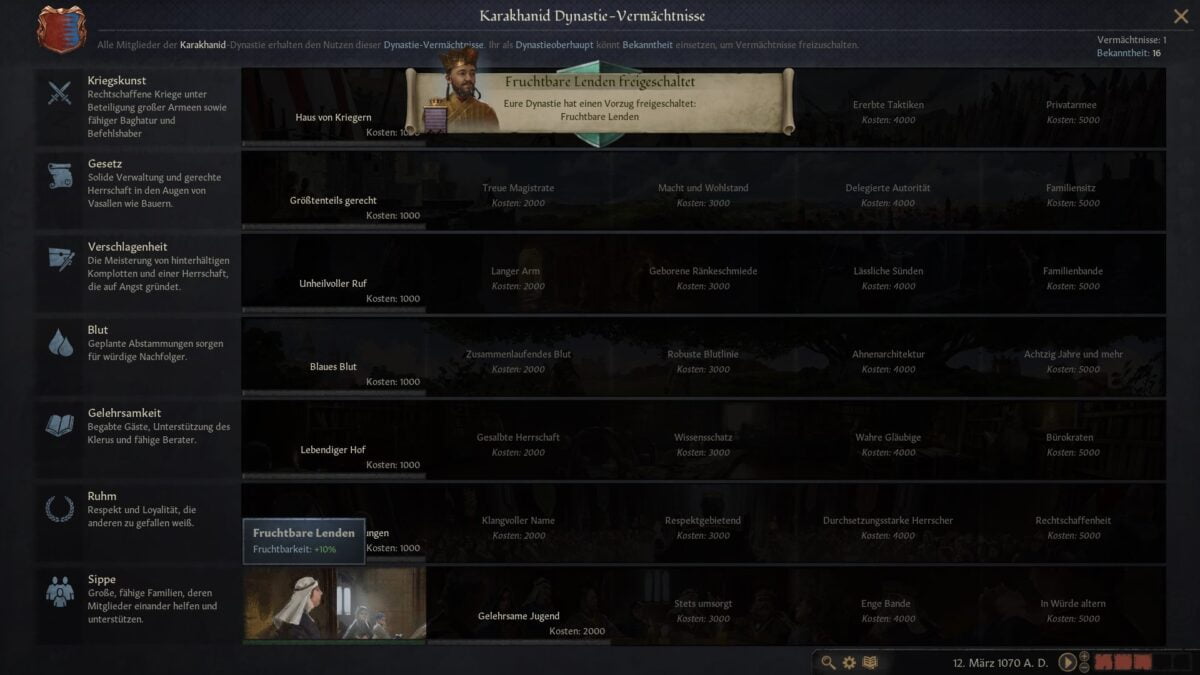
If a dynasty is spread across different realms, it generates more renown than a dynasty that is limited to a single realm. With Renown, you unlock Dynasty Legacies that apply not only to your ruler but to all members of the dynasty equally.
Achievable Levels of Splendor
| Level | Name | Splendor Birth Bonus for children | Splendor Bonus for marrying people | Opinion bonus for long reign |
|---|---|---|---|---|
| 1 | Base Origins | 0 | -100 | +5 |
| 2 | Obscure | 100 | 0 | +10 |
| 3 | Insignificant | 200 | +100 | +15 |
| 4 | Noteworthy | 300 | +200 | +20 |
| 5 | Reputable | 400 | +300 | +25 |
| 6 | Well-known | 500 | +400 | +30 |
| 7 | Significant | 600 | +500 | +35 |
| 8 | Famous | 700 | +600 | +40 |
| 9 | Glorious | 800 | +700 | +45 |
| 10 | Fabled | 900 | +800 | +50 |
| 11 | Legendary | 1000 | +900 | +55 |
Dynasty Legacies
With the Renown earned by all dynasty members, you unlock dynasty-spanning perks that you select from seven different categories. If your character is not the Dynasty Head, and if a Renown Limit that is necessary to unlock a new legacy is exceeded, the Dynasty Head, who is controlled by the game, will choose a suitable legacy.
Warfare
| Renown Costs | Perk | Bonus |
|---|---|---|
| 1000 | House of Warriors | +2 Prowess, +15 Knight Effectiveness |
| 2000 | Generational Belligerence | -20% Casus Belli Cost |
| 3000 | Squire Traditions | +10% Monthly Martial Lifestyle Experience |
| 4000 | Inherited Tactics | +5 Advantage |
| 5000 | Private Army | +1 Max number of Men-at-Arms Regiments Can recruit House Guard for Men-at-Arms |
Law
| Renown costs | Perk | Bonus |
|---|---|---|
| 1000 | Mostly Fair | +5 Popular Opinion |
| 2000 | Faithful Magistrates | +0.2 Monthly Control Growth |
| 3000 | Power and Prosperity | +10% Monthly Stewardship Lifestyle Experience |
| 4000 | Delegated Authority | +5 Powerful Vassal Opinion |
| 5000 | Home Estates | +1 Domain Limit |
Guile
| Renown Costs | Perk | Bonus |
|---|---|---|
| 1000 | Ominous Reputation | +20% Dread Gain |
| 2000 | Long Reach | +10 Hostile Scheme Success Chance |
| 3000 | Natural Schemers | +10% Monthly Intrigue Lifestyle Experience |
| 4000 | Venial | -0.05 Monthly Tyranny |
| 5000 | Family Connections | High chance to prevent the Murder of a dynasty member |
Blood
| Renown Costs | Perk | Bonus |
|---|---|---|
| 1000 | Noble Veins | +30% Chance to inherit good congenital traits +30% Chance of new good congenital traits |
| 2000 | Convergent Blood | +30% Chance to reinforce congenital traits |
| 3000 | Resilient Bloodline | -30% Chance to inherit bad congenital traits -30% Chance of new bad congenital traits |
| 4000 | Architected Ancestry | Select a congenital trait to become more common within your dynasty. |
| 5000 | Octogenarians | +5 (Years) Life Expectancy |
Erudition
| Renown Costs | Perk | Bonus |
|---|---|---|
| 1000 | Vibrant Court | +10 Courtier and Guest Opinion Better Guests are attracted |
| 2000 | Ordained Rulership | +10% Piety per month |
| 3000 | Treasured Knowledge | +10% Monthly Learning Lifestyle Experience |
| 4000 | True Believers | +5 Clergy Opinion |
| 5000 | Bureaucrats | +10% Effectiveness of Councilor Tasks |
Glory
| Renown Cost | Perk | Bonus |
|---|---|---|
| 1000 | Desireable Match | +30 Marriage Acceptance |
| 2000 | Renowed Name | +10% Prestige per month |
| 3000 | Earning Respect | +10% Monthly Diplomacy Lifestyle Experience |
| 4000 | Assertive Rulers | -20% Short Reign Duration |
| 5000 | Righteousness | +10 General Opinion |
Kin
| Bekanntheits-Kosten | Vorteil | Bonus |
|---|---|---|
| 1000 | Bounteous Loins | +10% Fertility |
| 2000 | Studious | Dynasty members get better education |
| 3000 | Constant Care | +10 Spouse Opinion Fewer pregnancy complications |
| 4000 | Close Bonds | +5 Dynasty Opinion +30% Personal Scheme Success on Dynasty members |
| 5000 | Graceful Aging | Increases skills in old age Prowess doesn’t decrease with age |
Council & Council Tasks in Crusader Kings 3
Each ruler, regardless of the size of the controlled territory, is supported by a council consisting of six people. You can assign five of them to three different tasks, each in accordance with their job, while the sixth person is the spouse of your played character, who assists him or her in the affairs of dominion.
Overview of the Councillor Tasks
- Spouse: The spouse of your ruler assists him in the ruling business.
- Realm Priest/Court Chaplain (Learning): The Realm Priest is responsible for all religious and spiritual affairs of the realm.
- Chancellor (Diplomacy): The Chancellor devotes himself to diplomatic efforts within and outside the realm.
- Steward (Stewardship): The Steward is responsible for the Stewardship of the domain in terms of taxation, culture, and development.
- Marshal (Martial): Your Marshal is both the commander-in-chief of your troops and also responsible for general military duties.
- Spymaster (Intrigue): The Spymaster takes care of all courtly intrigues such as schemes and general espionage.
Always make sure that your ruler is supported by a complete and competent council, so that he can manage the realm effectively! Council members with low values in the skill that underlies their field of activity, significantly increase the chance of failure. You can detect this by looking at the mouseover information window, where you can see negative “Possible Side Effects” highlighted in red. Higher skill values (of the council members) result in more green marked and thus advantageous possible side effects.
- Lifestyle perks significantly enhance the efficiency of the tasks performed by members of the council. You should unlock available perks; if possible within the Lifestyle chosen for your ruler! You will learn more about Lifestyles and Perks later on in this guide.
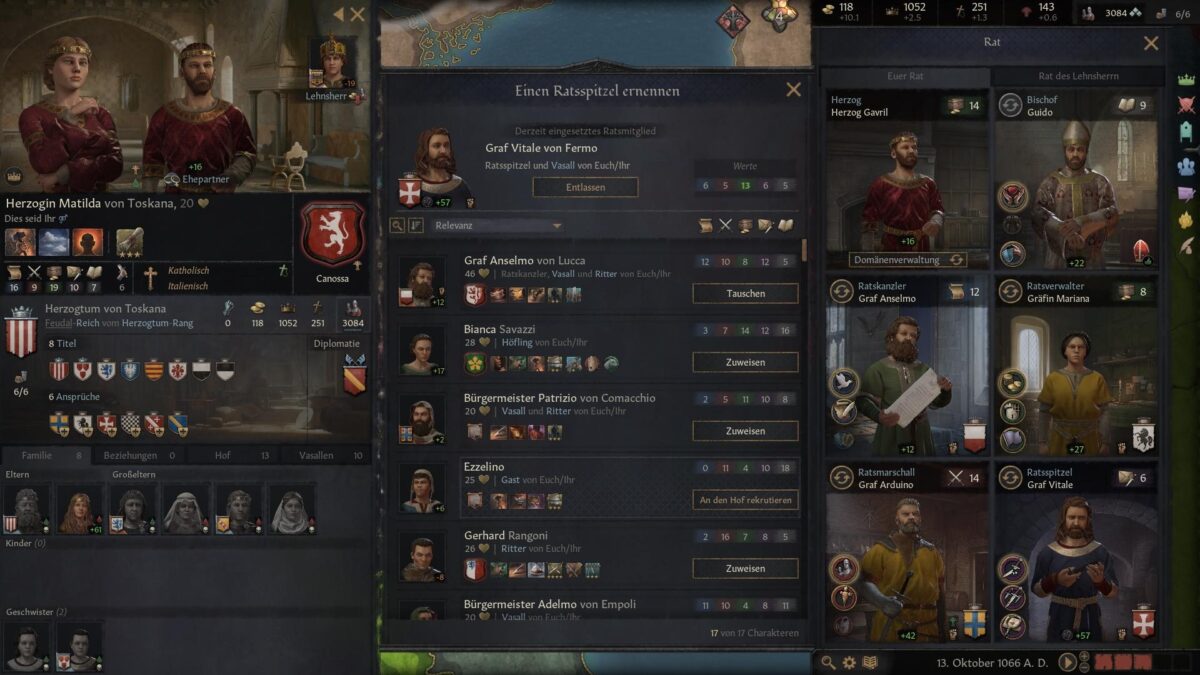
Possible Problems encountered when compiling the Council
- No persons with sufficiently high values present at the court: Use the tab “Court” (F5) and have a look among the guests. Particularly capable candidates for certain posts such as Marshal or similar are specially marked. You can invite them in exchange for a suitable fee and appoint them to your court. Alternatively, you can use the decisions “Invite Knights”, “Invite Claimants” or “Call Physician” to invite random people to your court and look for suitable candidates among them.
- Small selection of possible candidates for the council: There is often a lack lack of choice at small farms in particular. Find unmarried courtiers and arrange a marriage for them with spouses who have sufficiently high skill levels. As soon as the spouse has arrived at court, you can place him/her in the appropriate position. Attention: Female courtiers will most likely leave your court in case of marriage.
- Incompetent but powerful vassals want to become council members: If you have powerful vassals who are eager to become a council member, you should always fulfill such wishes whenever possible – unless the vassal’s stats are so bad, that you are likely to receive failed councillor taks constanly. Dissatisfied, powerful vassals will brin you a -20 Opinion deduction if you do not accept them into the council. So you must either influence them with personal schemes, appease them with monetary gifts, or let the current Chancellor create a good atmosphere (with the task “Domestic Affairs”). The Perk “Likeable” (Stewardship/Administrator) increases the opinion of direct vassals about the ruler by an additional ten points. Alternatively, vassals can be intimidated by focusing on “Intimidation” (Intrigue/Torturer) to increase dread to such an extent that they do not dare to rebel against you, even if they are dissatisfied.
- Too many powerful vassals requesting council posts, but there are not enough available posts: The larger the realm becomes, the more likely it is that the number of powerful vassals will exceed the number of available posts. The only way to help, is to use the most competent vassals and to appease the others with personal schemes and/or monetary gifts. You can’t satisfy everyone anyway, so you might as well give preference to efficiency.
The Council Tasks in Detail
Spouse
Select one of the five areas for the spouse of your ruler: Court Politics (Diplomacy), Chivalry (Martial), Manage Domain (Stewardship), Court Intrigue (Intrigue), or Patronage (Learning) in the “Assist Ruler” drop-down menu. A part of your spouse’s skill value is added to your ruler’s skill value, thus granting a small to significant skill value bonus. Smaller events of your own with influence on the realm can be triggered based on the selected focus.
Realm Priest / Court Chaplain
In the case of a theocratic faith, all temple holdings of your realm are automatically leased to the realm priest. If the realm priest has a negative opinion of your ruler, the ruler will not receive any troops or taxes. The higher the opinion, the more troops, and taxes the ruler receives. Only in faith with lay priests do you control temple holdings (and their advantages) directly. The name of the clerical council member is then Court Chaplain.
- The opinion of the Realm Priest about your ruler is additionally increased by +50 through the perk “Church and State” (Learning/Theologian).
Tasks of the Realm Priest:
- Religious Relations: This task increases the monthly Piety growth of the ruler, and, when successfully performed, the opinion of the vassals about the ruler’s character also increases.
Is strengthened by the perk “Clerical Justifications”(Learning/Theologian). - Convert Faith in County: If there are counties within your domain that do not adhere to the prevailing faith, you can place your Realm Priest on the map in said area to begin the conversion of the county.
Is strengthened by the perk “Zealous Proselytizer” (Learning/Theologian). - Fabricate Claim on County: Your Realm Priest tries to fabricate a claim on another county. If this succeeds, you will receive a “Dropped Claim”, which gives you a Casus Belli and thus an opportunity for a war of conquest.
Is strengthened by the perk “Accomplished Forger” (Diplomacy/Diplomat).
Chancellor
As the diplomatic backbone, the Chancellor plays a crucial role in strengthening relations between the ruler character and his vassals. He complements your opportunities for influence through personal schemes that have a wider reach.
Tasks of the Chancellor:
- Foreign Affairs: With this task you will increase your monthly prestige gain. In addition, the opinions (about your ruler) of vassals living outside of the realm are increased a little bit. It is also possible to shorten truces.
Is strengthened by the perk “Adaptive Traditions” (Diplomacy/Diplomat). - Domestic Affairs: This will slowly but steadily increase the vassals’ opinion of you. This option is especially important when a new character has just begun ruling but does not have a positive relationship with the vassals. Chancellors can also use this option to end internal wars.
Is strengthened by the perk “Chains of Loyalty” (Stewardship/Administrator). - Integrate Title: This option is only available to your Chancellor if you rule a kingdom or empire. This way, you support the consolidation of the realm if foreign titles are to be added after a conquest.
Steward
“Money is the key to success” applies in particular to the work of the Steward: The work of the Steward is indispensable for the development and expansion of your realm. Make sure you use a competent Steward – after all, you can always use more gold, even if you don’t invest it into the expansion of your holdings!
Tasks of the Steward:
- Collect Taxes: With this action, your Steward will (at a percentage corresponding to his stewardship value) collect higher taxes in your realm – or, if the base value is bad, cause corruption in the community!
Is strengthened by the perk “Tax Man” (Stewardship/Architect). - Increase Development in County: Reduces the construction time of buildings and holdings and grants a developmental growth bonus based on the stewardship value of the Steward.
Is strengthened by the perk “Planned Cultivation” (Learning/Scholar). - Promote Culture: If counties belong to a culture that differs from that of the ruler, the Steward either encourages the transition to the ruler’s culture or reduces the cultural influences exerted by the culture of the feudal lord.
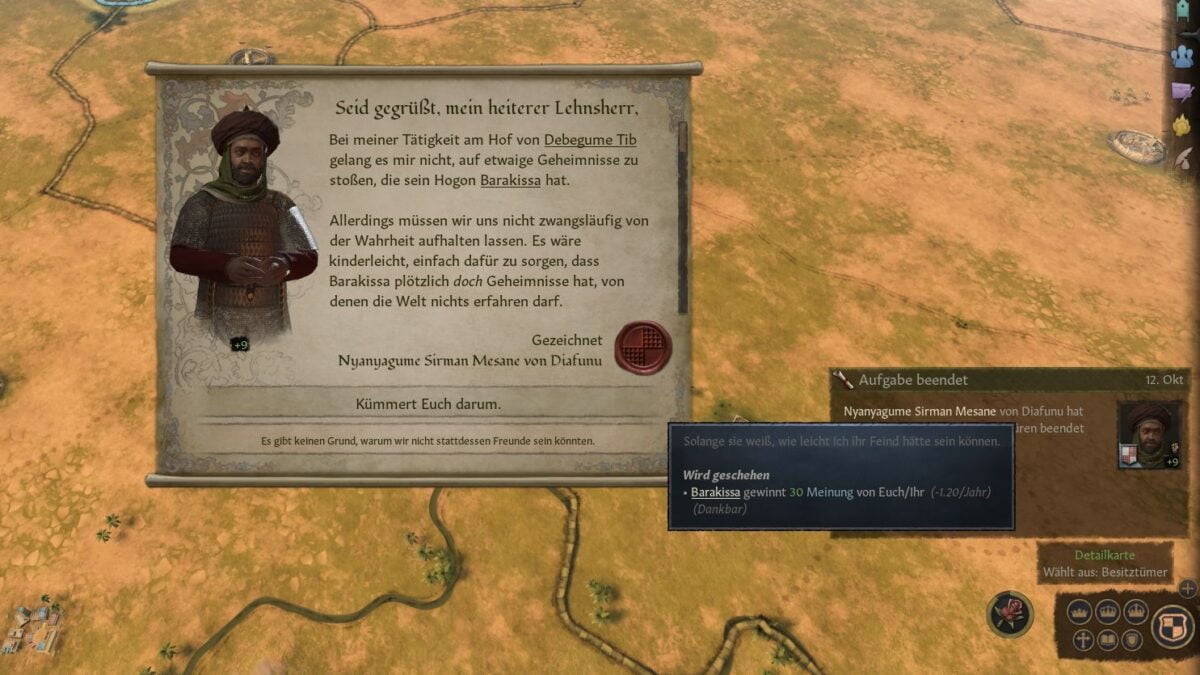
Marshal
Your Marshal makes sure that the influx of soldiers is not cut off and he also trains your Commanders. Without a Marshal with a Martial value of ten or more, your realm’s defense is weakened! Especially when it comes to training Commanders, you should be extremely careful when dealing with an incompetent Marshal, because failures can lead to the injury, mutilation or even death of Commanders.
Tasks of the Marshal:
- Organize Levies: When used successfully it increases your troops’ deployment size, garrison size and reinforcement rate.
- Train Commanders: With this task the Marshal dedicates himself to the training of the Commanders (Knights, Champions, and so on). If he is successful, the trained Commander receives either +1 Martial Skill, +1 Combat Skill or a Commanding Ability.
- Increase Control in County: Once you have conquered new territories, you must first bring them under control in order to be able to obtain taxes and levy from a war-ravaged country. The Marshal placed in that area on the map provides steadily increasing control of said area.
Is strengthened by the perk “Strict Organization” (Martial/Overseer).
Spymaster
You can hardly afford to have a Spymaster who holds a negative opinion: With his ability to control schemes and other espionage activities, he can easily camouflage his own hostile actions against you and at the same time become a valuable agent for schemes. Make sure that the council spy at least has green opinion values regarding your ruler.
Tasks of the Spymaster:
- Disrupt Schemes: With this action, the Spymaster increases the resistance against hostile schemes and also gets a chance to detect hostile schemes (based on his Intrigue Skill value).
Is strengthened by the perk “Court of Shadows” (Intrigue/Schemer). - Support Schemes: If you have hostile schemes in the works yourself, your Spymaster will actively support their advancement. The higher your Spymaster´s intrigue Skill value is, the more significant the advancement bonus will be.
- Find Secrets: Place your Spymaster on the map within the territory of the realm to assign him the place where he is to rummage through the dirty laundry of others, so that he can find some leverage against vassals or other courtiers. If you succeed, you will receive a weak Hook, with which you can force the person in question to decide in your favor.
Is strengthened by the perk “Digging for Dirt” (Intrigue/Schemer).
Expansion of the Realm, Culture, Innovations & all Buildings
Without a functioning realm, your ruler will be weakened: New buildings will not only strengthen the defense of your realm. You can also raise more and different troops for battle, generate higher tax revenues, gain more increases of piety as well as development and prestige, and also improve the abilities of your soldiers across the realm. It is therefore worthwhile to invest your gold regularly into new buildings and to establish new holdings in undeveloped regions.
These Government Forms exist in Crusader Kings 3
- Tribal Realm (tribalistic)
Tribal kingdoms can only develop to a limited extent and cannot establish any other holdings apart from a Tribal Hold in a county. They can only discover the innovations of the tribal epoch and cannot change their succession laws. In a tribal realm, rulers can pay prestige instead of gold for the expansion of buildings and the hiring of Men-at-Arms, and tribal realms also have access to more Casus Belli than feudal realms. Non-tribal armies suffer a Supply Limit penalty in hostile tribal realms. - Feudal Realm
In a feudal realm, a liege grants land to vassals, which they can govern independently, while he receives levies and taxes in return. The amount of the payments and soldiers is regulated by the Feudal Contract between the liege and the vassal, and can be – depending on the acquired innovations – extended. - Clan Realm
As in feudal realms, there is a Liege-Vassal relationship that regulates the ruling in clan realms. Here, however, the opinion of the vassals about their liege decides how many soldiers and taxes they are willing to give. With the Crown Authority, however, a liege can increase the basic amount of levies and taxes he is entitled to.
Open the Realm Overview (F2) and select the “Domain” tab to see all counties directly controlled by you. Next to the name of the county, the current Development value and the increase of control of the county is shown. Next to the county’s holding (usually a castle), the taxes and armies that you have received are displayed. Next to it you can see how many new holdings (castles, towns, temples) can still be built on free spots in the county. Each new holding costs 600 gold.
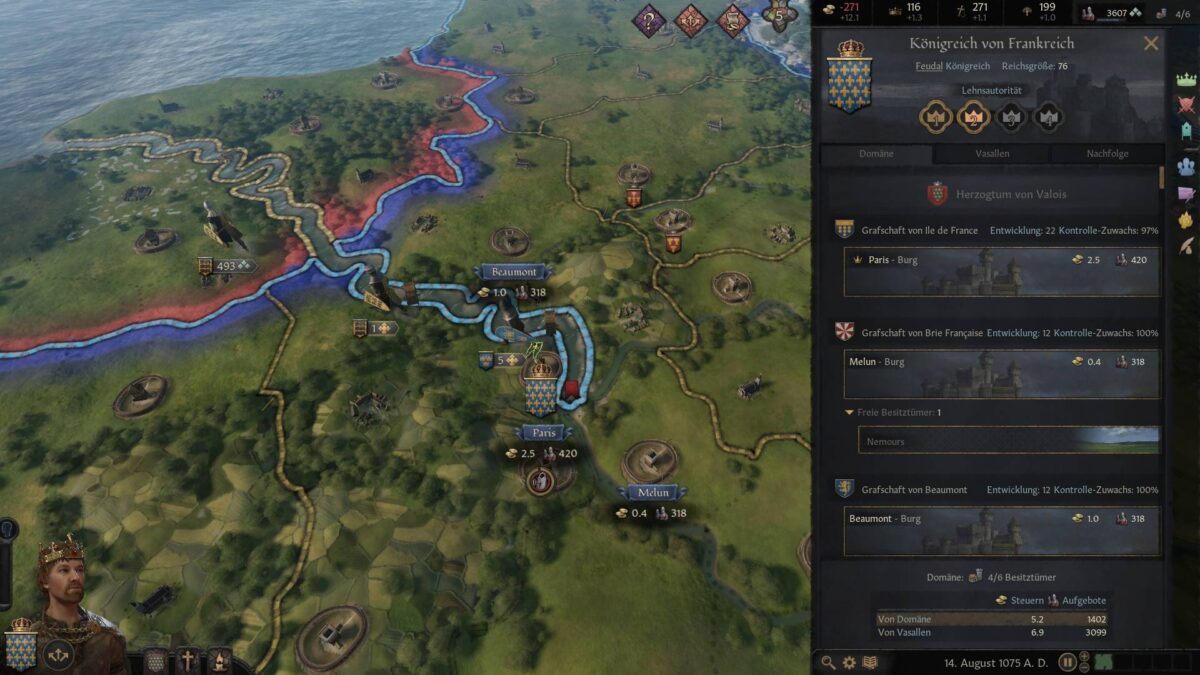
Each holding contains up to four building slots where you can erect various buildings. The county territory also determines the type of available buildings. Their bonuses affect the holdings or the county. Soldier bonuses from military buildings like Wooden Barracks are valid throughout the realm.
Realm Capitals (where rulers, for example dukes and their court reside) get up to two additional special building slots, where you can erect princely buildings. Their bonuses affect all holdings of the associated duchy or even the whole realm.
These Holdings can be build on Empty Terrain
- Castle: Castle: Expanded castles improve Fort Level, Levies and Garrison Strength, as well as moderate tax revenues. Defensive fortifications increase the Fort level and the Garrison Strength of the holding.
- City: Expanded cities grant you higher tax revenues, more Levies and higher Garrison strength. Guilds provide your ruler with additional tax revenue and Development Growth for the county.
- Temple: Upgraded temples earn you higher tax revenue, more Levies and increase the Garrison strength. Holy buildings earn your ruler additional Piety.
Among the buildings that can be constructed in Crusader Kings 3, we distinguish between the three characteristic main buildings (Castle, City, Temple) of a holding and the Standard Buildings, Special Buildings, Duchy Buildings and Historical Buildings that can be constructed within the holdings. Which Standard Buildings you can construct within holdings depends on the terrain. For example, you can only build Tradeports along coasts, Quarries in mountainous terrain, and so on.
- If you are not satisfied with the bonuses of the buildings already constructed, replace a building by paying the gold price for the first level of the new building (after clicking the button with the two arrows in the building info window). Any further upgraded stages of the previous building will be lost in the process!
As ruler of a realm, you can not only erect buildings in the directly ruled counties, but also support vassals by constructing new buildings, provided you have enough gold. This is especially worthwhile if you want to strengthen the defense of peripheral areas of your realm or if you run out of room for buildings in your own counties, but whose bonuses are important for the realm.
Bonuses of erected buildings affect the following surroundings:
- Holding: A building bonus only supports all other buildings in the holding where the building was built. In the holdings overview, this includes all other building fields, no matter whether Standard Buildings, Special buildings, Duchy Buildings or Historical Buildings.
- County: The county bonus of a building includes all holdings of the county together with the buildings in which the building was erected.
- Duchy: A duchy-related bonus applies to all holdings of the duchy and subordinate counties and the buildings erected within them.
- Realm: A realm bonus affects all holdings belonging to the realm and all buildings erected in it without exception.
Culture, Development, Innovations
Your possibilities for the expansion of holdings and buildings depend greatly on the cultural development of your realm. The ruler who controls most of the counties of the same culture within your realm is considered the Culture Head. In most cases, this is the player character. As the Culture Head, you decide which innovation should be developed next: Open your Culture window (right of the three buttons next to your ruler’s portrait image, at the bottom left of the screen). Your Culture and Era (Tribal, Early Medieval, High Medieval, Late Medieval) will be displayed here.
Development
Development refers to the already existing local infrastructure coupled with the technological progress of a county. Higher development increases a county’s Levies, possible Taxes and Supply Limit. On the Development map (accessible via the “+” in map mode) you can see on the world map which counties are at which stage of development: The lighter the color, the more developed the county is. Move the mouse pointer over a county to display the Development in the info window.
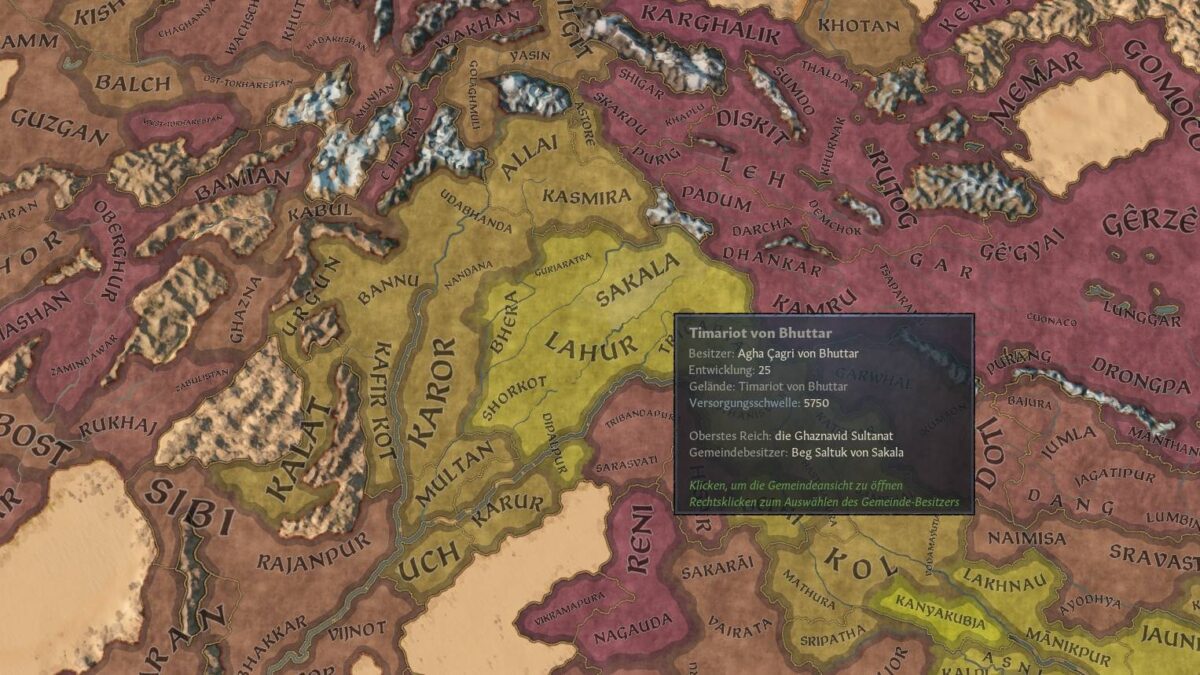
Development Growth determines how long it takes for the county to increase its development level. Once Development Growth reaches 100, the development level increases by 1. The greater the development level of a county is, the slower it progresses. The councillor task “Increase Development in County” is also subject to this law.
By default, counties reach the highest existing development limit at 10 Development, but it can be elevated further through an Innovation in each of the four eras (Public Works, Communal Government, Urbanization, and Renaissance Thought).
Overview of all Cultural Innovations
In each era you can explore a range of military, civil and cultural-regional innovations and unlock them for your culture. Each innovation either offers a bonus or grants new erectable buildings, laws, Casus Bellis, combat techniques or troop units. While tribal realms are limited to the innovations of the tribal era, clan and feudal realms can explore all innovations, as long as their development is sufficient for it. Cultural-regional innovations are only open to the culture mentioned in each case, as is the case with “War Elephants” for cultures in India and Southeast Asia.
The research of new innovations takes place passively over time: Every month there is a chance to get a small progress on every innovation of the current era. If you move the mouse pointer over an Innovation, you can see the research progress to date as well as the percentage chances and the estimated research duration. If you, as the Culture Head, define a Cultural Fascination – an Innovation that is highlighted as a “Fascination” in the lower part of the Culture Window – you will receive a bonus on the development of this Innovation, depending on your character’s base Learning skill value.
- With the perk “Scientific” (Learning/Scholar) you can increase the progress of the Cultural Fascination by 35%.
Tribal Era
Military Innovations
- Mottes: Unlocks all Tribal Era Fortification Buildings
- Barracks: Unlocks all Tribal Era Military Buildings
- Bannus: +15% Levy Reinforcement Rate
- Onager: Can recruit Onager Men-at-Arms
- Mustering Grounds: +2 Size of Men-at-Arms Regiments, +1 Max number of Men-at-Arms Regiments
- Quilted Armor: Can recruit Armored Footmen Men-at-Arms
Civic Innovations:
- Public Works: Counties reach the maximum Existing Development penalty at 20 Development
- Gavelkind: Can enact the Confederate Partition Law
- City Planning: Unlocks the following buildings: Village Center, Shrine, Prayer Halls, Trading Outposts
- Planned Assemblies: Unlocks Fortified Tribal Hold, and you can enact Limited Crown Authority Law
- Currency: +10% Monthly Development Growth
- Crop Rotation: Unlocks all Tribal Era Economic Buildings
- Casus Belli: Can use De Jure County Casus Belli
- Ledger: +1 Domain Limit
Cultural and regional Innovations:
- Culture-specific Man-at-Arms: Depending on the selected culture, this value includes a specific type of Men-at-Arms that uses a combat tactic, typical of that culture; the name of this innovation is based on the name of the Men-at-Arms
- Elephantry (India and South East Asia): Can recruit War Elephants as Men-at-Arms
- Wootz Steel (Deccan India): +2 Heavy Infantry Damage, +2 Heavy Cavalry Damage, +1 Prowess
- Longships (Northern Europe): Unlocks the ability to Raid over seas, if Raiding is allowed, unlocks the ability to sail in Major Rivers, -75% Embarkation Cost%, +25% Naval Speed
- War Camels (Middle East, North Africa or Persia): Can recruit Camel Riders as Men-at-Arms
- West African Canoes (West Africa): Unlocks the ability to Raid over seas if Raiding is allowed, unlocks the ability to sail in Major Rivers, -75% Embarkation Cost, +10% Raid Speed
Early Medieval
Military Innovations
- Battlements: Unlocks all Early Medieval Era Fortification Buildings, unlocks the Fortification Rights Feudal Contract, -5% Men-at-Arms Maintenance
- Buhrs: Unlocks all Early Medieval Era Military Buildings, unlocks the March Feudal Contract, +5% Levy Size
- Horseshoes: +10% Movement Speed
- Mangonels: Can recruit Mangonels Men-at-Arms
- Household Soldiers: +3 Size of Men-at-Arms Regiments, +1 Max number of Men-at-Arms Regiments
- Arched Saddle: Can recruit Armored Horsemen Men-at-Arms
Civic Innovations:
- Hereditary Rule: Can enact the Partition Law, +5% Monthly Prestige
- Communal Government: Counties reach the maximum Existing Development penalty at 35 Development
- Royal Prerogative: Can enact High Crown Authority Law and Absolute Crown Authority Law
- Armillary Sphere: +25% Naval Speed
- Manorialism: Unlocks all Early Medieval Era Economic Buildings. -10% Building Construction Time
- Coinage: Unlocks the Coinage Rights Feudal Contract, +10% Monthly Development Growth
- Chronicle Writing: Can use De Jure Duchy Casus belli, -10% Casus Belli Prestige Cost
- Bailiffs: +1 Domain Limit
Kulturelle und regionale Innovationen:
- Reconquista (Iberia): -10% Casus Belli Cost, +10% Monthly Piety
- Ghilman (Arabia): -15% Men-at-Arms Maintenance
- Stammesherzogtum (Western Germany): +5 Direct Vassal Opinion
High Medieval
Military Innovations:
- Hoardings: Unlocks all High Medieval Era Fortification Buildings
- Castle Baileys: Unlocks all High Medieval Era Military Building, +15% Levy Reinforcement Rate
- Knighthood: +20% Knight Effectiveness, +5 Direct Vassal Opinion
- Trebuchet: Can recruit Trebuchets as Men-at-Arms
- Men-at-Arms: +4 Size of Men-at-Arms Regiments, +1 Max number of Men-at-Arms Regiments
- Advanced Bowmaking: Can recruit Crossbowmen Men-at-Arms, +3 Damage for Archers
Civic Innovations:
- Heraldry: Can enact the High Partition Law and the House Seniority Law, +5% Monthly Prestige
- Divine Right: Can press several Claims in a single war, Unlocks the Palatinate Feudal Contract, +10% Monthly Piety, -10% Short Reign Duration, -20% Title Creation Cost
- Scutage: Unlocks the Scutage Feudal Contract, +5% Republican Vassal Tax Contribution
- Urbanization: Counties reach the maximum Existing Development penalty at 55 Development
- Windmills: Unlocks all High Medieval Era Economic Buildings, +5% Domain Taxes
- Land Grants: +50% Speed on “Fabricate Claim on County” Councillor Task, -10% Casus Belli Prestige Cost
- Guilds: +1 Domain Limit
- Banking: +10% Monthly Development Growth
Cultural and regional Innovations:
- Ostsiedlung (Eastern Germany): +15% “Promote Culture” Councilor Task Speed, +15% Monthly Development Growth
- Muladi (Northern Africa): +10 Different Culture Opinion, +10% Monthly Development Growth
- Seigneurialism (Francia): +5% Domain Taxes
- Peerage (Francia): +5 Direct Vassal Opinion, -10 Fellow Vassal Opinion, +10% Vassal Tax Contribution
Late Medieval
Military Innovations:
- Machicolations: Unlocks all Late Medieval Era Fortification Buildings
- Royal Armory: Unlocks all Late Medieval Era Military Building, +15% Levy Reinforcement Rate
- Sappers: -10% Siege Phase Time
- Bombards: Can recruit Bombards Men-at-Arms
- Standing Armies: +5 Size of Men-at-Arms Regiments, +1 Max number of Men-at-Arms Regiments
- Plate Armor: +3 Heavy Infantry Toughness, +3 Heavy Cavalry Toughness
Civic Innovations:
- Primogeniture: Can enact the Primogeniture Law and the Ultimogeniture Seniority Law
- Noblesse Oblige: +5 Direct Vassal Opinion, +5 Fellow Vassal Opinion
- Ermine Cloaks: +10% Monthly Prestige
- Renaissance Thought: Counties reach the maximum Existing Development penalty at 90 Development
- Cranes: Unlocks all Late Medieval Era Economic Buildings, -15% Building Construction Time
- Rightful Ownership: Can use De Jure Casus Belli: Press multiple Claims of another Character in a single war, -10% Casus Belli Prestige Cost
- Court Officials: +1 Domain Limit
- Promissory Notes: +10% Monthly Development Growth
Cultural and regional Innovations:
- Wierdjiks (Netherlands): +1% Levy Size, +10% Monthly Development Growth, -10% City Holdings and Buildings Construction Time
- Deccan Unity (Deccan-India): +5 Same Faith Opinion
- Condottieri (Italia): -25% Same Culture Mercenary Hire Cost, +100% Number of Mercenary Companies
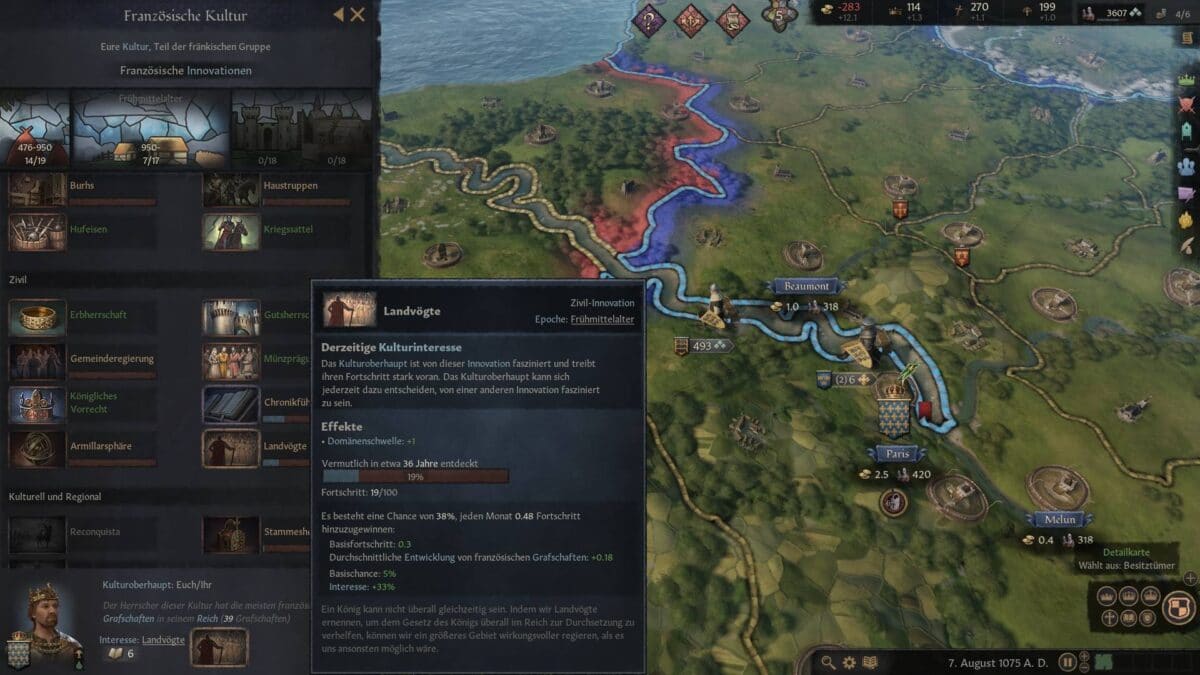
Building Effects and their Meaning
Each building comes with certain bonuses at each expansion level, which affect your holding, your county or even your realm. The following table explains what each possible bonus is about, since not every bonus is easy to understand.
| Bonus | Explanation |
|---|---|
| Screen | The combined Screen of an army reduces the number of casualties after a lost battle. So more shielding for troops helps to preserve your defeated troops. |
| Levies | An army consists of a majority of mostly poorly armed fighters, which become dangerous primarily due to their mass. Each holding generates a certain number of levies, i.e. fighters, for the respective ruler. |
| Levy Reinforcement Rate | Tells you how quickly troops that have fallen in war can be regenerated so that you can send them back into battle. |
| Holding | A holding is the central settlement of a barony or county and may comprise a castle, city or temple as its main building. Depending on the type of holding, the title holder receives taxes and levies. |
| Development | Development raises the technological progress and the local infrastructure of a county, which has a positive effect on the amount of taxes and levies as well as the supply limit. |
| Hostile Raid Time | Extends the duration of a raid performed by enemy armies that loot and pillage a county, thus making it easier for the native defenders to gather forces with which they can intercept looters. |
| Fort Level | Fortified holdings have a Fort level that determines how long a siege of this holding by an attacking army lasts. The higher the Fort Level, the longer the siege is likely to last. High Fort Levels also require the use of siege weapons for an effective siege. |
| Piety | This value indicates how virtuous a character acts in the context of his faith. Monasteries contribute to the piety value of the Liege. |
| Garrison | The garrison of a holding defends it during sieges performed by smaller armies. Since the besieging army must have more troops than the stationed garrison, a large garrison is an advantage for the defender. |
| County | Describes a county (which is usually consisting of several holdings). The county capital is the main holding of a county and is always owned by the ruler who holds the title of the county. |
| Control | Describes how well the government is in control of the population of a county. The higher the control, the higher the taxes and levies received from the county. Control is reduced by sieges, peasant uprisings and exchange of the title holder. |
| Opinion | Increase the opinion value of the designated population group (for example vassals, clergy, population, etc.) about your ruler character by a certain amount. |
| Prestige | Prestige refers equally to the renown and social status of a character. Magnificent buildings increase the prestige of the liege on whose soil they were built. |
| Knights | Knights serve as champions in your ruler’s army and cause additional damage in battle through their power. The more knights your ruler is allowed to have, the higher the generated effect. |
| Knight Effectiveness | At 100 percent effectiveness, your knights fight in accordance with their values whereas at 200 percent, their damage potential increases as much as if their Prowess skill values were doubled. |
| Damage | This effect increases the damage value of the designated unit (for example skirmishers) by a certain amount. |
| Tax/Gold | Each holding generates a certain amount of gold, which you as the ruler receive either directly because you are the liege of the holding, or you receive a portion of the income, which is passed on to you by one of your vassals. |
| Supply Limit | Specifies the maximum number of troops that can be stationed in a county. If the sum of your own and the enemy’s troops exceeds the supply limit, the armies lose the supply they brought with them and suffer a penalty on their advantage in battle. If all supplies are used up, an army is worn down and loses troops through desertion, disease or hunger. |
| Pursuit | This effect increases the number of losses a victorious army causes to the fleeing enemy after the battle (by combining the pursuit value of all troops). |
| Advantage | The (combat) advantage determines that one side causes more damage in battle than the other side and is made up of modifiers such as terrain, martial skill value as well as the commander traits of the army commander. Defender advantages are automatically applied to the defending army at the start of a battle. |
| Toughness | This effect increases the toughness (and thus the amount of damage a soldier can take in battle before it counts as a loss) of the designated unit (for example archer) by a certain amount. |
Overview of Buildings for Tribal Realms
Due to their less advanced technological and cultural accomplishments, tribal realms have access to basic buildings, but they can only be upgraded up to the second expansion level. Unlike clan and feudal empires, tribes are only able to improve the strength of special army units and the size of regular footmen in a rather rudimentary way. Tribal buildings are paid for with gold and prestige.
Capitals
For tribal realms there is only one possible holding. The Tribe serves both as the center of life and the main defense of a county. If a Tribe has already been built within a county, you cannot build another one.
Tribe
| Level | Name | Monthly Tax | Fort Level | Levies | Garrison | Costs Gold | Costs Prestige |
|---|---|---|---|---|---|---|---|
| 1 | Tribal Hold | +0,2 | +1 | +250 | +250 | 200 | 400 |
| 2 | Fortified Tribal Hold | +0,5 | +2 | +400 | +500 | 220 | 400 |
Standard Buildings
Due to their limited potential for development, tribes only have access to four types of buildings, which can only be improved up to the second expansion level. If a tribal realm develops further, these are transformed into their feudalistic equivalents.
War Camps
| Level | Name | Holding Effects | Realm Effects | Costs Gold | Costs Prestige |
|---|---|---|---|---|---|
| 1 | Sparring Grounds | +150 Levies | +1 Number of Knights +10% Knight Effectiveness +2 Armored Footmen Damage +1 Armored Footmen Toughness +2 Skirmisher Damage +1 Skirmisher Toughness | 75 | 200 |
| 2 | Warrior Lodges | +275 Levies | +2 Number of Knights +20% Knight Effectiveness +4 Armored Footmen Damage +3 Armored Footmen Toughness +4 Skirmisher Damage +2 Skirmisher Toughness | 100 | 300 |
Markets
| Stufe | Name | Monthly Tax | Supply Limit | Costs Gold | Costs Prestige |
|---|---|---|---|---|---|
| 1 | Trading Outposts | +0,4 | +500 | 75 | 200 |
| 2 | Market Villages | +0,7 | +1000 | 100 | 300 |
Palisades
| Level | Name | Holding Effects | Realm Effects | Costs Gold | Costs Prestige |
|---|---|---|---|---|---|
| 1 | Simple Palisade | +2 Defender Advantage +1 Fort Level +100 Levies +150 Garrison | +2 Spearmen Damage +1 Spearmen Toughness +2 Archer Damage +1 Archer Toughness | 75 | 200 |
| 2 | Walls & Ditches | +4 Defender Advantage +2 Fort Level +175 Levies +300 Garrison | +4 Spearmen Damage +2 Spearmen Toughness +4 Archer Damage +2 Archer Toughness | 100 | 300 |
Gathering Halls
| Level | Name | Holding Effects | County Effect | Realm Effect | Costs Gold | Costs Prestige |
|---|---|---|---|---|---|---|
| 1 | Longhouses | +100 Levies | +0.2 Monthly Control | +0.2 Monthly Prestige | 75 | 200 |
| 2 | Grand Halls | +175 Levies | +0.4 Monthly Control | +0.4 Monthly Control | 100 | 300 |
Overview of Buildings for Clan and Feudal Realms
Clan and Feudal Realms are more advanced than tribal empires, and their technological achievements give you a wider range of buildings with up to eight levels of expansion, which you can use to increase tax revenues, the strength and stamina of your army types, and the defense of Fortresses and Holdings. Buildings of Clan and Feudal Realms are paid for exclusively with gold.
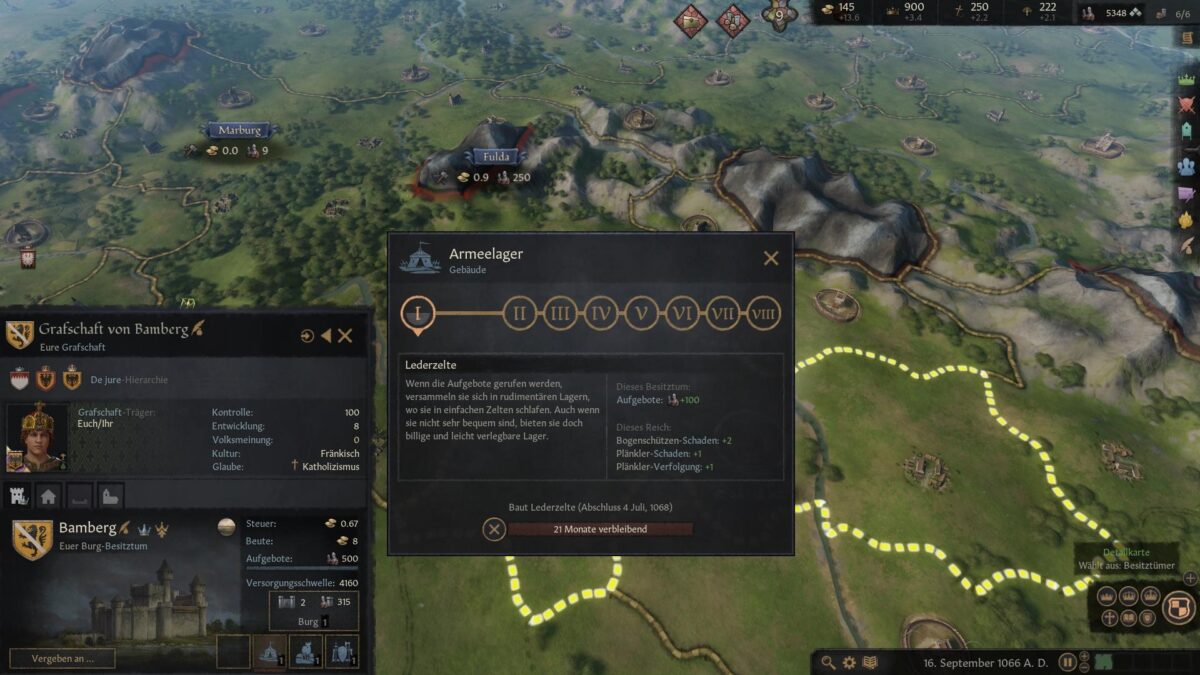
Capitals
The three Capital buildings have four levels of expansion, of which the availability is closely linked to your cultural progress. If innovations are still missing, this will be indicated in the upgrade window of the building. Capitals are the most expensive buildings to upgrade, but they also bring the highest effects. Each expansion level of a capital takes five years in total.
Castle Holding
| Level | Name | Monthly Tax | Fort Level | Levies | Garrison | Costs |
|---|---|---|---|---|---|---|
| 1 | Motte | +0,4 | +1 | +175 | +250 | 600 |
| 2 | Keep | +0,7 | +4 | +325 | +750 | 800 |
| 3 | Concentric Castle | +1,0 | +7 | +475 | +1250 | 1000 |
| 4 | Fortress | +1,3 | +10 | +625 | +1750 | 1200 |
City Holding
| Level | Name | Monthly Tax | Levies | Garrison | Costs |
|---|---|---|---|---|---|
| 1 | Village Center | +0,8 | +75 | +150 | 600 |
| 2 | Large City | +1,4 | +125 | +300 | 500 |
| 3 | City Center | +2,0 | +175 | +450 | 500 |
| 4 | Bustling Metropolis | +2,6 | +225 | +1050 | 500 |
Temple Holding
| Levels | Name | Monthly Tax | Levies | Garrison | Costs |
|---|---|---|---|---|---|
| 1 | Shrine | +0.5 | +125 | +150 | 600 |
| 2 | Temple Grounds | +0,9 | +225 | +450 | 500 |
| 3 | House of Worship | +1,3 | +325 | +750 | 500 |
| 4 | Grand Temple | +1,7 | +425 | +1050 | 500 |
Standard Buildings
Standard buildings form the basis for higher tax revenues, larger troop contingents and a generally better protection of your holdings. This type of building can be erected in any type of holding, provided the terrain is suited for it. For example, the Pastoral Lands building type cannot be built in mountainous and desert terrain, while Camelries are impossible outside of the desert. To see which buildings are available to you, click on an empty building field in the holding overview.
Armeelager
| Level | Name | Holding Effects | County Effects | Realm Effects | Costs |
|---|---|---|---|---|---|
| 1 | Hide Tents | +100 Levies | — | +2 Archer Damage +1 Skirmisher Damage +1 Skirmisher Pursuit | 100 |
| 2 | Camp Cooks | +175 Levies | +200 Supply Limit | +3 Archer Damage +1 Archer Toughness +2 Skirmisher Damage +1 Skirmisher Toughness +2 Skirmisher Pursuit | 150 |
| 3 | Training Fields | +250 Levies | +200 Supply Limit | +4 Archer Damage +1 Archer Toughness +3 Skirmisher Damage +1 Skirmisher Toughness +3 Skirmisher Pursuit | 200 |
| 4 | Watchposts | +325 Levies | +200 Supply Limit +5% Monthly Control Factor | +5 Archer Damage +2 Archer Toughness +4 Skirmisher Damage +2 Skirmisher Toughness +4 Skirmisher Pursuit | 250 |
| 5 | Camp Smiths | +400 Levies | +200 Supply Limit +5% Monthly Control Factor | +6 Archer Damage +2 Archer Toughness +1 Light Cavalry Toughness +5 Skirmisher Damage +2 Skirmisher Toughness +5 Skirmisher Pursuit | 300 |
| 6 | Mustering Halls | +5% Levy Reinforcement Rate +475 Levies | +200 Supply Limit +5% Monthly Control Factor | +7 Archer Damage +3 Archer Toughness +1 Light Cavalry Toughness +6 Skirmisher Damage +3 Skirmisher Toughness +6 Skirmisher Pursuit | 350 |
| 7 | Militia Barracks | +5% Levy Reinforcement Rate +550 Levies | +200 Supply Limit +5% Monthly Control Factor | +8 Archer Damage +3 Archer Toughness +1 Light Cavalry Toughness +7 Skirmisher Damage +3 Skirmisher Toughness +7 Skirmisher Pursuit | 400 |
| 8 | Levying Squares | +5% Levy Reinforcement Rate +625 Levies | +200 Supply Limit +5% Monthly Control Factor | +1 Heavy Infantry Toughness +1 Spearmen Toughness +9 Archer Damage +4 Archer Toughness +1 Light Cavalry Toughness +8 Skirmisher Damage +4 Skirmisher Toughness +8 Skirmisher Pursuit | 450 |
Outposts
| Level | Name | Holding Effects | County Effects | Realm Effects | Costs |
|---|---|---|---|---|---|
| 1 | Lookout Towers | +2 Defender Advantage +50 Levies | — | — | 100 |
| 2 | Military Outposts | +4 Defender Advantage +75 Levies | +0.1 Monthly Control | — | 150 |
| 3 | Hidden Weapons Caches | +6 Defender Advantage +100 Levies | +0,1 Monthly Control | +1 Skirmisher Damage | 200 |
| 4 | Palisade Outposts | +8 Defender Advantage +125 Levies | +0.1 Monthly Control | +1 Skirmisher Damage +1 Skirmisher Pursuit | 250 |
| 5 | Levying Posts | +10 Defender Advantage +150 Levies | +5% Garrison Size +0.1 Monthly Control | +1 Skirmisher Damage +1 Skirmisher Pursuit | 300 |
| 6 | Scouting Stations | +12 Defender Advantage +175 Levies | +5% Garrison Size +0.1 Monthly Control | +2 Archer Damage +1 Skirmisher Damage +1 Skirmisher Pursuit | 350 |
| 7 | Scouting Stations | +14 Defender Advantage +200 Levies | +5% Garrison Size +0.1 Monthly Control | +2 Archer Damage +1 Skirmisher Damage +1 Skirmisher Toughness +1 Skirmisher Pursuit +1 Skirmisher Screen | 400 |
| 8 | Fortified Outposts | +16 Defender Advantage +225 Levies | +5% Garrison Size +0.1 Monthly Control +15% Monthly Control Factor | +2 Archer Damage +1 Skirmisher Damage +1 Skirmisher Toughness +1 Skirmisher Pursuit +1 Skirmisher Screen | 450 |
Elephantry
| Level | Name | Holding Effects | County Effects | Realm Effects | Costs |
|---|---|---|---|---|---|
| 1 | Elephant Pens | +0.2 Monthly Tax -2% Building Construction Time | — | +1 Number of Knights +2% Knight Effectiveness +2 Heavy Cavalry Damage | 150 |
| 2 | Elephant Traps | +0.4 Monthly Tax -5% Building Construction Time | — | +1 Number of Knights +4% Knight Effectiveness +4 Heavy Cavalry Damage | 225 |
| 3 | Elephant Training Grounds | +0.5 Monthly Tax -7% Building Construction Time | — | +2 Number of Knights +6% Knight Effectiveness +6 Heavy Cavalry Damage +4 Heavy Cavalry Toughness | 300 |
| 4 | Elephant Riding Grounds | +0.7 Monthly Tax -10% Building Construction Time | -2% Building Construction Gold Cost | +2 Number of Knights +8% Knight Effectiveness +8 Heavy Cavalry Damage +4 Heavy Cavalry Toughness | 375 |
| 5 | Overseer’s Offices | +0.8 Monthly Tax -12% Building Construction Time | -2% Building Construction Gold Cost | +3 Number of Knights +10% Knight Effectiveness +10 Heavy Cavalry Damage +4 Heavy Cavalry Toughness | 450 |
| 6 | Elephant Hospitals | +1.0 Monthly Tax -15% Building Construction Time | -2% Building Construction Gold Cost | +3 Number of Knights +12% Knight Effectiveness +12 Heavy Cavalry Damage +6 Heavy Cavalry Toughness | 525 |
| 7 | Elephant Sanctuaries | +1.1 Monthly Tax -17% Building Construction Time | -2% Building Construction Gold Cost +5% Monthly Development | +4 Number of Knights +14% Knight Effectiveness +14 Heavy Cavalry Damage +6 Heavy Cavalry Toughness | 600 |
| 8 | Elephant Breeders | +1.3 Monthly Tax -20% Building Construction Time | -2% Building Construction Gold Cost +5% Monthly Development | +4 Number of Knights +16% Knight Effectiveness +16 Heavy Cavalry Damage +6 Heavy Cavalry Toughness | 675 |
Forestry
| Level | Name | Holding Effects | County Effects | Realm Effects | Costs |
|---|---|---|---|---|---|
| 1 | Logging Camps | +0.3 Monthly Tax -2% Building Construction Time | — | — | 100 |
| 2 | Resin Collectors | +0.5 Monthly Tax -5% Building Construction Time | -5% Temple Building Construction Cost | — | 150 |
| 3 | Charcoal Burners | +0.7 Monthly Tax -7% Building Construction Time | -5% Temple Building Construction Cost | -1% Army Maintenance | 200 |
| 4 | Wood Pastures | +0.9 Monthly Tax -10% Building Construction Time | +300 Supply Limit -5% Temple Building Construction Cost | -1% Army Maintenance | 250 |
| 5 | Tilled Fields | +1.1 Monthly Tax -12% Building Construction Time | +300 Supply Limit +1% Holding Taxes -5% Temple Building Construction Cost | -1% Army Maintenance | 300 |
| 6 | Honey Pastures | +1.3 Monthly Tax -15% Building Construction Time | +600 Supply Limit +1% Holding Taxes -5% Temple Building Construction Cost | -1% Army Maintenance | 350 |
| 7 | Forest Glassworks | +1.5 Monthly Tax -17% Building Construction Time | +600 Supply Limit +2% Holding Taxes -5% Temple Building Construction Cost | -1% Army Maintenance | 400 |
| 8 | Sawmills | Steuer +1,7/Monat Gebäude-Bauzeit -20% | +600 Supply Limit +2% Holding Taxes +2% Monthly Development -5% Temple Building Construction Cost | -1% Army Maintenance | 450 |
Quarries
| Stufe | Name | Holding Effects | County Effects | Realm Effects | Costs |
|---|---|---|---|---|---|
| 1 | Simple Stone Quarries | +0.2 Monthly Tax -2% Building Construction Time | — | — | 100 |
| 2 | Shallow Ore Mines | +0.4 Monthly Tax -5% Building Construction Time | — | -1.00% Men-at-Arms Maintenance | 150 |
| 3 | Watermills | +0.5 Monthly Tax -7% Building Construction Time | +2% Monthly Development | -1.00% Men-at-Arms Maintenance | 200 |
| 4 | Large Stone Quarries | +0.7 Monthly Tax -10% Building Construction Time | -5% Building Construction Gold Cost +2% Monthly Development | -1.00% Men-at-Arms Maintenance | 250 |
| 5 | Large Mines | +0.8 Monthly Tax -12% Building Construction Time | -5% Building Construction Gold Cost +2% Monthly Development | -2.00% Men-at-Arms Maintenance | 300 |
| 6 | Massive Stone Quarries | +1.0 Monthly Tax -15% Building Construction Time | +10% Garrison Size -5% Building Construction Gold Cost +2% Monthly Development | -2.00% Men-at-Arms Maintenance | 350 |
| 7 | Shaft Mines | +1.1 Monthly Tax -17% Building Construction Time | +10% Garrison Size -5% Building Construction Gold Cost +2% Monthly Development | -2.00% Men-at-Arms Maintenance +1 Heavy Infantry Toughness +1 Spearmen Toughness | 400 |
| 8 | Blast Furnaces | +1.3 Monthly Tax -20% Building Construction Time | +10% Garrison Size -5% Building Construction Gold Cost +2% Monthly Development | -2.00% Men-at-Arms Maintenance +1 Heavy Infantry Toughness +1 Spearmen Toughness +4 Heavy Cavalry Toughness | 450 |
Pastoral Lands
| Level | Name | Holding Effects | County Effects | Realm Effects | Costs |
|---|---|---|---|---|---|
| 1 | Pastures | +0.2 Monthly Tax +50 Levies | — | — | 150 |
| 2 | Homesteads | +0.4 Monthly Tax +500 Supply Limit +75 Levies | — | — | 225 |
| 3 | Meadows | +0.5 Monthly Tax +500 Supply Limit +10% Levy Reinforcements Rate +100 Levies | — | — | 300 |
| 4 | Coops | +0.7 Monthly Tax +500 Supply Limit +10% Levy Reinforcements Rate +2% Monthly Development +125 Levies | — | — | 375 |
| 5 | Livestock Pens | +0.8 Monthly Tax +500 Supply Limit +10% Levy Reinforcements Rate +2% Monthly Development +150 Levies | — | — | 450 |
| 6 | Apiaries | +1.0 Monthly Tax +500 Supply Limit +5% Garrison Size +10% Levy Reinforcements Rate +2% Monthly Development +175 Levies | +2 Popular Opinion | — | 525 |
| 7 | Corrals | +1.1 Monthly Tax +500 Supply Limit +5% Garrison Size +10% Levy Reinforcements Rate +2% Monthly Development +200 Levies | +2 Popular Opinion | +1 Light Cavalry Toughness +2 Heavy Cavalry Toughness | 600 |
| 8 | Cattle Ranches | +1.3 Monthly Tax +2500 Supply Limit +5% Garrison Size +10% Levy Reinforcements Rate +2% Monthly Development +225 Levies | +2 Popular Opinion | +1 Light Cavalry Toughness +2 Heavy Cavalry Toughness | 675 |
Tradeport
| Level | Name | Holding Tax | County Development | Costs |
|---|---|---|---|---|
| 1 | Small Harbor | +0,3 per Month | +5% per Month | 150 |
| 2 | Fishing Net Weavers | +0,5 per Month | +10% per Month | 225 |
| 3 | Tradeport | +0,7 per Month | +15% per Month | 300 |
| 4 | Shipwrights | +0,9 per Month | +20% per Month | 375 |
| 5 | Expanded Docks | +1,1 per Month | +25% per Month | 450 |
| 6 | Shipyards | +1,3 per Month | +30% per Month | 525 |
| 7 | Grand Port | +1,5 per Month | +35% per Month | 600 |
| 8 | Drydocks | +1,7 per Month | +40% per Month | 675 |
Manor Houses
| Level | Name | Holding Effects | County Effects | Costs |
|---|---|---|---|---|
| 1 | Mansions | +0.7 Monthly Tax | — | 200 |
| 2 | Gardens & Vegetable Plantations | +1.1 Monthly Tax +15% Supply Limit +500 Supply Limit | — | 300 |
| 3 | Farm Estates | +1.6 Monthly Tax +15% Supply Limit +500 Supply Limit | +2% Monthly Development | 400 |
| 4 | Hundred-acre Fields | +2.0 Monthly Tax +15% Supply Limit +1000 Supply Limit | +2% Monthly Development | 500 |
| 5 | Freeholds | +2.5 Monthly Tax +15% Supply Limit +1000 Supply Limit +5% Levy Size | +2% Monthly Development | 600 |
| 6 | Windmills | +2.9 Monthly Tax +15% Supply Limit +1000 Supply Limit +5% Levy Size | +1% Holding Taxes +2% Monthly Development | 700 |
| 7 | Consolidated Landholdings | +3.4 Monthly Tax +15% Supply Limit +1000 Supply Limit +5% Levy Size | +1% Holding Taxes +5% Monthly Development +0.2 Monthly Control | 800 |
| 8 | Grand Estates | +3.8 Monthly Tax +15% Supply Limit +1000 Supply Limit +5% Levy Size | +2% Holding Taxes +5% Monthly Development +0.2 Monthly Control | 900 |
Farms & Fields
| Level | Name | Holding Effects | County Effects | Costs |
|---|---|---|---|---|
| 1 | Crop Fields | +0.5 Monthly Tax | — | 150 |
| 2 | Hamlets | +0.8 Monthly Tax | +1% Holding Taxes | 225 |
| 3 | Barns & Storehouses | +1.1 Monthly Tax | +400 Supply Limit +1% Holding Taxes | 300 |
| 4 | Farmsteads | +1.4 Monthly Tax | +400 Supply Limit +1% Holding Taxes +5% Monthly Development | 375 |
| 5 | Granaries | +1.7 Monthly Tax | +5% Supply Limit +400 Supply Limit +1% Holding Taxes +5% Monthly Development | 450 |
| 6 | Granges & Tithe Barns | +2.0 Monthly Tax | +5% Supply Limit +400 Supply Limit +1% Holding Taxes +5% Monthly Development -5% Temple Building Construction Cost | 525 |
| 7 | Vast Crop Fields | +2.3 Monthly Tax | +5% Supply Limit +400 Supply Limit +5% Levy Reinforcement Rate +1% Holding Taxes +5% Monthly Development -5% Temple Building Construction Cost | 600 |
| 8 | Grain Silos | +2.6 Monthly Tax | +5% Supply Limit +1600 Supply Limit +5% Levy Reinforcement Rate +2% Holding Taxes +5% Monthly Development -5% Temple Building Construction Cost | 675 |
Hill Forts
| Level | Name | Holding Effects | County Effects | Realm Effects | Costs |
|---|---|---|---|---|---|
| 1 | Small Hill Fort | +2 Defender Advantage +2 Fort Level +250 Garrison | — | — | 150 |
| 2 | Simple Earthworks | +4 Defender Advantage +4 Fort Level +500 Garrison | Kontrolle-Zuwachsfaktor +10%/Monat | — | 225 |
| 3 | Ditches | +6 Defender Advantage +6 Fort Level +750 Garrison | +10% Monthly Control Factor | +1 Spearmen Toughness | 300 |
| 4 | Stockades | +8 Defender Advantage +8 Fort Level +1000 Garrison | +2% Levy Size +10% Monthly Control Factor | +1 Spearmen Toughness | 375 |
| 5 | Guardhouses | +10 Defender Advantage +10 Fort Level +1250 Garrison | +2% Levy Size +15% Monthly Control Factor | +1 Spearmen Toughness | 450 |
| 6 | External Walls | +12 Defender Advantage +12 Fort Level +1500 Garrison | +2% Levy Size +15% Monthly Control Factor | +2 Spearmen Damage +1 Spearmen Toughness | 525 |
| 7 | Large Hill Fort | +14 Defender Advantage +14 Fort Level +1750 Garrison | +2% Levy Size +15% Monthly Control Factor | +2 Spearmen Damage +2 Spearmen Toughness | 600 |
| 8 | Complex Earthworks | +16 Defender Advantage +16 Fort Level +2000 Garrison | +2% Levy Size +20% Monthly Control Factor | +2 Spearmen Damage +2 Spearmen Toughness | 675 |
Hill Farms
| Level | Name | Holding Effects | County Effects | Realm Effects | Costs |
|---|---|---|---|---|---|
| 1 | Hillside Fields | +0.3 Monthly Tax | — | — | 100 |
| 2 | Fell Pastures | +0.5 Monthly Tax | — | +1 Spearmen Toughness | 150 |
| 3 | Root Cellars | +0.7 Monthly Tax | +300 Supply Limit | +1 Spearmen Toughness | 200 |
| 4 | Vegetable Fields | +0.9 Monthly Tax | +300 Supply Limit | +2 Spearmen Toughness | 250 |
| 5 | Lynchets | +1.1 Monthly Tax | +2% Supply Limit +300 Supply Limit | +2 Spearmen Toughness | 300 |
| 6 | Roads & Stairs | +1.3 Monthly Tax | +2% Supply Limit +300 Supply Limit +5% Monthly Development | +2 Spearmen Toughness | 350 |
| 7 | Winter Granaries | +1.5 Monthly Tax | +2% Supply Limit +600 Supply Limit +5% Monthly Development | +2 Spearmen Toughness | 400 |
| 8 | Apple Orchards | +1.7 Monthly Tax | +2% Supply Limit +600 Supply Limit +10% Monthly Development | +2 Spearmen Toughness | 450 |
Hunting Grounds
| Level | Name | Holding Effects | County Effects | Realm Effects | Costs |
|---|---|---|---|---|---|
| 1 | Hunter’s Lodges | +0.2 Monthly Tax +2 Defender Advantage | — | +1 Light Cavalry Damage +1 Light Cavalry Pursuit | 100 |
| 2 | Hound Pens | +0.4 Monthly Tax +4 Defender Advantage +75 Levies | — | +2 Light Cavalry Damage +1 Light Cavalry Toughness +2 Light Cavalry Pursuit +1 Light Cavalry Screen +2% Skirmisher Pursuit | 150 |
| 3 | Aviaries | +0.5 Monthly Tax +6 Defender Advantage +10% Hostile Raid Time +100 Levies | — | +3 Light Cavalry Damage +1 Light Cavalry Toughness +3 Light Cavalry Pursuit +1 Light Cavalry Screen +2% Skirmisher Pursuit | 200 |
| 4 | Hunting Towers | +0.7 Monthly Tax +8 Defender Advantage +15% Hostile Raid Time +125 Levies | — | +4 Light Cavalry Damage +2 Light Cavalry Toughness +4 Light Cavalry Pursuit +2 Light Cavalry Screen +2% Skirmisher Pursuit | 250 |
| 5 | Hunter’s Stables | +0.8 Monthly Tax +10 Defender Advantage +15% Hostile Raid Time +150 Levies | — | +5 Light Cavalry Damage +2 Light Cavalry Toughness +5 Light Cavalry Pursuit +2 Light Cavalry Screen +2% Skirmisher Pursuit | 300 |
| 6 | Ranger’s Huts | +1.0 Monthly Tax +12 Defender Advantage +20% Hostile Raid Time +175 Levies | — | -1% Men-at-Arms Maintenance +6 Light Cavalry Damage +3 Light Cavalry Toughness +6 Light Cavalry Pursuit +3 Light Cavalry Screen +2% Skirmisher Pursuit | 350 |
| 7 | Hunting Reserves | +1.1 Monthly Tax +14 Defender Advantage +20% Hostile Raid Time +200 Levies | +2% Monthly Development | -1% Men-at-Arms Maintenance +7 Light Cavalry Damage +3 Light Cavalry Toughness +7 Light Cavalry Pursuit +3 Light Cavalry Screen +2% Skirmisher Pursuit | 400 |
| 8 | Gamekeeper’s Lodges | +1.3 Monthly Tax +16 Defender Advantage +30% Hostile Raid Time +225 Levies | +2% Monthly Development | -1% Men-at-Arms Maintenance +8 Light Cavalry Damage +4 Light Cavalry Toughness +8 Light Cavalry Pursuit +4 Light Cavalry Screen +2% Skirmisher Pursuit | 450 |
Camelry
| Level | Name | Levies | County Effects | Hoding Effects | Knights | Realmwide Troop Bonus | Costs |
|---|---|---|---|---|---|---|---|
| 1 | Camel Breeders | +75 | — | — | +1 | Leichte Reiterei-Schaden +1 Leichte Reiterei-Verfolgung +1 | 150 |
| 2 | Scouting Posts | +125 | +200 Supply Limit | — | +1 | +2 Light Cavalry Damage +1 Light Cavalry Toughness +2 Light Cavalry Pursuit +1 Light Cavalry Screen | 225 |
| 3 | Bowmakers | +175 | +200 Supply Limit | — | +2 | +1 Archer Damage +3 Light Cavalry Damage +1 Light Cavalry Toughness +3 Light Cavalry Pursuit +1 Light Cavalry Screen | 300 |
| 4 | Camel Markets | +225 | +200 Supply Limit | +0.4 Monthly Tax | +2 | +1 Archer Damage +4 Light Cavalry Damage +1 Light Cavalry Toughness +4 Light Cavalry Pursuit +1 Light Cavalry Screen | 375 |
| 5 | Nomadic Recruitment Grounds | +275 | +200 Supply Limit | +0.4 Monthly Tax | +3 | +5% Knight Effectiveness +1 Archer Damage +5 Light Cavalry Damage +2 Light Cavalry Toughness +5 Light Cavalry Pursuit +2 Light Cavalry Screen | 450 |
| 6 | Military Stables | +325 | +200 Supply Limit | +0.4 Monthly Tax +20% Hostile Raid Time | +3 | +5% Knight Effectiveness +1 Archer Damage +6 Light Cavalry Damage +3 Light Cavalry Toughness +6 Light Cavalry Pursuit +3 Light Cavalry Screen | 525 |
| 7 | Armorers | +375 | +200 Supply Limit | +0.4 Monthly Tax +20% Hostile Raid Time | +4 | +5% Knight Effectiveness +1 Archer Damage +7 Light Cavalry Damage +3 Light Cavalry Toughness +7 Light Cavalry Pursuit +3 Light Cavalry Screen +4 Heavy Cavalry Toughness | 600 |
| 8 | Advanced Breeders | +425 | — | +0.4 Monthly Tax +20% Hostile Raid Time | +4 | +5% Knight Effectiveness +1 Archer Damage +8 Light Cavalry Damage +4 Light Cavalry Toughness +8 Light Cavalry Pursuit +4 Light Cavalry Screen +4 Heavy Cavalry Toughness +2 Heavy Cavalry Damage | 675 |
Barracks
| Level | Name | Holding Effects | County Effects | Realm Effects | Costs |
|---|---|---|---|---|---|
| 1 | Wooden Barracks | +125 Levies | — | +2 Heavy Infantry Damage +2 Spearmen Damage | 150 |
| 2 | Levying Grounds | +225 Levies | — | +3 Heavy Infantry Damage +2 Heavy Infantry Toughness +3 Spearmen Damage +2 Spearmen Toughness | 225 |
| 3 | Stone Barracks | +325 Levies | -2% Building Construction Time | +4 Heavy Infantry Damage +2 Heavy Infantry Toughness +4 Spearmen Damage +2 Spearmen Toughness | 300 |
| 4 | Mobile Camps | +425 Levies | -2% Building Construction Time | +5 Heavy Infantry Damage +3 Heavy Infantry Toughness +5 Spearmen Damage +3 Spearmen Toughness | 375 |
| 5 | Smithies | +525 Levies | -2% Building Construction Time | +6 Heavy Infantry Damage +3 Heavy Infantry Toughness +6 Spearmen Damage +3 Spearmen Toughness | 450 |
| 6 | Training Grounds | +625 Levies | -2% Building Construction Time | +7 Heavy Infantry Damage +4 Heavy Infantry Toughness +7 Spearmen Damage +4 Spearmen Toughness | 525 |
| 7 | Conscription Centers | +5% Levy Reinforcement Rate +725 Levies | -2% Building Construction Time | +8 Heavy Infantry Damage +4 Heavy Infantry Toughness +8 Spearmen Damage +4 Spearmen Toughness | 600 |
| 8 | Permanent Barracks | +5% Levy Reinforcement Rate +825 Levies | -2% Building Construction Time | +9 Heavy Infantry Damage +5 Heavy Infantry Toughness +9 Spearmen Damage +5 Spearmen Toughness | 675 |
Orchards
| Level | Name | Holding Effects | County Effects | Realm Effects | Costs |
|---|---|---|---|---|---|
| 1 | Fruit Orchards | +0.3 Monthly Tax +75 Levies | — | — | 200 |
| 2 | Berry Groves | +0.5 Monthly Tax +10% Levy Reinforcements Rate +125 Levies | — | — | 300 |
| 3 | Fruit Tree Plantations | +0.7 Monthly Tax +10% Supply Limit +10% Levy Reinforcements Rate +175 Levies | — | — | 400 |
| 4 | Beekeepers | +0.9 Monthly Tax +10% Supply Limit +10% Levy Reinforcements Rate +225 Levies | +2% Monthly Development | — | 500 |
| 5 | Nut Tree Rows | +1.1 Monthly Tax +10% Supply Limit +10% Levy Reinforcements Rate +275 Levies | +2% Levy Size +2% Monthly Development | — | 600 |
| 6 | Mixed Gardens | +1.3 Monthly Tax +10% Supply Limit +1000 Supply Limit +10% Levy Reinforcements Rate +325 Levies | +2% Levy Size +2% Monthly Development | — | 700 |
| 7 | Grand Orchards | +1.5 Monthly Tax +10% Supply Limit +1000 Supply Limit +10% Levy Reinforcements Rate +375 Levies | +2% Levy Size +2% Monthly Development | +0.1 Monthly Prestige | 800 |
| 8 | Grafted Trees | +1.7 Monthly Tax +10% Supply Limit +1000 Supply Limit +10% Levy Reinforcements Rate +425 Levies | +2% Levy Size +5% Monthly Development | +0.1 Monthly Prestige | 900 |
Regimental Grounds
| Level | Name | Holding Effects | County Effects | Realm Effects | Costs |
|---|---|---|---|---|---|
| 1 | Regimental Clearings | +5% Levy Reinforcement Rate +150 Levies | — | -0.20% Men-at-Arms Maintenance | 200 |
| 2 | Quartermaster’s Offices | +10% Levy Reinforcement Rate +275 Levies | +5% Monthly Control Factor | -0.40% Men-at-Arms Maintenance | 300 |
| 3 | Semi-permanent Housing | +15% Levy Reinforcement Rate +400 Levies | +5% Monthly Control Factor | -0.60% Men-at-Arms Maintenance +2 Heavy Infantry Damage +1 Heavy Infantry Toughness +2 Spearmen Damage +1 Spearmen Toughness | 400 |
| 4 | Regimental Barracks | 20% Levy Reinforcement Rate +525 Levies | +2% Levy Size +5% Monthly Control Factor | -0.80% Men-at-Arms Maintenance +2 Heavy Infantry Damage +1 Heavy Infantry Toughness +2 Spearmen Damage +1 Spearmen Toughness | 500 |
| 5 | Military Granaries | +1000 Supply Limit 25% Levy Reinforcement Rate +650 Levies | +2% Levy Size +5% Monthly Control Factor | -1.00% Men-at-Arms Maintenance +2 Heavy Infantry Damage +1 Heavy Infantry Toughness +2 Spearmen Damage +1 Spearmen Toughness | 600 |
| 6 | Blacksmiths | +1000 Supply Limit 30% Levy Reinforcement Rate +775 Levies | +2% Levy Size +5% Monthly Control Factor | -1.20% Men-at-Arms Maintenance +3 Heavy Infantry Damage +2 Heavy Infantry Toughness +3 Spearmen Damage +2 Spearmen Toughness | 700 |
| 7 | Officer’s Lodgings | +1000 Supply Limit 35% Levy Reinforcement Rate +900 Levies | +2% Levy Size +5% Monthly Control Factor | -1.40% Men-at-Arms Maintenance +1 Number of Knights +3 Heavy Infantry Damage +2 Heavy Infantry Toughness +3 Spearmen Damage +2 Spearmen Toughness | 800 |
| 8 | Expanded Grounds | +1000 Supply Limit 40% Levy Reinforcement Rate +1025 Levies | +2% Levy Size +5% Monthly Control Factor | -1.60% Men-at-Arms Maintenance -1% Army Maintenance +1 Number of Knights +3 Heavy Infantry Damage +2 Heavy Infantry Toughness +3 Spearmen Damage +2 Spearmen Toughness | 900 |
Watchtowers
| Level | Name | Holding Effect | County Effect | Realm Effect | Costs |
|---|---|---|---|---|---|
| 1 | Mudbrick Towers | +2 Defender Advantage +1 Fort Level +150 Garrison | — | — | 150 |
| 2 | Tower Houses | +4 Defender Advantage +3 Fort Level +300 Garrison | Feindliche Überfall-Zeit +10% | — | 225 |
| 3 | Wooden Watchtowers | +6 Defender Advantage +3 Fort Level +450 Garrison | +10% Hostile Raid Time | +2 Archer Damage | 300 |
| 4 | Small Mudbrick Keeps | +8 Defender Advantage +300 Supply Limit +4 Fort Level +600 Garrison | +10% Hostile Raid Time | +2 Archer Damage | 375 |
| 5 | Stone Watchtowers | +10 Defender Advantage +300 Supply Limit +5 Fort Level +750 Garrison | +15% Hostile Raid Time | +2 Archer Damage | 450 |
| 6 | Loopholes | +12 Defender Advantage +300 Supply Limit +6 Fort Level +900 Garrison | +5% Supply Limit +15% Hostile Raid Time | +3 Archer Damage +1 Archer Toughness | 525 |
| 7 | Peel Towers | +14 Defender Advantage +600 Supply Limit +7 Fort Level +1050 Garrison | +5% Supply Limit +20% Hostile Raid Time | +3 Archer Damage +1 Archer Toughness | 600 |
| 8 | Domed Towers | +16 Defender Advantage +600 Supply Limit +8 Fort Level +1200 Garrison | +5% Supply Limit +20% Hostile Raid Time | +3 Archer Damage +1 Archer Toughness | 675 |
Desert Agriculture
| Level | Name | Holding Effect | County Effect | Realm Effect | Costs |
|---|---|---|---|---|---|
| 1 | Small Plantations | +0.2 Monthly Tax | — | — | 100 |
| 2 | Trading Posts | +0.4 Monthly Tax +1% Holding Taxes | — | — | 150 |
| 3 | Weavers | +0.5 Monthly Tax +1% Holding Taxes | — | +1 Light Cavalry Toughness | 200 |
| 4 | Wellsprings | +0.7 Monthly Tax +2% Holding Taxes | — | +1 Light Cavalry Toughness | 250 |
| 5 | Caravanserais | +0.8 Monthly Tax +2% Holding Taxes +200 Supply Limit | +2% Monthly Development | +1 Light Cavalry Toughness | 300 |
| 6 | Date Groves | +1.0 Monthly Tax +2% Holding Taxes +400 Supply Limit | +2% Monthly Development | +1 Light Cavalry Toughness | 350 |
| 7 | Irrigation | +1.1 Monthly Tax +2% Holding Taxes +400 Supply Limit | +5% Monthly Development | +1 Light Cavalry Toughness | 400 |
| 8 | Large Plantations | +1.3 Monthly Tax +2% Holding Taxes +600 Supply Limit | +2% Monthly Development | +1 Light Cavalry Toughness |
Special Buildings
Special buildings can only be built once in the respective holding (for example, monasteries in a temple holding) and offer a unique effect (for example, Piety in monastery buildings). If you want your ruler and realm to benefit from all three special effects, build all three different holdings and their special buildings in your main county.
You build Duchy Buildings in a castle holding that is also the headquarters of a ruler with the rank of Duke or higher. Their effects are applied to the entire realm or Duchy, which is reflected in the price of the building and its expansion levels. When building a Duchy building, keep in mind that it should also be useful for future generations! Historic cities like Constantinople also have unique Duchy buildings such as the Theodosian Wall, which you can still replace, if you are not satisfied with the granted effects.
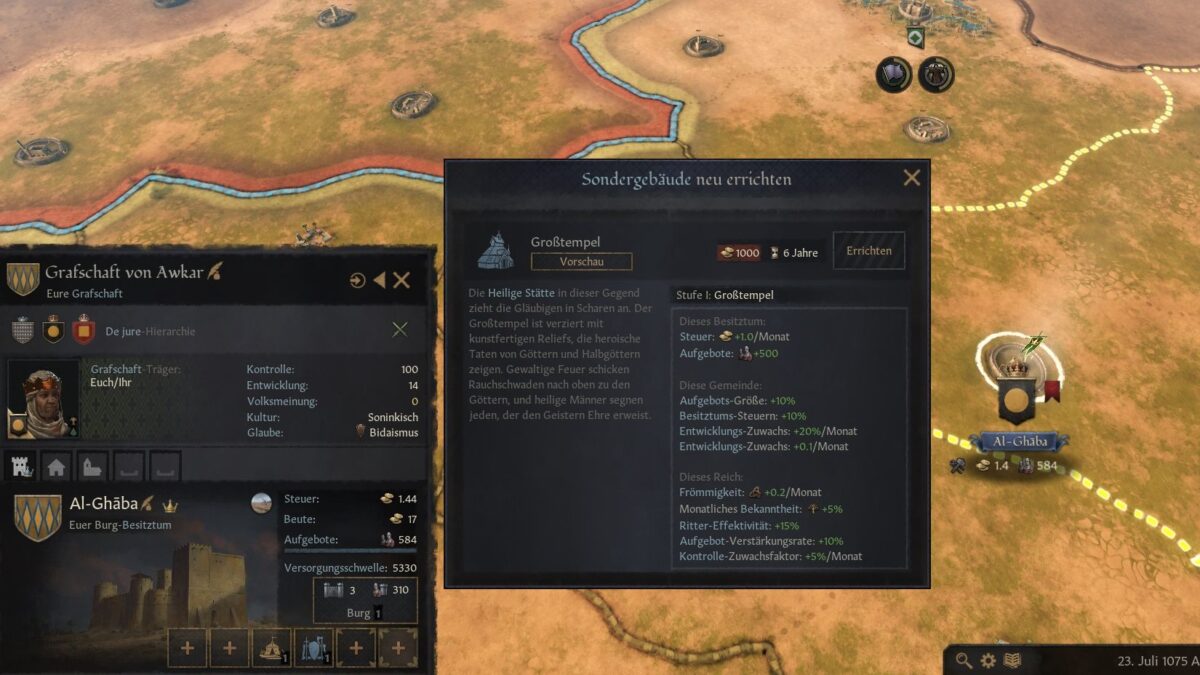
Historic buildings can only be erected in a few historically significant places (see Map), if they are not already placed there by the game (such as the Haiga Sophia Cathedral in Constantinople). You cannot erect any other buildings on historical building squares – you can only destroy an already existing building. Building costs will not be refunded if a building is destroyed!
Walls & Towers (Special Building Castle)
| Level | Name | Monthly Tax | Fort Level | Garrison | Costs | Additional Effects |
|---|---|---|---|---|---|---|
| 1 | Bastion & Curtain Walls | +0,2 | +1 | +150 | 150 | — |
| 2 | Bailey | +0,4 | +2 | +300 | 225 | +300 County Supply Limit |
| 3 | Wall Towers | +0,5 | +3 | +450 | 300 | +300 County Supply Limit realm-wide: +1 Archer damage |
| 4 | Second Curtain Wall | +0,7 | +4 | +600 | 375 | +300 County Supply Limit realm-wide: +1 Archer damage |
| 5 | Zwinger | +0,8 | +5 | +750 | 450 | Holding: +4 Defender Advantage +300 County Supply Limit realm-wide: +1 Archer damage |
| 6 | Outer Baileys | +1,0 | +6 | +900 | 525 | Holding: +4 Defender Advantage +300, +2% County Supply Limit realm-wide: +1 Archer damage |
| 7 | Trace Italienne | +1,1 | +7 | +1050 | 600 | Holding: +4 Defender Advantage +300, +2% County Supply Limit realm-wide: +1 Archer damage |
| 8 | Ravelins & Cavaliers | +1,3 | +8 | +1200 | 675 | Holding: +4 Defender Advantage +300, +2% County Supply Limit realm-wide: +1 Archer damage |
Guilds (Special Building City)
| Stufe | Name | Monthly Tax | Monthly Developmental Growth | Costs |
|---|---|---|---|---|
| 1 | Guild Halls | +0,3 | +5% | 150 |
| 2 | Carver’s Guilds | +0,5% | +10% | 225 |
| 3 | Carpenter’s Guilds | +0,7% | +15% | 300 |
| 4 | Hunter’s Guilds | +0,9% | +20% | 375 |
| 5 | Mason’s Guilds | +1,1% | +25% | 450 |
| 6 | Tailor’s Guilds | +1,3% | +30% | 525 |
| 7 | Glassworker’s Guilds | +1,5% | +35% | 600 |
| 8 | Artisan’s Guilds | +1,7% | +40% | 675 |
Monasteries (Special BuildingTemple)
| Level | Name | Monthly Tax | Monthly Developmental Growth | Monthly Piety | Costs |
|---|---|---|---|---|---|
| 1 | Prayer Halls | +0,2 | +0,1 | +0,1 | 150 |
| 2 | Monastic Schools | +0,4 | +0,2 | +0,2 | 225 |
| 3 | Libraries | +0,5 | +0,3 | +0,3 | 300 |
| 4 | Pilgrim’s Quarters | +0,7 | +0,4 | +0,4 | 375 |
| 5 | Infirmaries | +0,8 | +0,5 | +0,5 | 450 |
| 6 | Copying Chambers | +1,0 | +0,6 | +0,6 | 525 |
| 7 | Hospices | +1,1 | +0,7 | +0,7 | 600 |
| 8 | Cloisters | +1,3 | +0,8 | +0,8 | 675 |
Duchy Buildings
Siege Works
| Level | Name | Realm Effects | Duchy Holding Effects | Costs |
|---|---|---|---|---|
| 1 | Siege Workshops | +20% Siege Weapon Effectiveness +2 Siege Weapon Toughness | +1 Fort Level | 300 |
| 2 | Trebuchet Engineers | +30% Siege Weapon Effectiveness +4 Siege Weapon Toughness | +2 Fort Level | 400 |
| 3 | Cannon Foundries | +30% Siege Weapon Effectiveness +6 Siege Weapon Toughness | +3 Fort Level | 500 |
Royal Reserves
| Level | Name | Holding Effects | Duchy Holding Effects | Costs |
|---|---|---|---|---|
| 1 | Royal Forests | +0.8 Monthly Tax | +10% Monthly Development +5 Popular Opinion | 300 |
| 2 | Vast Crown Forests | +1.1 Monthly Tax | +20% Monthly Development +10 Popular Opinion | 400 |
| 3 | Crown Forest Dishes | +1.4 Monthly Tax | +30% Monthly Development +15 Popular Opinion | 500 |
Royal Armories
| Stufe | Name | Duchy Holding Effects | Costs |
|---|---|---|---|
| 1 | Weapon Depots | +20% Levy Size | 300 |
| 2 | Crown Armories | +30% Levy Size | 400 |
| 3 | Royal Arsenal | +40% Levy Size | 500 |
Leisure Palaces
| Level | Name | Prestige Gain | Stress Loss | Scheme Effect | Duchy Holding Effects | Costs |
|---|---|---|---|---|---|---|
| 1 | Chateau | +5% per Month | +15% | +5 Hostile Scheme Success Chance +5 Personal Scheme Success Chance | +0.2 Monthly Control +20% Monthly Control Factor | 300 |
| 2 | Summer Palace | +10% per Month | +25% | +10 Hostile Scheme Success Chance +10 Personal Scheme Success Chance | +0.3 Monthly Control +40% Monthly Control Factor | 400 |
| 3 | Winter Palace | +15% per Month | +35% | +15 Hostile Scheme Success Chance +15 Personal Scheme Success Chance | +0.4 Monthly Control +60% Monthly Control Factor | 500 |
Marches
| Level | Name | Defender Advantage | Supply Limit | Fort Level | Hostile Raid Time | Garrison Size | Levy Reinforcement Rate | Costs |
|---|---|---|---|---|---|---|---|---|
| 1 | Strategic Marches | +4 | +25% | +1 | +20% | +25% | +25% | 300 |
| 2 | Border Marches | +6 | +50% | +2 | +30% | +50% | +50% | 400 |
| 3 | Grand Marches | +8 | +100% | +3 | +40% | +100% | +100% | 500 |
Military Academies (realm-wide Effects)
| Stufe | Name | Army Maintenance | Number of Knights | Knight Effectivity | Costs |
|---|---|---|---|---|---|
| 1 | Military Schools | -2% | +2 | +25% | 300 |
| 2 | Officer´s Academies | -3% | +4 | +50% | 400 |
| 3 | Grand Military Academies | -5% | +6 | +75% | 500 |
Archery Grounds (realm-wide Effects)
| Level | Name | Men-at-Arms Maintenance | Archers | Skirmishers | Costs |
|---|---|---|---|---|---|
| 1 | Archery Ranges | -6.00% | +15% Archer Damage +5% Archer Toughness | +10% Skirmisher Damage +5% Skirmisher Toughness +10% Skirmisher Pursuit +5% Skirmisher Screen | 300 |
| 2 | Royal Bowyers | -8.00% | +30% Archer Damage +10% Archer Toughness | +20% Skirmisher Damage +10% Skirmisher Toughness +20% Skirmisher Pursuit +10% Skirmisher Screen | 400 |
| 3 | Marksmans Range´s | -10.00% | +45% Archer Damage +15% Archer Toughness | +30% Skirmisher Damage +15% Skirmisher Toughness +30% Skirmisher Pursuit +15% Skirmisher Screen | 500 |
Blacksmiths
| Level | Name | Men-at-Arms Maintenance | Heavy Infantry | Spearmen | Costs |
|---|---|---|---|---|---|
| 1 | Crown Smithies | -6.00% | +5% Heavy Infantry Damage +15% Heavy Infantry Toughness | +5% Spearmen Infantry Damage +15% Spearmen Infantry Toughness | 300 |
| 2 | Blacksmith’s Guilds | -8.00% | +10% Heavy Infantry Damage +30% Heavy Infantry Toughness | +10% Spearmen Infantry Damage +30% Spearmen Infantry Toughness | 400 |
| 3 | Royal Forges | -10.00% | +15% Heavy Infantry Damage +45% Heavy Infantry Toughness | +15% Spearmen Infantry Damage +45% Spearmen Infantry Toughness | 500 |
Tax Offices
| Level | Name | All Duchy Holdings | Costs |
|---|---|---|---|
| 1 | Tax Assessors | +10% Holding Taxes | 300 |
| 2 | Bailiff’s Office | +15% Holding Taxes | 400 |
| 3 | Magistrate’s Court | +20% Holding Taxes | 500 |
Jousting Fields (realm-wide effects)
| Level | Name | Men-at-Arms Maintenance | Light Cavalry | Heavy Cacalry | Costs |
|---|---|---|---|---|---|
| 1 | Jousting Fields | -6.00% | +10% Light Cavalry Damage +10% Light Cavalry Toughness +10% Light Cavalry Pursuit +10% Light Cavalry Screen | +10% Heavy Cavalry Damage +10% Heavy Cavalry Toughness | 300 |
| 2 | Tournament Grounds | -8.00% | +20% Light Cavalry Damage +20% Light Cavalry Toughness +20% Light Cavalry Pursuit +20% Light Cavalry Screen | +20% Heavy Cavalry Damage +20% Heavy Cavalry Toughness | 400 |
| 3 | Royal Tournament Arenas | -10.00% | +30% Light Cavalry Damage +30% Light Cavalry Toughness +30% Light Cavalry Pursuit +30% Light Cavalry Screen | +30% Heavy Cavalry Damage +30% Heavy Cavalry Toughness | 500 |
Historical Buildings, Mines & Universities-Map
Historical Buildings, Mines and Universites only can be built in a few baronies on the whole map. This special buildings map made by Reddit-User ulixDE (on basis of the official CK3-barony map) shows all relevant places.
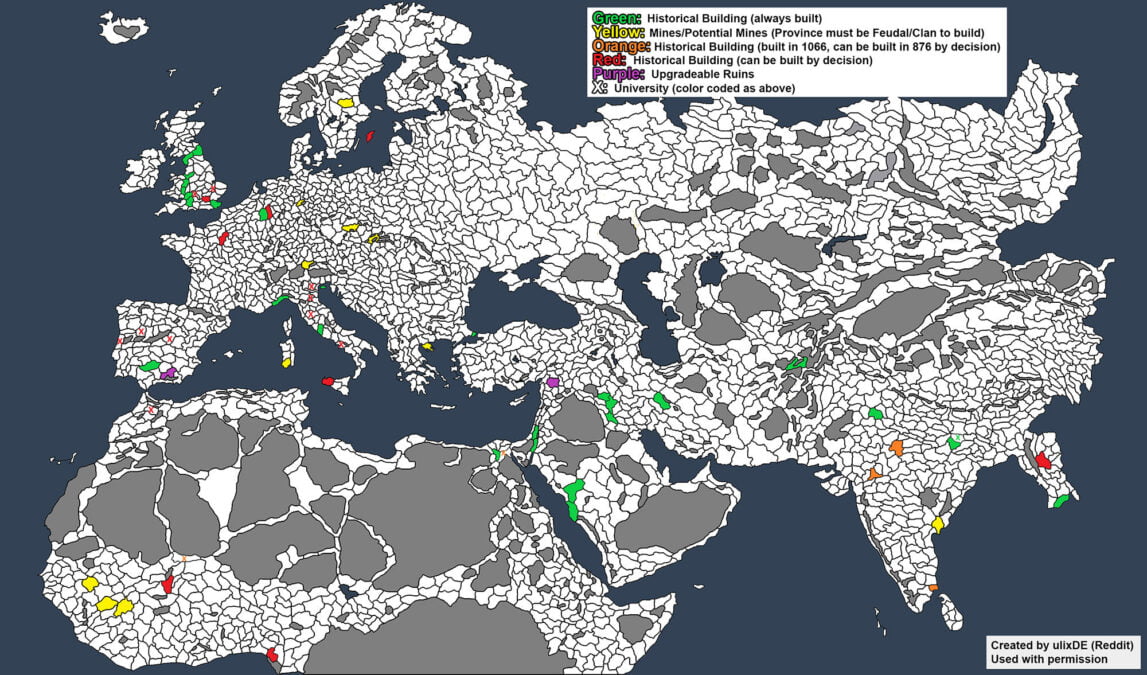
Laws, Succession Law, Feudal Contracts & How to Deal with the Population and Vassals
In organized societies, laws of all kinds regulate how people treat each other – naturally this is also the case in Crusader King 3. Researchable and changeable laws for the most important aspects of rule include succession law, feudal authority and feudal contracts. Other customs, such as divorces or society’s opinion on adultery and other possible crimes, are governed by the doctrines of the ruler’s faith. More on this later in the section dealing with Religions.
Succession Law
As soon as your current ruler has passed away, usually the fighting and stabbing among the heirs begins: Successions are seldom so conveniently regulated that the descendants of a ruler do not start fighting over title and land. The most comfortable form of succession – the eldest child inherits everything, the so-called Primogeniture – is a late medieval innovation. So if you start the game in 867 or 1066 A.D. you will have to deal with rather difficult circumstances for a long time. Open the realm window (F2) and select the tab “Succession” to see your current succession law and your heirs.
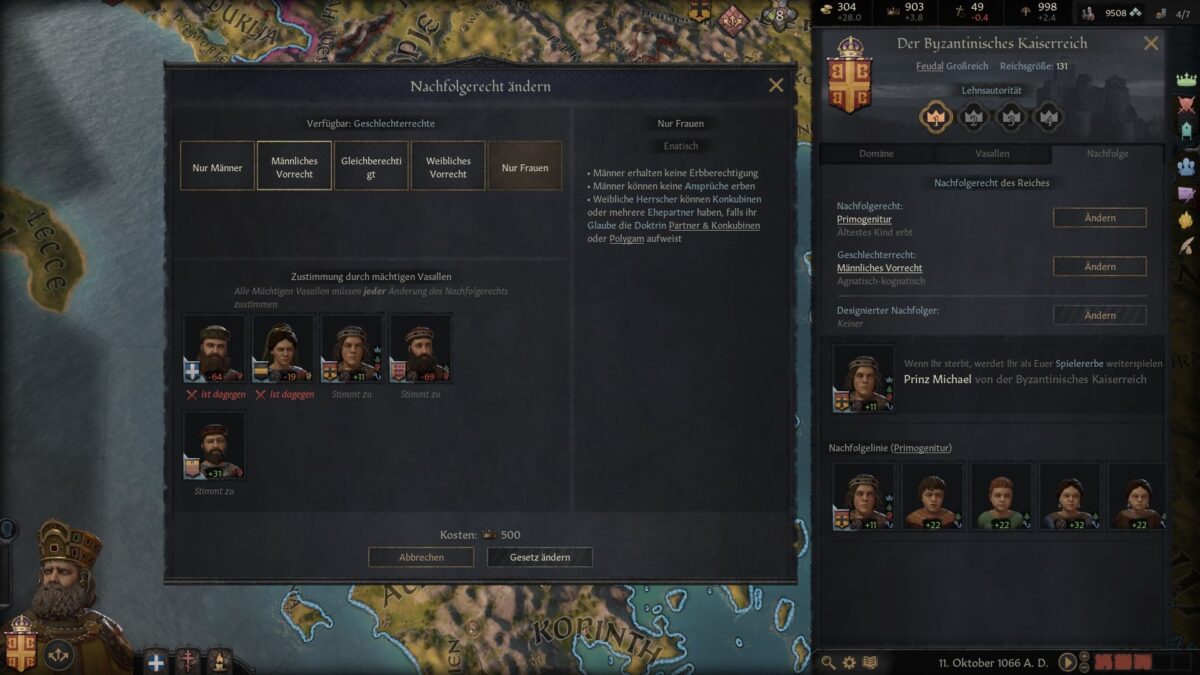
Your Succession Law consists of two components: the Succession Law and the Gender Law. With the Gender Law you determine which gender is preferred in the succession or you introduce equal rights. With the Succession Law you decide how the available titles are divided among the possible heirs.
The availability of genders for the succession is determined by the main doctrines of your faith. If these do not appeal to you, you will have to initiate a reformation of your faith. Possible variations of the distribution of titles are explored through the innovations of the four eras and must be unlocked before you can use them as law. Every change in succession law costs you prestige.
These Gender Laws exist
- Male Only/Male Preference
(Main Doctrine”Male Dominated”)
Only men can inherit (“Only Men”) or male heirs are preferred over female heirs (“Male Privilege”). - Male Preference/Equal/Female Preference
(Main Doctrine “Equal”)
Male heirs are preferred (“Male Preference”), men and women are treated equally when it comes to succession (“Equal”) or female heirs are preferred (“Female Preference”). - Female Only/Female Preference
(Main Doctrine”Female Dominated”)
Only women can inherit (“Female Only”) or female heirs are preferred over male heirs in succession (“Female Preference”).
These Succession Laws exist
- Confederate Partition
(Innovation “Gavelkind”)
All titles are divided equally among the ruler’s children. If there are not enough titles, but land is available, new Titles will be created. - Partition
(Innovation “Hereditary Rule”)
All titles are divided equally among the children of the ruler. - High Partition
(Innovation “Heraldry)
Most of the titles go to the heir, the rest is divided among the ruler’s children. - House Seniority
(Innovation “Heraldry”)
The oldest member of the ruling house inherits all titles. - Primogenitur
(Innovation “Primogeniture”)
The eldest child of the ruler inherits all titles. - Ultimogeniture
(Innovation “Primogeniture”)
The ruler’s youngest child inherits all titles. - Feudal Elective
The Ruler and all direct De Jure vasalls of one or two ranks below the title can nominate an heir from amongst themselves. Close relatives of the ruler are also available for election.
+10 Direct Vassal Opinion. - Saxon Elective
The ruler and all direct De Jure Vassals of one or two ranks below the title can nominate an heir from the most powerful vassals, the ruler’s legitimate children, or any other valid claimant.
+5 Direct Vassal Opinion. - Scandinavian Elective
The ruler and all De Jure Vassals (except Barons) can nominate an Heir amongst the Ruler’s Extended Family and any available claimants. Voting Power in this Succession Law is influenced by the Elector’s total Domain Development and Capital Popular Opinion. Known criminals are not eligible heirs, but their descendants are.
+5 Direct Vassal Opinion. - Tanistry Elective
The ruler and vassals of one or two ranks below the title can nominate an heir – the Tanist – from among the members of the ruler’s dynasty. Vassals will tend to favor older, distant relatives over close family.
+5 Direct Vassal Opinion.
Basically, you avoid wars over succession by using forms of succession law in which only one heir receives your highest titles. However, with fertile rulers, especially in the tribal era and the early Middle Ages, it is inevitable that there will be many title candidates. Here your tactics should be to expand the realm capital and the counties around the main title as much as possible, so that the heir has a good basis to subjugate siblings and other heirs.
If possible, you should try to expand your realm with a powerful ruler by inheriting one higher title (for example, Duchy) and several lower titles associated with the higher title De Jure. If the other heirs want to become independent, you will have at least one De Jure Casus Belli to reintegrate them into your realm after a successful war. Alternatively, the other heirs will remain your vassals.
Succession Problem: Too many or not enough available heirs – what to do?
If your current ruler is slowly reaching old age, it is time to consider who will become his successor. If there is no heir or if there are many children fighting over a limited number of titles, you should act to prevent the next generation from facing extinction or abundant problems.
Strategy in case of an insufficient number of heirs
- Swap Wife (and/or Concubine)
A male ruler with a woman in her mid-30s to early 40s has a very low chance of having children, as women become infertile at this age. If you have not produced an heir by then, a divorce including marriage to a young, fertile woman is highly recommended. If this is not easy to accomplish, our divorce tips in the section on Marriage and Divorce will help you. The same applies to concubines, if the faith of your ruler allows concubinage – if it doesn’t work out with the offspring, new partners must be sought. - Protect heirs from death in war
Generally forbid your heirs to serve as champions, because lost battles are more likely to have a negative effect on the health of your elite fighters. The game automatically selects characters with high warfare and martial skill stats as champions, which means you should check the champion list (in the military window, F3) regularly. Use the “Forbid” option to keep potential heirs away from lethal battles. - Improve spouse’s opinion
If a couple doesn’t get along well, it won’t work out between the sheets either. Increases the opinion of the spouse or wife by an Sway Scheme or uses a Romance Scheme, provided that the personality traits of the couple are compatible enough (if the traits do not match, the chance of success of a Romance Scheme drops to zero). As an alternative, you can make your wife or unwilling husband your lover by using a Seduce Scheme. Casual fun still bears the chance of successful impregnation after all. - Increase fertility of the ruler
Sometimes it takes a little push to turn rulers into happy parents. With the perks “Matriarch/Patriarch” (Diplomacy/Family Hierarch) and “Whole of Body” (Learning/Whole of Body) and “Seducer” (Intrigue/Seducer) you will get a noticeable bonus of 20 percent due to the characteristics associated with them. The perk “Like Weeds in a Garden” (Intrigue/Seducer) increases the fertility of your character even by a full 30 percent! Once your dynasty has gained enough popularity, you can unlock the “Bounteous Loins” legacy in the “Kin” category, which increases the fertility of all characters in the dynasty by ten percent. - Breed and legitimize Bastards
Check the faith doctrines to see how your ruler’s faith views bastards. If children of the ruler are automatically legitimized by the doctrine “No Bastards”, seek an affair and by events to engage in frequent sexual escapades – at some point a shot will hopefully be a goal. If the doctrine “Legitimization” rules, it’s best to devote yourself to several affairs and get on good terms with the Head of Faith of your religion (or the Dynasty Head, if there is no Head of Faith), to ensure that the bastard is legitimized after birth. Only if the faith of the ruler does not legitimize bastards, this method will not work. In this case, the Intrigue Lifestyle “Seducer” also helps, because many perks boost the strength and chance of success of seduce schemes. - Recruit a competent Court Physician
For smaller and larger aches and pains, an averagely trained court physician is more than sufficient. However, when it comes to really unpleasant diseases, the experimental treatment performed by an outstanding court physician can mean the difference between life and death for your heirs. Don’t be satisfied with leisure-time physicians when it comes to health! - Female Ruler
If you are playing a female ruler, you must keep the succession in mind as early as your fertile age. If you are in your early or mid-twenties, make sure you arrange a matrilineal marriage (children are born in the mother’s house), so that children born in the early twenties and mid-twenties are born in the mother’s succession. Never choose a husband with the quality “Chaste” or physical characteristics that reduce fertility. Increase the opinion of the spouse by using sway or romance schemes to make the couple become familiar with each other as soon as possible.
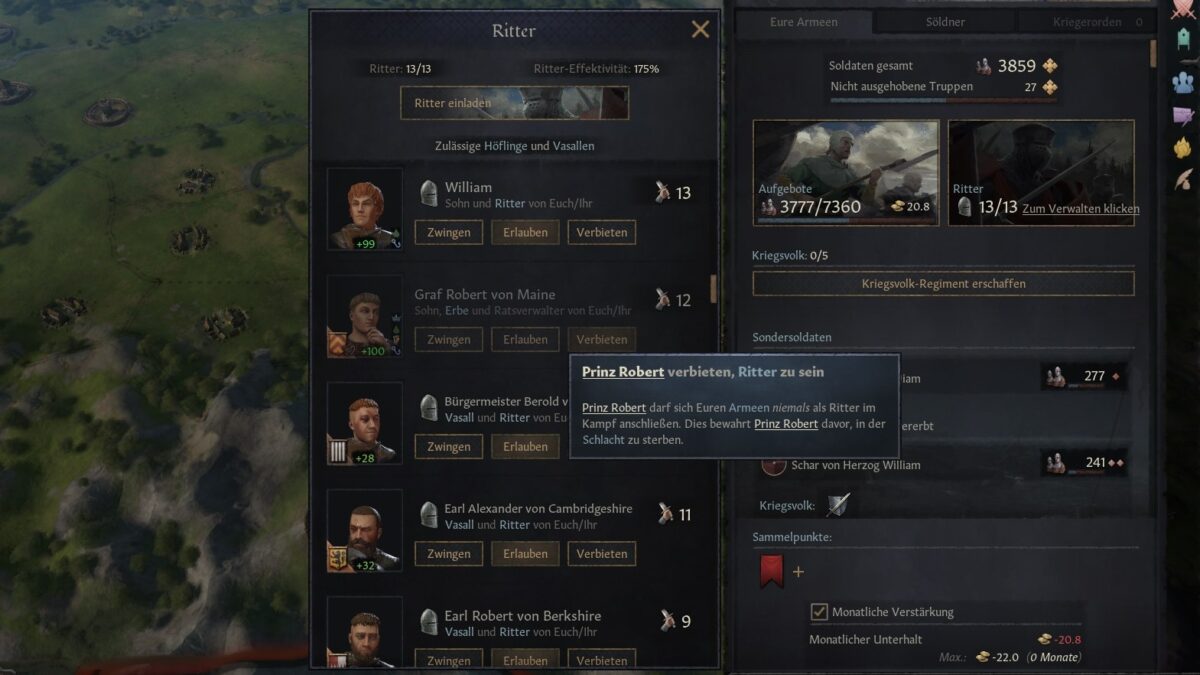
Strategy in case of too many available heirs
- Send redundant heirs as champions to war
If there are too many male heirs, you will sort out the unwanted sons, brothers or uncles most easily by “forcing” them to serve as Champions. Open the Military window (F3) and the Champion overview to use the “Force” option on these heirs and conscript them into military service. Then send your Champions out in a weak army (don’t forget to split the army!) that is lead by an incompetent Commander to fight against strong enemies or to loot neighbouring realms – the rest will be done by the dangerous battle life as soon as they meet the enemy. - Using your role as the Dynasty Head to disinherit heirs: If you are the head of your dynasty, you can easily get rid of annoying and redundant heirs by simply disinheriting them. Right-click on the character image of the heir you want to get rid of, click on “Hostile” and then select “Disinherit”. It couldn’t be easier!
- Create a higher Primary Title
Especially in the case of forms of inheritance law such as Confederate Partition and Partition, a realm quickly falls apart into many parts if your deceased ruler held too many titles of equal rank. Try to expand your realm early enough to gather all parts of a De Jure Duchy so that you can recreate a corresponding title. Since your main heir always receives the highest title, you will avoid the fragmentation of your realm that way. - Search for secrets of your heirs
Let your Spymaster perform the councillor task of “Find Secrets” at your court. With a bit of luck he will find a secret of an heir that will be considered a crime. You can throw a criminal courtier into your dungeon without having to fear any consequences – and depending on the conditions of imprisonment, such a thing is quite unhealthy. If you don’t find anything suitable or your heirs are leading a virtuous life, you can use the perk “Kidnapper” (Intrigue/Schemer) to unlock the option of abduction schemes and then attempt to get the respective heir into your control (and your dungeon) by abducting him. - Forging a murder scheme
When nothing else helps, there is still the possibility to get rid of unwanted heirs through murder schemes. You have a good chance of not being discovered, as long as your intrigue value is high enough and you are able to find competent helpers.
Crown Authority
Your crown authority determines what rights and duties your vassals have towards you and the degree to which you control them. With a High Crown Authority, vassals become dissatisfied faster, but cannot, for example, fight each other anymore. To see your current crown authority, open the realm window (F2). You can find the crown authority directly below the realm name in the upper part of the realm window. New forms of crown authority can be unlocked through innovations. Changes in the crown authority are paid for with Prestige.
- Important: Because of the extreme opinion deductions (-30), it is only worth maintaining “Absolute Crown Authority” in the case of an extremely chaotic realm, or an acute shortage of money or levies. Be careful not to annoy your powerful vassals without a good reason!
These levels of Crown Authority exist
- Autonomous vassals (1)
+10 Direct Vassal Opinion; Vassals provide levies and taxes, but are otherwise free to do whatever they wish. - Limited Crown Authority (2)
(Innovation “Planned Assemblies“)
Rulers can switch between available hereditary succession rights, titles can be revoked, vassals can be retracted, Clan government vassals provide at least five percent of the levies and two percent of the revenues. - High Crown Authority (3)
(Innovation “Royal Prerogative“)
-10 Direct Vassal Opinion, +10% Vassal Levy (Contribution), +10% Feudal Vassal Tax (Contribution), vassals cannot declare war on fellow Vassals (unless they have a Hook on the liege), vassal titles cannot be inherited by characters who originate from outside the realm, vassals who oppose the recognition of titles or the retraction of vassals are considered criminals, rulers can switch between all available succession laws, titles can be revoked, vassals can be retracted, clan government vassals provide at least 15 percent of the levies and five percent of the income. - Absolute Crown Authority (4)
(Innovation “Royal Prerogative“)
-30 Direct Vassal Opinion, +35% Vassal Levy (Contribution), +35% Feudal Vassal Tax (Contribution), vassals cannot declare war on fellow Vassals (unless they have a Hook on the liege), ruler can determine the heir, clan government vassals provide at least 25% of the levies and 10% of the income, rulers can switch between all available succession laws, vassal titles cannot be inherited by characters who originate from outside the realm, vassals who oppose the recognition of titles or the retraction of vassals are considered criminals, titles can be revoked, vassals can be retracted.
Feudal Contracts
Unlike the previous game, in Crusader Kings 3 you no longer set the duties of a vassal towards your ruler globally, but individually. You can assign special rights, which allow the vassals, for example, to declare wars regardless of the crown authority of the liege or to protect their title from being revoked by the liege. You can unlock new feudal contracts through innovations.
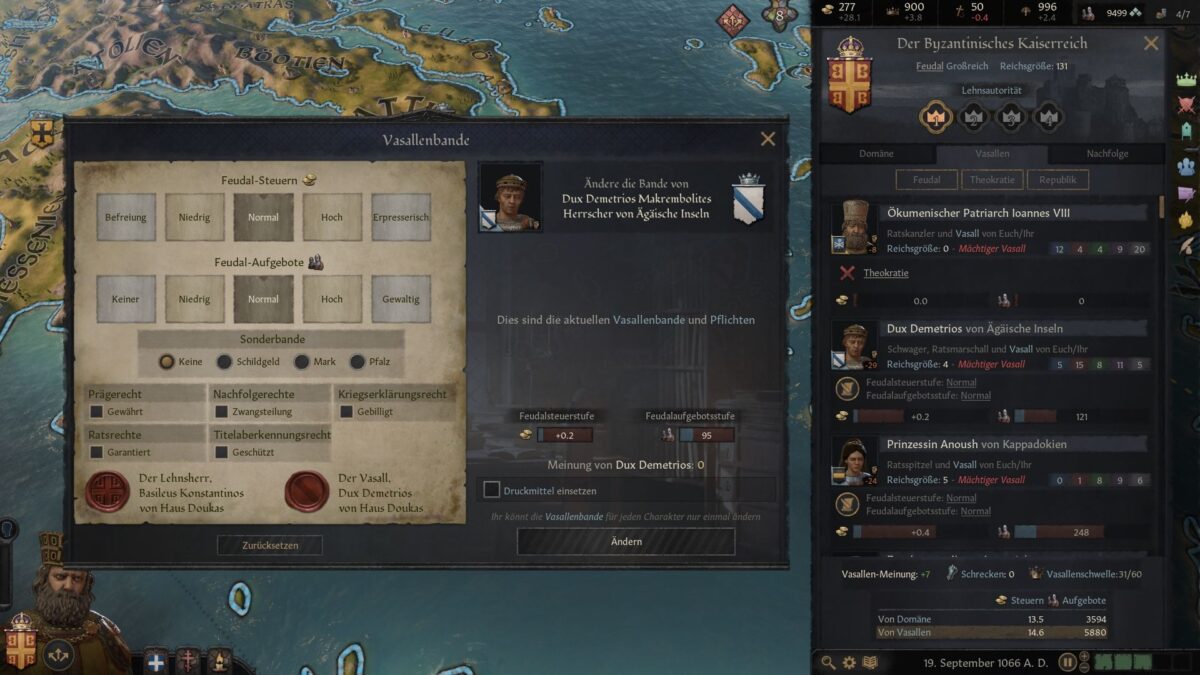
To see what feudal contracts are already in place between your ruler and your vassals, open the Realm window (F2) and click on the “Vassals” tab. Right-click on a vassal portrait and select the option “Modify Feudal Contract” in the “Vassalage & Court” section. You can change feudal contracts only once per character.
Feudal Tax Options
- Exempt: Tax 0%, +10 Vassal opinion
- Low: Tax 1.8%, +5 Vassal opinion
- Normal: Tax 7.5%, +-0 Vassal opinion
- High: Tax 11.2%, -15 Vassal opinion, is considered an act of tyranny
- Extortionate: Tax 18.7%, -25 Vassal opinion -25, is considered an act of tyranny
Feudal Levy Options
- Exempt: Levies 0,0%, +10 Vassal opinion
- Low: Levies 9.0%, +5 Vassal opinion
- Normal: Levies 22.5%, +-0 Vassal opinion
- High: Levies 31.5%, -15 Vassal opinion, is considered an act of tyranny
- Extorionate: Levies 45.0%, -25 Vassal opinion, is considered an act of tyranny
Other Feudal Contracts
- Succession Rights (Forced Partition): Succession law of the vassal is forcefully changed into a partition succession law, Law change costs increase for the vassal, -5 Opinion with vassals
- War Declaration (sanctioned): Vassal can declare war regardless of the liege’s crown authority, vassal pays less prestige for war Casus Belli within the realm
- Council Rights (guaranteed): Vassal can use the Demand Council Position character interaction however he pleases, +5 Opinion with vassal, −2 Opinion about the liege with all powerful vassals
- Title Revocation (protected): Liege cannot revoke titles, −5 Opinion with the vassal
- Coinage Rights (Innovation “Coinage”): +0.3 Monthly development growth in realm capital for the vassal/−2% Monthly development growth for the liege
- Palatinate (Innovation “Divine Right”), Minimum rank Duke: +5% Monthly Liege Prestige +20% Monthly Vassal Prestige, +15 Fellow vassal opinion, +10 Hostile scheme success chance for the vassal, +10 Personal scheme success chance for the vassal
- Scutage (Innovation “Scutage”), Minimum rank Duke: −20% Men-at-arms maintenance
- March (Innovation “Burhs”), Minimum rank Duke: −20% Army maintenance,+20% Levy size, +20% Garrison Size, +20% Levy reinforcement rate, +5 Controlled territory defender advantage
How to deal with the Population and Vassals
Particularly in freshly conquered areas or counties that do not follow the faith or culture of your ruler character, the people begin to boil rather quickly. The lower the popular opinion of your ruler, the greater the probability of peasant uprisings, in which you then have to defend yourself against your own people. Even dissatisfied vassals tend to stab you in the back in times where you are weakened. That’s why our Crusader Kings 3 tips in this section are dedicated to the question of how you can make both your people and your vassals happy, or more precisely: how to increase their opinion of your ruler and clear out possible sources of unrest.
- If a vassal leads a faction against you, he is your most important target when trying to improve opinions: a faction loses a lot of influence once the leader leaves it.
How to keep the population happy
- Align culture: If you rule over peasants and citizens from another culture, there will naturally be a lot of friction. Send your Steward with the task “Promote Culture” to counties that do not belong to the culture of your ruler. The map option “Cultures” (lower row of cards in the middle, with the “Book” symbol) will tell you where the culture of the ruler differs from the culture of the people by marking those areas in stripes. The higher the stewardship value of your Steward, the faster this councillor task will be completed.
- Align faith: If your ruler and his people adhere to different faiths, there are, depending on the relationship of the faiths to each other, sometimes enormous deductions in Opinion. Only forced conversion can help here! Either you allow your ruler to convert to the prevailing faith, or you convert the citizens to the faith of your ruler. You convert your ruler through a corresponding decision, which costs you a certain amount of Piety. With the councilor task “Convert Faith in County” given to your Court Chaplain/Realm Priest, you bring the people to the desired denominational line. The higher the Learning value of your Court Chaplain/Realm Priest, the faster this will be done.
Is strengthened by the perk “Zealous Proselytizer” (Learning/Theologian). The “Religious Icon” (Learning/Theologian) perk also negates the temporal limit that arises in the conversion of counties whose faith has a higher fervor value than the ruler’s faith. - Perk “Popular Figurehead” (Stewardship/Architect): You can raise the popular opinion by as much as +50 with this perk. If your ruler follows the Stewardship Lifestyle, this perk becomes especially worthwhile if you plan to conquer large territories or try to gain a foothold in a troubled realm.
- Perk “Open-Minded” (Learning/Scholar): The opinion of members of other cultures about your ruler increases by +15, and apart from that there is no negative effect for you caused by foreign cultures of others.
- Carefully choose Event Decisions: From time to time you will be given decisions, of which the results may also affect popular opinion. Unless the other options provide a clear, useful effect, always choose the options that will increase public opinion when dealing with problems involving the population.
How to keep your vassals in line
- Sway or Befriend scheme : The basic method, available from the start of the game, is an “sway” scheme against a disliked vassal. This counts as personal scheme and offers you decision-making moments at certain intervals, in which the opinion of the scheme’s target about your character can improve. There are also possible events whose successful outcome earns you an additional opinion bonus. If you have activated the perk “Befriend” (Diplomacy/Family Hierarch), you can bind an already pacified vassal closer to your ruler character through friendship.
- Convert vassals: If a vassal belongs to a different faith than your ruler, this will give little to significant opinion deductions, depending on the relationship between the faiths. With the religion option “Demand Conversion” in the character menu of the vassal, you insistently urge the vassal to convert to the ruler’s faith.
- Appointing a vassal to a council post: Powerful vassals are especially keen on having an influential position. If possible, provide powerful (and competent!) vassals with the desired position in order to ensure that they act in your interest in the future. However, if the vassals’ skill values are low, you should keep them out of the Council, or else they will provoke negative events, based on the chosen councillor task!
- Hold a Feast: Use the decision “Hold Feast” in the decision window regularly, if you have enough gold in reserve. If everything goes smoothly, you will increase the opinion values of one of the participants per feast. However, embarrassing events can also occur, which you can counter only with stress. Feasts are therefore only a safe bet for characters with the personality trait “Sociable”, as they automatically lose stress once the feast is over.
- Select suitable perks: The “Lovable” (Stewardship/Administrator) perk increases the opinion of direct vassals by 10, the “Positions of Power” (Stewardship/Administrator) perk increases the opinion of council members towards your ruler by an additional 20. The “Toe the Line” (Stewardship/Administrator) perk makes your vassals less likely to join Independence factions. The Administrator trait, which your character gets through the same-named perk (Stewardship/Administrator), increases the vassal opinion by 5.
- Unite De Jure Duchies: If you have dukes or kings under your reign who lack counties that belong to their titles, this will be clearly reflected in their opinions. Use the “Duchies” overview of the map (top row, far left icon) to find out which counties belong to which title, or click on a duchy’s coat of arms on the map to display all vassals belonging to it. Unite the counties belonging to the vassal title by assigning them to that vassal. This also applies to kingdoms if you are an emperor.
- Perform the councillor task “Domestic Affairs”: Let your Chancellor perform the councillor task ” Domestic Affairs” to improve long-term relations with all vassals. The bonus is lower than in a sway scheme, but its effects are more widespread.
The efficiency of the councillor task is increased by the perk “Chains of Loyalty” (Stewardship/Administrator). - Get rid of the unlawful ruler penalty: If you have conquered lands that lie far outside your ancestral realm (for example, as Emperor of Byzantium lands in Africa), the vassals there will be dissatisfied because they don’t like foreign rule. Create, if not already existing, a duke or king title of these more distant lands and give it to a local vassal. If you already have a higher-ranking vassal in the disputed territory, put the dissatisfied vassals under his control.
- Scare vassals into fear and terror: If friendship does not work, then tyranny will! Use options such as torturing prisoners or horrifying event decisions to increase your ruler’s terror value. Especially useful for this are the perks from the Intrigue Lifestyle “Torturers”. Once a character has reached a certain level of terror (Different from character to character), vassals become so afraid of your ruler that they no longer dare to rebel against him. The reign of terror becomes problematic, however, when your ruler himself becomes a prisoner of war or falls ill: If his terror decreases, the fear of the vassals also decreases. And that will come back to you when the vassals’ opinions towards your ruler fall through the cracks…
Religions and Reformations in Crusader Kings 3
Every ruler in Crusader Kings 3 adheres to a faith with varying degrees of enthusiasm. Each faith is determined by three Tenets and several Doctrines, which provide additional options for action and guide the everyday life of the believers: Faiths with human sacrifices allow for an additional Casus Belli, with which you can attack neighbors to take prisoners for sacrificial rituals. Faiths that allow esotericism enable the acquisition of an additional Lifestyle Trait, a faith with Monasticism enables courtiers to live as monks and nuns, and so on.
Each faith belongs to one of three major religious families. This also determines whether and against whom religious wars are possible and how other faiths are perceived by this faith. Faiths of one religion (for example, different forms of Christianity such as the Catholic and Orthodox faiths) can have different tenets and doctrines.
These Religious Families exist
- Abrahamic
This includes Christianity, Dualism, Islam, Judaism and Miletê Tawûsê Melek. Faiths of the same religion are considered hostile, and faiths within the same religious family and other religious families are considered evil. - Eastern
This religious family includes Buddhism, Hinduism, Jainism, Taoism and Zoroastrianism. Faiths of the same religion and the same religious family are considered misguided, while faiths of other religious families are considered hostile. - Pagan
The pagan religious family includes Akan, Baltic, Tibetan, Tanism, Finno-Hungarian, Nordic, Greek-Roman, Kordofan, Uralic, Oral Humism, Paganism, Hsexsje, Slavic, Shamanism, Oromo-Somali, Mandé, Hausa, Youruba, Senegambia and Zunbil. Faiths of the same religion are considered misguided, faiths of the same religious family are considered hostile. Faiths of other religious families are considered evil to the Gentiles.
Depending on the view of other faiths, there are some limitations for the cooperation among rulers, but also for the opinion of the people regarding rulers who adhere to different faiths and use another succession law:
| View | Character opinion | Popular opinion | Holy Wars | Title Usurpation | Holy Wars | Intermarriage |
|---|---|---|---|---|---|---|
| Astray | -10 | -15 | No | Possible | no | Common |
| Hostile | -20 | -30 | Yes | Impossible | yes | Unusual |
| Evil | -30 | -45 | Yes | Impossible | yes | Seldom |
Fervor
The strength of religious Fervor measures the status of a religion in the world and how strongly believers identify with their religion. The higher the percentage of Fervor, the faster it is possible to convert counties to that faith. With a low Fervor percentage, it is easier for rulers to create their own faith. Counties can also convert to other faiths (including heretic faiths) if the Fervor of their original faith is low.
- You can see the Fervor of your ruler’s religion by moving the mouse pointer to the Faith window next to your ruler’s portrait on the main screen (middle button with the symbol of the religion). Here you can find out the name and reformation status of the religion and the current Head of Fait (if there is one).
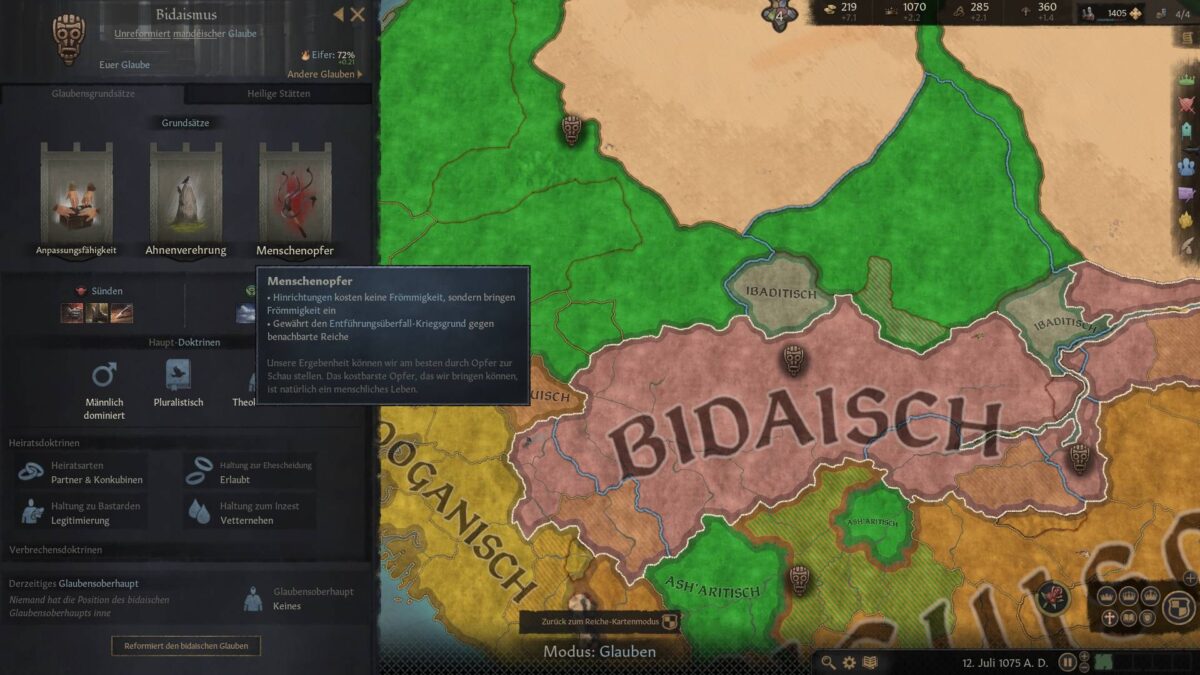
The Fervor value of a religion is flexible and reacts to events: Great religious wars and successful religious wars reduce Fervor. Publicly known dishonorable behavior of religious leaders (for example, Christian bishops) can also reduce Fervor. If a religious community is the target of a religious war, this increases Fervor just as much as heresy outbreaks. In such a case the religious community moves closer together to defend itself against outside influences.
Usually, the smaller a religious community is, the greater the Fervor. World religions such as Christianity, Islam, Buddhism and the like, on the other hand, usually have a lower level of fervor due to their wider spread of followers.
Holy Sites
Each religion possesses several holy places, which are of special value for the origin and worship of the respective faith goals. Each of these Sites, when held by a person of the same faith, grants a unique effect to all members of the community. The more places of worship are in the hands of believers, the more effects all members receive. To see which and how many holy sites are held by members of the ruler’s religion, open the Faith window (middle button next to the ruler’s portrait, bottom left on the main overview).
Click the “Holy Sites” tab for a general overview of locations and effects. If your goal is to conquer all Holy Sites for your ruler’s religion, use the “Faith” map (button on the far left, bottom row of the map overview, bottom right of the main view). There you can see in which counties your ruler’s religion is worshipped. Holy Sites are highlighted by the symbol of faith.
Reformation
In order to reform a faith, you should first build up a stock of Piety: Accepting new tenets and doctrines will cost you a certain amount of Piety, depending on the strength of the effects associated with them. On the religion overview page, select the “Reform the Faith” button at the very bottom to open the reformation page.
This is where you have the opportunity to change the symbol of the faith, the name of the faith, Tenets and Doctrines, and see how many vassals would convert at the same time as your ruler and how much Piety it will cost you to reform the current faith. Prepare to defend your reformed faith with the sword against followers of the old faith if necessary!
You must meet these requirements for a reformation
- Religion holds at least three Holy Sites: If you are lacking one or more counties under the control of a ruler of the corresponding faith for the minimum number of three Holy Sites, the only way out is conquest.
- A change in a Tenet or a Doctrine: For this requirement, you must have saved at least 395 Piety (most favorable Tenet) or 158 Piety (most favorable Doctrine).
- Sufficient amount of Piety: The more Tenets and Doctrines you change, the higher the cost of Piety becomes to make reformations. The costs are reduced by a percentage based on the current level of piety, the rest has to be paid by your ruler himself!
Given the costs, the question naturally arises as to why a religion should be reformed at all. If your ruler adheres to an unreformed/pagan religion, the efficiency of the Realm Priest / Court Preacher in converting counties increases with the reformation. In addition, you are given the opportunity to wage religious wars.
- Every ruler can create or reform a faith only once. If you want to carry out another reformation, you will have to wait until the next generation of rulers!
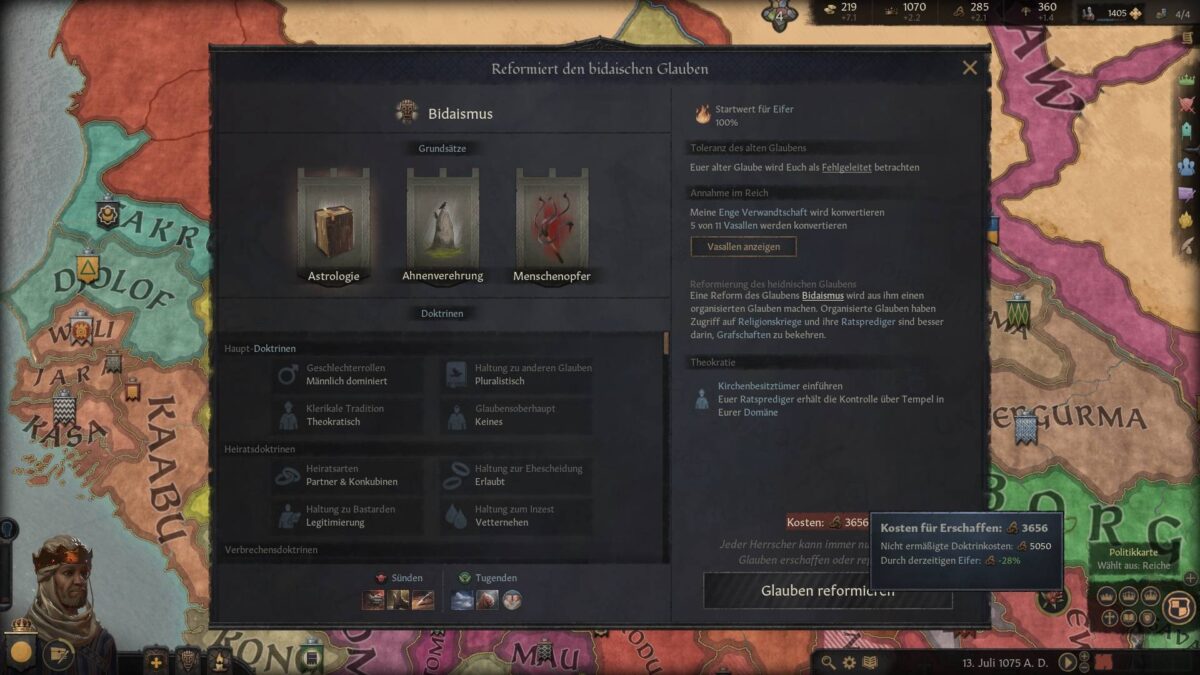
For already organized religions, it may be worthwhile to change the doctrines concerning divorce, adultery, same-sex relationships and bastards in order to make living together more just and modern. Alternatively, try out how your ruler is doing with a polygamous, perverted, witchcraft supporting, cannibalistic-esoteric religion. Crusader Kings 3 thrives on bizarre events just like its predecessor!
Tenets
If you reform a religion, you can change both its Tenets as well as its Doctrines. By doing so, you also determine which personality traits are considered sins and virtues among the followers of the faith. This passively modifies the opinions of all your subjects.
Overview of all Tenets
Religious Doctrines
The provisions of the four doctrine categories give your religion the final touch and determine not only possible succession laws, but also the procedure of the clergy, general moral concepts of the believers and which forms of marriage and offspring are permitted among the followers of your religion.
Doctrines have a strong impact on the daily life of your ruler, his family and his people: If divorce is forbidden, a ruler would have to think of other ways to get rid of an undesirable spouse. However, if at the same time female adultery is forbidden, it may be worth waiting for the wife to have an affair so that she can be imprisoned and killed as a criminal. If killing relatives is allowed, it should be quite easy for a ruler to get rid of title-hungry brothers and uncles – and so forth!
Main Doctrines
View on Gender
- Male Dominated: Enables the Male Only and Male Preference succession laws; Claims of women can only be pressed against other women, children or incapable rulers; Women do not get implicit claims on their parent´s titles; Women cannot be granted titles; Only Men can become commanders and knights; Only men and vassals can be appointed Chancellor, Marshal or Steward; all members of faith: −10 Opinion of female rulers
- Equal: Enables the Male Preference, Equal and Female Preference succession laws; both men and women can become Commanderr and Knights
- Female Dominated: Enables the Female Only and Female Preference succession laws; Claims of men can only be pressed against other men, children or incapable rulers; Men do not get implicit claims on their parent´s titles; Men cannot be granted titles; Only women can become commanders and knights; Only women and vassals can be appointed Chancellor, Marshal or Steward; All members of faith: −10 Opinion of male rulers
Religious Attitude
- Fundamentalist: Followers of other faiths have an Opinion Limit of 200%; +20% County conversion speed; Counties of other faiths are much more likely to join fractions; Increased risk of heresies if fervor is low; Ruler can revoke landed titles from adherents of a hostile or evil faith without incurring tyranny
- Righteous: Followers of other faiths have an Opinion Limit of 100%.; Ruler can revoke landed titles from adherents of an evil faith without incurring tyranny
- Pluralist: Followers of other faiths have an Opinion Limit of 50%.; −20% County conversion speed; Counties of other faiths are less likely to join factions; Reduced risk of heresies in case of low fervor; Winning a religious war will make infidel rulers in the target area vassals instead of directly appropriating the titles
Clerical Tradition
- Theocratic: Temple holdings must be leased to the Realm Priest of the holding, who then acts as a theocratic vassal; the liege receives taxes and levies only if the opinion of the Realm Priest has positive values towards the ruler
- Lay Clergy: Secular rulers control their own temple holdings and enjoy all the benefits that come with it
Head of Faith
- None: Faith does not have a head of faith, Fervor cannot go below 25%
- Spiritual: The head of faith title is given to a prominent clergy member; The head of faith can grant pressed claims on landed titles to pious followers ; The head of faith can grant gold to pious followers
- Temporal: The position of Head of Faith is given to the founder of the faith and then passed on to his primary heir at death; If the faith has great holy wars, the head of faith can choose its target and the Casus Belli
Marriage Doctrines
Marriage Types
- Monogamous: Characters can have one spouse; Rulers receive a considerable effect on their first marriage
- Polygamous: Characters can have up to four spouses, if gender law permits it, wenn das Geschlechterrecht es zulässt, Having too few spouses incurs a Piety Penalty
- Consorts & Concubines: Characters can have one spouse; Rulers can have up to three concubines, if gender law permits it
Attitude towards Divorce
- Disallowed: Characters can never divorce their spouse
- Must be Approved: Characters may divorce their spouse if the Spiritual Head of Faith approves (or the House Head if there is no clerical Head of Faith)
- Always Allowed: Characters may divorce from spouses at any time in exchange for Piety
Attitude towards Bastardry
- No Bastards: There are no bastards, all children are equally legitimate
- Legitimization: Bastards can be legitimized if the House Head or Dynasty Head agrees to it
- No Legitimization: Bastards can never be legitimized
Attitude towards Consanguinity
- Close-kin Taboo: Marriage between extended and close relatives is forbidden; Characters having sexual relations with extended and close family members gain the Incest secret
- Cousin Marriage: Marriages between cousins are allowed; sexual intercourse between cousins does not give rise to the secret of incest
- Avunculate Marriage: Marriages between cousins, aunts/nephews and uncles/nuncles are allowed; sexual intercourse between cousins, aunts/nephews and uncles/nuncles does not give the Incest secret
- Unrestricted Marriage: Marriage between family members is allowed; sexual intercourse between family members does not give the Incest secret
Crime Doctrines
Same-Sex Relations
- Criminal: Men with the trait Sodomite are criminals
- Shunned: Men with the trait Sodomite are shunned
- Accepted: Same-sex relationships are fully accepted
Perversion
- Criminal: Characters with the trait Deviant are criminals
- Shunned: Characters with the trait Deviant are shunned
- Accepted: Characters with the trait Deviant are fully accepted
Male Adultery
- Criminal: Men with the trait Adulterer or Fornicator are criminals
- Shunned: Men with the trait Adulterer or Fornicator are shunned
- Accepted: Men with the trait Adulterer or Fornicator are fully accepted
Female Adultery
- Criminal: Women with the trait Adulterer or Fornicator are criminals
- Shunned: Women with the trait Adulterer or Fornicator are shunned
- Accepted: Women with the trait Adulterer or Fornicator are fully accepted
Kinslaying
- Dynastic is Criminal: killer of relatives with the trait Dynastic Kinslayer or worse are criminals in the eyes of their dynasty
- Familial is Criminal: killer of relatives with the trait Familial Kinslayer or worse are criminals in the eyes of their dynasty
- Close-kin is Criminal: killer of relatives with the trait Kinslayer or worse are criminals in the eyes of their dynasty
- Shunned: killer of relatives are shunned
- Accepted: Characters who kill relatives are not considered killers of relatives
Witchcraft
- Criminal: Characters with the trait Witch are criminals
- Shunned: Characters with the trait Witch are shunned
- Accepted: Characters with the trait Witch are fully accepted
Clerical Doctrines
Clerical Function
- Control: Entire Clergy: +20% Control Growth
- Alms and Pacification: Entire Clergy: +10 Popular Opinion, -5% Domain Taxes
- Recruitment: Members of the clergy can serve as commanders or knights; Entire Clergy: +4 Prowess; +30% Levy Reinforcement Rate if same faith; −3% Domain Taxes if same faith
Clerical Gender
- Only Men: Only men can be granted temple holdings or serve as Realm Priest / Court Chaplains
- Only Women: Only women be granted temple holdings or be appointed as court chaplains or realm priests
- Either: Gender does not decide who can be granted temple holdings or be appointed as court chaplain or realm priest
Clerical Marriage
- Allowed: Clergy members can marry
- Disallowed: Clergy members cannot marry
Clerical Appointment
- Temporal, Revocable: Rulers appoint their own Court Chaplain / Realm Priest; Court chaplains/Realm Priests can be fired or replaced
- Spiritual, Revocable: The Head of Faith appoints their own Court Chaplain / Realm Priest; Court Chaplains/Realm Priests can be fired or replaced
- Temporal, for Life: Rulers appoint their own Court Chaplain/Realm Priest; Court Chaplain/Realm Priest holds his seat until death
- Spiritual, for Life: The Head of Faith appoints their own Court Chaplain/Realm Priest; Court Chaplain/Realm Priest holds his seat until death
Schemes: Intriguing at Court
In the medieval world, many changes are caused by the interaction between important and not so important people. In order to influence others to your liking, use Schemes as a long-term way to get what you want. A distinction is made between personal and hostile Schemes. You can get an overview of active personal and hostile Schemes in the Intrigue window (F6).
These Scheme Categories exist
- Personal Schemes: Personal schemes enable you to change a relationship with another character to your advantage, make friends, start affairs, ingratiate yourself with someone else, and perhaps even find a soul mate for your ruler.
- Hostile Schemes: These are designed to harm others and grant you an advantage – murder is also possible. If hostile schemes are uncovered, your reputation will be considerably damaged and, in the case of murder within your own kin, even permanently damaged through negative traits.
Right-click on the character portrait of your desired scheme target and select the desired scheme from the “Personal” or “Hostile” sections to set it in motion. Most personal schemes do not require any help, but for hostile schemes you will need to hire helpers, so-called agents, to help you carry out your sinister plans. Only courtiers, guests and direct vassals can be recruited as agents.
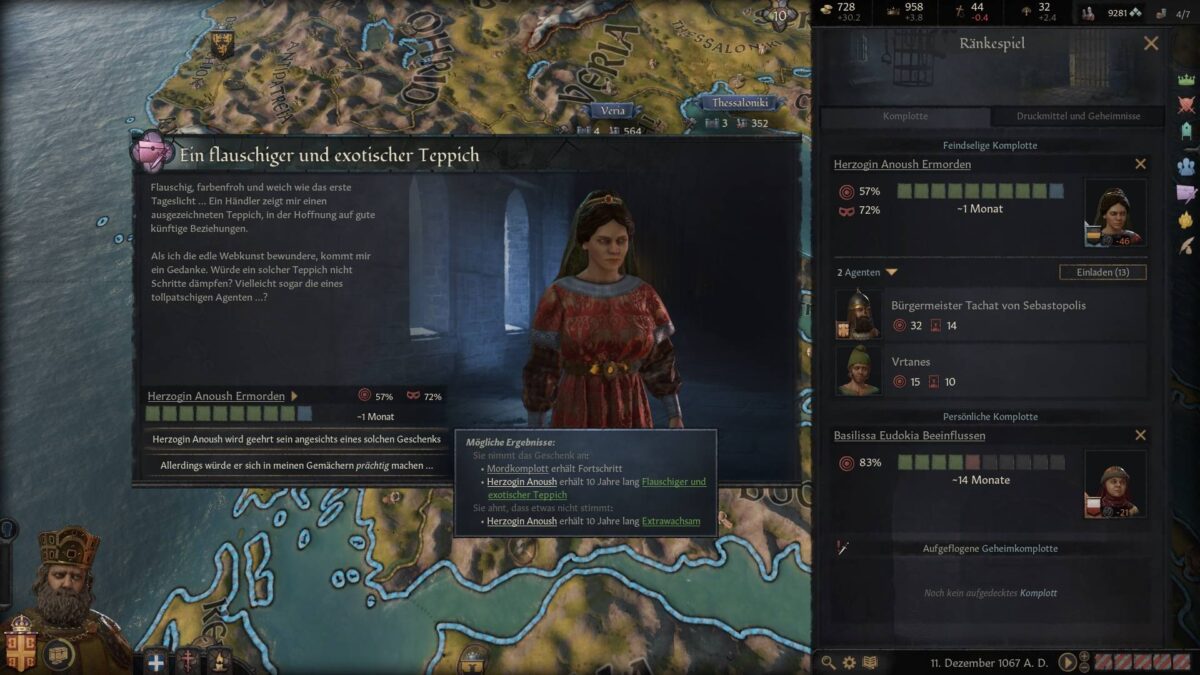
Agents who can get close to the desired target (council members, close relatives, affairs, etc.) are especially valuable helpers for hostile Schemes. Each agent contributes to the strength of the hostile Scheme, but the more people involved, the greater the chance of exposure: being an agent working on a hostile scheme is considered a crime!
Possible personal Schemes
- Sway: Increases the relationship values of another character towards your own character.
- Befrriend (through the perk “Befriend” (Diplomacy/Family Hierarch): You will make a character your ruler’s friend, if the scheme is successful.
- Seduce: Try to seduce another character (if that character is interested in the sex of your ruler) and start an extramarital affair.
- Romance: Courtship another character, which grants you prestige if the courtship is successful, improves the other character’s opinion and makes him or her a soulmate of your character.
- Elope: With this Scheme you bring the true love of your character to your court and you get married to her.
Possible hostile Schemes
- Murder: Along with others, you plan the murder of another character.
- Abduct (Through the perk “Kidnapper”, Intrigue-Lifestyle “Schemer”): Along with others, you plan the abduction of another character into your dungeon – what happens to that person in the dungeon afterwards is entirely up to you…
- Claim Throne: Allows your character to gain a Pressed Claim on the Liege’s Primary Title.
- Fabricate Hook (Through the perk “Truth is Relative”, Intrigue Lifestyle “Schemer”): Lets your character bend things in such a way that he receives a leverage against the scheming target.
During the process of scheming you will be presented with several events where you can choose how your agents should proceed. Depending on the success of these events, the scheming strength increases or decreases. If there are too many strange “coincidences” in a short period of time, the victim may become suspicious and the chance of success decreases. If your helpers are clumsy, the scheme may blow up. If you continue from such a point on, the exposure of your involvement in the events is very likely. However, other people could join as agents who also want to harm your victim. So it’s up to you how far you take a scheme!
How to increase your Chances for a successful Scheme
- Supporters through positive opinion: The more courtiers, relatives and vassals hold a positive opinion of your character, the more likely they are to support you in Schemes. More competent supporters in a Scheme also translates into a more successful operation.
- Select appropriate perks for personal schemes: Using the trait of the same name through the perk “Diplomat” (Diplomacy/Diplomat) increases your character’s scheme strength for Personal Schemes by 25%. The “Thicker than Water” perk (Diplomacy/Family Hierarch) increases your character’s chance of success for Personal Schemes against family members by 25%. The “Courtship” perk (Martial/Gallant) increases your chances of success for Romance- and Elope-Schemes by 30 percent each.
- Choose the right perks for seduction Schemes: If you choose the “Temptation” focus, your Seduce Schemes will generally have 20 percent more Scheme Power. With the Intrigue lifestyle tree “Seducer”, you can unlock several perks that make it much easier for your character to engage in Seduce Schemes. For example, “Subtle Desire” ignores rank differences, “Enticing Opportunity” gives you 30 percent more Seduction Scheme Power. With “Home Advantage”, Seduction Schemes against your own courtiers and guests are 50 percent more likely to succeed. Thanks to ” Graceful Recovery” you will no longer critically fail Seducing Schemes.
- Select appropriate perks for Hostile Schemes: The “Skulduggery” focus of the Intrigue Lifestyle increases the agent count of a Hostile Scheme by 10. With ” Swift Execution” (Intrigue/Anstigator) your Murder Schemes have 30% more power, with “A Job Done Right” (Intrigue/Schemer) you increase the chance of success of Hostile Schemes by +25. If you unlock the “Schemer” perk (Intrigue/Schemer), your character gets the trait “Schemer”, which also grants +25 percent more power for hostile Schemes, among other things.
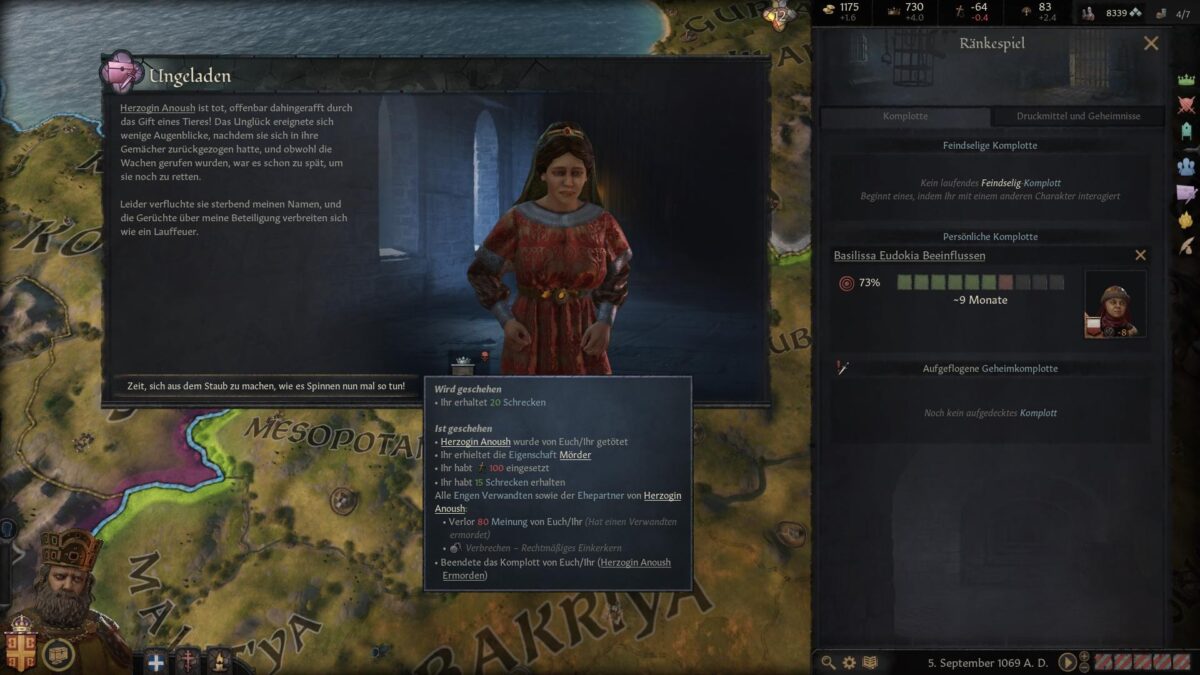
Hooks
The tab “Hooks and Secrets” in the intrigue window (F6) lists available Hooks and Secrets available for use against minions, but also other people’s Hooks against you and your character’s Secrets. You can use Hooks to force minions to make a decision of your choosing, such as forcing an otherwise unwilling minion to approve new succession laws. You can get Hooks by letting your Spymaster carry out the Councillor Task “Find Secrets” in a county.
- With the perk “Truth is Relative” (Intrigue/Schemer) you can not only fabricate Hooks but also gain additional Hooks through the Councillor Task “Find Secrets”.
Defense against Schemes
In order not to lose your ruler prematurely through the intrigues of his vassals, competitors, or family members, you have several options for defending yourself against hostile schemes. In general, it is helpful to either get along well with your surroundings so that the opinion values of your ruler’s fellow humans are at least positive (green), but ideally at least +50. Or you establish a reign of terror through cruel acts like torture, executions and the like, which intimidates all people around your ruler so much that they don’t dare to rebel anymore.
How to protect your ruler from hostile Schemes
- Spymaster with high opinion ratings: Nothing is deadlier than a Spymaster who dislikes your ruler – because if he takes part in a scheme, you have no chance of catching him. After all, he is the one who is supposed to track down and prevent schemes for you…
- Councillor Task “Disrupt Schemes”: Set your Spymaster to disrupt hostile schemes of others in general. This increases your ruler’s resistance to hostile schemes, and increases the chance of uncovering the scheme based on your Spymaster’s Intrigue rating. This task is additionally strengthened by 50 percent effectiveness through the perk “Court of Shadows” (Intrigue/Schemer).
- Collect Secrets/Hooks from enemies: Let your Spymaster perform the Councillor Task “Find Secrets” on vassals whose opinion of you is bad and is unlikely to change due to the interplay of traits, position, and ambitions. The more dirty secrets you know about someone, the easier it will be to expose the person or, in the case of secrets about crimes committed by that character, even make sure he ends up in your dungeon.
- Perk “Prepared for Anything” (Intrigue/Schemer): This perk hampers enemy hostile schemes against your ruler by -25 and against your courtiers by -10.
- Perk “Mortal Adoration” (Intrigue/Seducer): With this perk, your character’s affairs are less likely to join murder schemes against him and are more likely to save him from assassination attempts.
- Trait “Torturer” (Intrigue/Torturer): The trait granted by the same-named perk increases your resistance to hostile schemes by 25 percent.
Correct Handling of Captured Vassals
If you have lawfully imprisoned vassals after a suppressed revolt or because of other crimes that have become known, you have the opportunity to impose your will on him/her in exchange for his/her release. Do not kill captured vassals, as this will not only cause their close and distant relatives to have a more negative opinion of you but also decrease the opinion of other faithful vassals! Open the Court Overview Window (F5) and select the “Prisoners” tab to get an overview of your prisoners.
Don’t just release powerful vassals for ransom, but rather secure yourself politically against new problems: You can take over a county from vassals captured after revolts, without getting a bad reputation among other vassals. Ideally, you should take away the title of the vassal’s best-developed holding (action ” Revoke Title”) to withhold most of his income and levies from him in the future. This weakens his power noticeably and makes him less attractive as a faction leader or accomplice.
With the “Negotiate Release” option (the middle button with the open barred door icon, below the portrait of the prisoner) you can force captured vassals with claims to your title to renounce it (check the “Renounce Claims” option). This way, there’s much less risk of trouble from within that direction, at least for your title. If you just want to get rid of an annoying troublemaker, send him into exile with the respective option. You can force vassals with another religion to convert, which will reduce the amount of religious disputes in the future.
Crusader Kings 3: Preparing Wars
In most strategy games it is enough to build troop recruitment buildings and attack an enemy to conquer land or subjugate enemies. In Crusader Kings 3, warfare is a bit more complex. You should plan your attack well to avoid unnecessary failures.
To help you prepare for war, we have put together a list of useful steps that should prepare you for possible complications.
Checking your own and enemy Alliances
Especially for smaller realms, it is difficult to take on more powerful enemies, since their troop size is usually significantly outnumbered. However, if you fight together with allies, your army gets some free assistance. Open the ruler overview window and look at the “Diplomacy” section. Here all active alliances are listed.
Moves the mouse pointer to a displayed coat of arms to find out what type of closed alliance it is. After the war starts, you can call allies into battle using the military overview. According to their opinion of you, they will support you in battle.
- Allies call you to war from time to time as well. If you don’t want to fight, it will cost you a certain amount of Prestige to turn down the call. Allies who are already at war at the time of the creation of the Alliance will most likely call you into battle immediately.
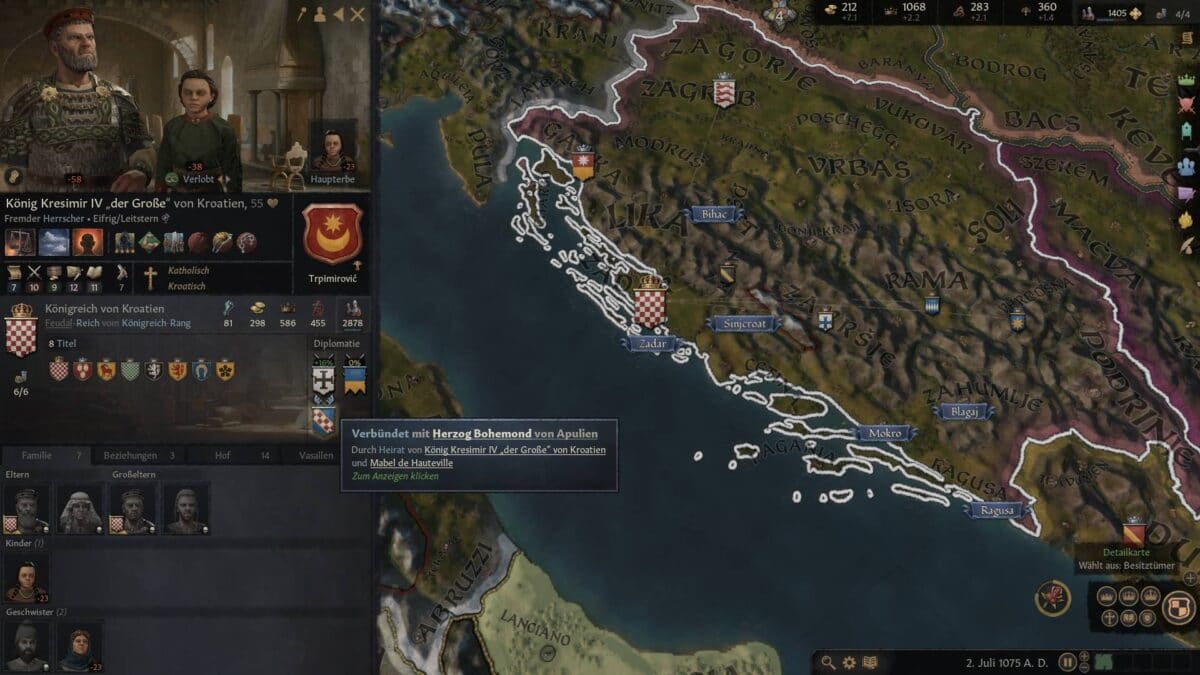
Usually a marriage results in an alliance with the liege of your spouse. The alliance expires as soon as the liege dies. When forming new alliances, make sure that allied rulers do not live too far away from you. Otherwise your opponent may have already worn you out on the battlefield while the reinforcements are still on a long journey.
- With the perk “Defensive Negotiations“ (Diplomacy/Diplomat) you can forge alliances with other rulers without getting married.
Also check what alliances your opponent is part of – otherwise it could happen that a supposedly inferior enemy suddenly surprises you with strong ally armies! The war declaration window lists the allies of your opponents. Alternatively, you can go directly to your enemy’s character overview window and look at the “Diplomacy” section there.
Create Financial Reserves
Just like in real life, wars in Crusader Kings 3 cost gold: Deployments and Men-at-Arms in the field require a certain portion of your monthly earnings as maintenance for supplies. Before an attack, be sure to build up a financial reserve that you can live on if the war drags on. If you fall into debt due to the army maintenance, the local stewardship will be noticeably destabilized!
If your luck in the war turns bad, stockpiled gold is also an advantage: Hire mercenaries for gold, when an enemy rolls over you with his troops. Open the military window (F3) and click on the “Mercenaries” tab to see which groups of mercenaries are available. Have the recruitment costs for the desired troop(s) ready, because mercenaries want to be paid in advance!
- With the perk “Soldiers of Lesser Fortune” (Martial/Overseer) your mercenary hire costs are reduced by 30 percent. The perk “War Profiteer” (Stewardship/Avaricious) increases your monthly income during war by ten percent. The perk “Fearful Troops” (Stewardship/Avaricious) reduces the Men-at-Arms maintenance by half a percent per terror.
Reinforce Troop Deployments and replenish Man-at-Arms
If you have built new barrack buildings for different types of troops, the soldiers are not at your immediate disposal, instead they must be trained over time at a monthly reinforcement rate. Wait until the levy is fully available, so that you can strike with the full strength of your troops.
If you have recruited Men-at-Arms, it will also take a few months until the first soldiers have grown to full strength. The Marshal’s Councillor Task “Organize Levies” accelerates the reinforcement rate and deployment size of your army if the task is performed successfully.
- The perk “Prepared Conscription” (Martial/Overseer) increases the Levy Reinforcement Rate by an additional 100 percent and reduces Army Maintenance Costs by 15 percent.
Checking Knights and train Commanders
An army is only as good as its leaders: In the battle system, knights (champions, faris, etc.) offer you additional damage potential through their fighting skills. Commanders increase the advantage of your troops through their martial value and commanding abilities. For a Marshal with a high martial value, use the “Train Commanders” Councillor Task to improve the values of your army commanders and knights in the long term.
In the military window (F3), you can click on the “Knights/Champions/etc.” tab to see which persons serve you as Knights. If there are people among the Knights whose death in battle you cannot (or do not want to) afford, you can simply use the button “Forbid”. This is particularly relevant for your Heirs!
- The perk “Kingsguard” (Martial/Gallant) increases the number of your knights by four.
If the majority of knights have poor martial and fighting skills, you can use the “Invite Knights” Decision to bring new people to your court and recruit them as courtiers for a fee, provided their values are better.
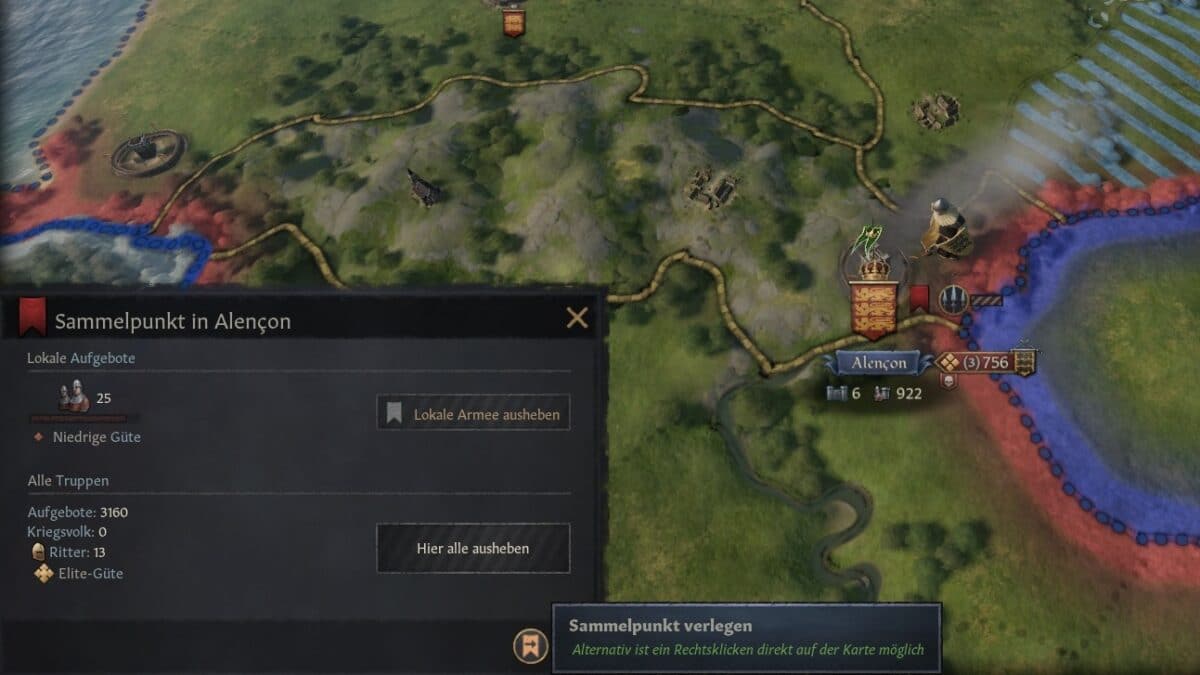
Set an appropriate Army Rally Point
If you are planning to fight a neighbor, move your army’s rally point as close as possible to the shared border. If you raise troops after the declaration of war, they will automatically be raised at this location and you can move into the enemy territory without losing time. This also applies if your headquarters are separated from other lands by a sea.
If you place the rally point in an upcoming war hot-spot in neighboring counties, all your troops will be raised right there. You save a lot of marching time and the shipping fee! More about this in the section Using the Rally Point Tactically.
Casus Belli in Crusader Kings 3
No war without a Casus Belli: All fighting apart from defense against uprisings and raiders must be justified in the eyes of the world. Each Casus Belli costs a certain amount of Prestige, measured by your own fame level, that of the opponent, and the specific demand. With the perk “Bellum Justum” (Martial/Strategist) you can reduce the costs of the Casus Belli by 50 percent.
- If a Casus Belli has a red exclamation mark circled in red, it means that you do not have enough Prestige to be able to use the Casus Belli, or that you do not have the appropriate level of Fame.
Overview of possible Casus Belli
- Claims
For this Casus Belli, either your character holds a claim to a county (or other title) or a member of your court holds a claim to a county outside your realm. When selecting the Casus Belli, you determine to whom the lands should fall in case of success (for example to yourself). If you conquer land for a member of your court, he will become your vassal. Claims can also be faked by the Realm Priest via the Councillor Task “Fabricate Claim on County” or you can buy them with Piety from your Head of Faith. - Seize De Jure County (Or Duchy)
If you hold a higher title that includes certain counties by law, but you do not control all of them, you can conquer them bit by bit with the Seize De Jure County Casus Belli. - Raid for Captives
This Casus Belli is possible for rulers whose faith demands human sacrifice. Instead of conquering land, the attackers try to capture as many people as possible, who are later sacrificed to the gods. As long as prisoners of a successful kidnapping raid are still in their own dungeons, a new Raid cannot be carried out. - Conquest/Invasion
Classic Conquest allows you to take over the titles of the conquered land in case of a successful attack and expand your realm including direct control of new lands. A character may only use the invasion of a kingdom as a Casus Belli once in a lifetime, while lower titles can be obtained at any time with this Casus Belli. - Holy War
Religious wars become possible against rulers of other realms who belong to a different faith. If you succeed, you take over all titles and vassals of the attacked ruler. - Forced Vassalization
With the perk “Forced Vassalage” (Diplomacy/Diplomat) you can force foreign rulers into your realm as vassals in case of a successful war. You control the new lands indirectly through the new vassals and have to generate positive opinions among the new vassals after the war ends.

If you have chosen the Casus Belli, you will be listed with coats of arms, which titles the war is about and how much fame the war will cost you. Next to it, you can see how many troops the enemy has. The strength of your enemy compared to your own troops is estimated. If you use the “Declare War” option, you start the war against the selected enemy.
Checking the Enemy’s Troop Strength after Declaration of War
If you have declared war on an enemy, you must expect that he will hire mercenary troops in addition to his forces and Men-at-Arms regiments. They are (currently) not shown in the war progress display in the number of troops. Click on the opponent’s ruler portrait, open the character overview window and wait for one or two game days. The amount of enemy troops will now be displayed next to the Piety value of the other ruler. If the number of troops increases, your opponent has hired mercenaries and you have to expect stronger resistance – of course, you can counter with your own mercenary troops.
Warfare and Raiding
In Crusader Kings 3 there are – apart from fending off raiders who invade one’s own country or crushing rebellions of dissatisfied vassals or heretics – two possible ways to enter into armed conflict with other rulers:
- War after Declaration of War
Once you have officially declared war on an enemy after careful planning (see the section on Preparing Wars), raise your army and gather it on your own territory. First, move with the entire troop into the enemy’s lands and seek battle. Then conquer the land by besieging and taking fortified holdings. Every successful martial action against enemies grants you war score, which is displayed in the war score icon at the bottom right of the screen. Successful actions of the enemy against you lower the war score. If you reach 100% war score, you have won the war and can force a Peace Offer to achieve the goals previously set in the declaration of war. For example, if you invade, you will receive land, if you are forcing Vassalization, you will subjugate another ruler, and so on. Dissolve the armies at the end of the war to be spared from paying further maintenance. - Raiding for Prestige and Loot
Raise your army as raiders and move into the lands you want to raid. Eliminate the troops of the respective rulers before you besiege their holdings. After a successful siege, you will be rewarded with gold and Prestige. Only when you return to your own lands and bring your loot home safely will your winnings be credited. If the lords of the raided lands succeed in defeating your army, you will return home with empty hands! At the end of the raid, dissolve the armies so that you do not have to pay maintenance. Important: This option is not available to all rulers – check your military window (F3) to see if you can start a raid with raiders! If the button next to “Raise all armies” is missing, you will have to earn gold and Prestige somewhere else!
Types of Troops
Your army consists of three different basic types of fighters, whose composition also determines the overall quality (goodness) of your army. The more Knights and Men-at-Arms in your army, the higher the overall quality. Armies with many levies and few knights are of lower quality. Before an attack, keep in mind that a smaller, higher-quality army is much stronger than its number would suggest, and is quite capable of beating a numerically superior army consisting solely of levies!
- With the Martial Lifestyle “Strategist” you strengthen your different troop types considerably through the use of various perks. The Martial lifestyle “Overseer” gives you useful perks to control your lands and protect them against enemy attacks.
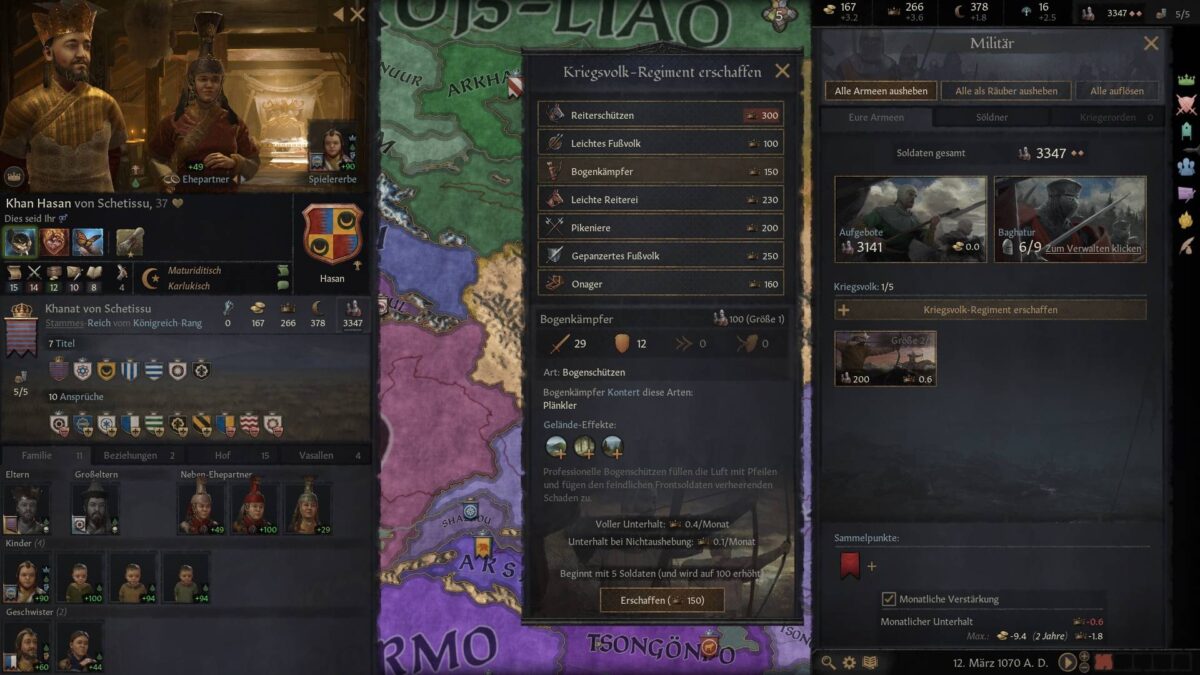
Levies
The great bulk of your army consists of simple fighters such as peasant militias, ruffians, local hirelings and impoverished nobles who go to war with makeshift weapons and patchwork equipment. Their advantage lies in their numbers. Buildings such as barracks increase the amount of levies available to you. Depending on your Feudal Contract, vassals will support you with a part of their own levies during war campaigns. After the completion of a building that increases the contingent or after the dismissal of an army, it takes a while until the contingent soldiers are available again at their maximum number. You can see this on the scale in the upper right corner next to your character’s renown value or in the military window (F3) in the overview.
Levies only cost maintenance if you have recruited them for a campaign.
- The perk “Prepared Conscription” (Martial/Overseer) increases the Levy Reinforcement Rate by an additional 100 percent and reduces army maintenance costs by 15 percent.
Men-at-Arms
In exchange for gold (prestige for tribal societies), you establish Men-at-War regiments that can counter other types of Men-at-Arms. Men-at-Arms represent the professional fighters in your army, who are specialized in a type of weapon or fighting style and are always under arms. These include pikemen, bowmen, light horsemen, or siege weapon specialists. With this type of troops, you can flexibly react to the armies of others, since an army made up of mass is not very helpful against specialized fighters.
At the time of the first raising, a Men-at-Arms regiment consists of five soldiers, which in time will fill up to the full strength of 100 soldiers. Men-at-Arms regiments can be upgraded up to five times in exchange for a fee, which increases the troop strength by 100 soldiers each time they are upgraded. However, this also affects the maintenance costs in times of peace and war.
Men-at-Arms cost little maintenance during peacetime and complete maintenance during a campaign.
- The perk “Fearful Troops” (Stewardship/Avaricious) lowers the Men-at-War maintenance by 0.50% per terror.
Champions
Champions, Knights, Faris, Bagathur or similar are the hero types of your army. While Men-at-Arms and levies have collective damage and toughness values that apply to all of their types, a champion’s fighting strength is measured by his Prowess skill value.
Each point in Prowess grants a champion 100 Damage and 10 Toughness – a Knight with 18 Prowess has 1800 Damage and 180 Toughness. By comparison, a levy soldier deals 10 Damage and has 10 Toughness.
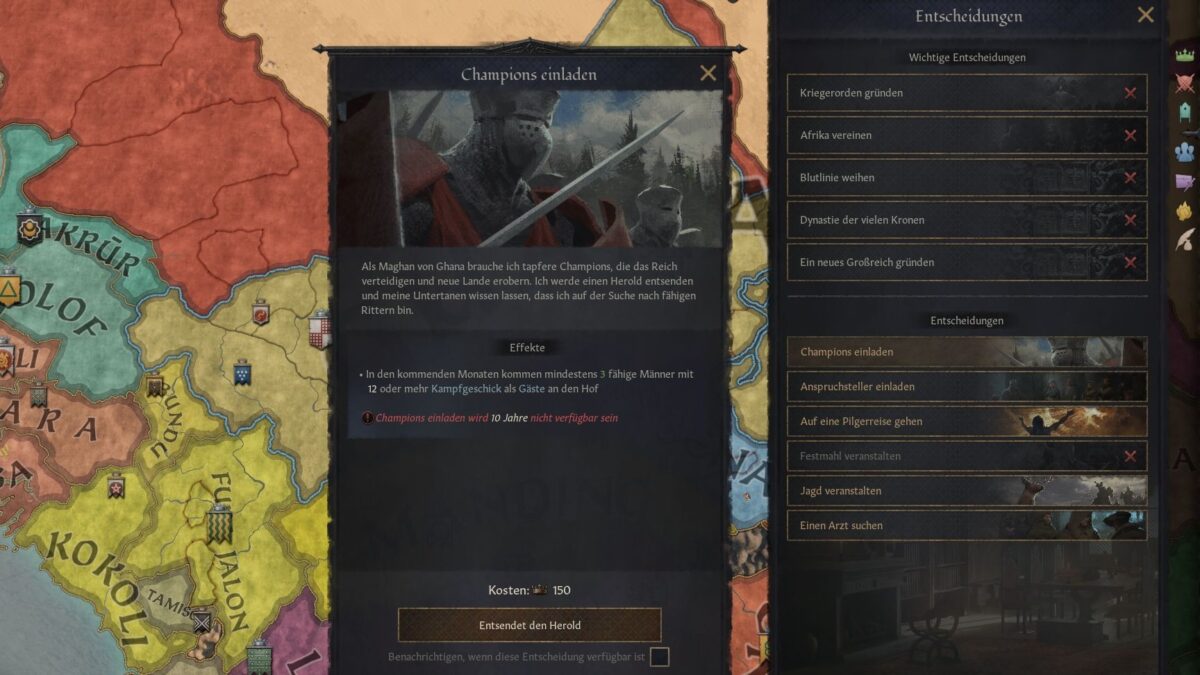
Thus, the higher the Prowess skill value, the more devastating the losses a champion can inflict on an enemy army, and the higher the probability that a champion will return home from battle. You can “forbid” champions to join your army, if you want to keep them out of battle. If you “force” a person to go into battle as a champion, they can also replace a champion with a higher Prowess skill value. The game automatically appoints the courtiers with the highest Prowess skill values as champions, including your Heirs. Therefore, check your champions-list regularly so that you don’t accidentally risk losing your successor in a war.
Champions do not cost any maintenance, but they can participate in schemes and other courtly activities.
Mercenaries
As additional support for your war effort, you can raise one or more mercenary troops in exchange for gold to support you in battle for a certain period of time. Mercenary troops go into battle as a separate army and have levies, Knights and Men-at-Arms under the leadership of a commander. In the “Mercenaries” tab of the military overview, you can see all available mercenary troops as well as their strength, quality and costs. If you click on an entry, an information window will open with a more detailed overview of the troop composition and the commander, including the Martial value and the traits of the commander.
Mercenaries charge a fixed amount of gold for recruitment. If the mercenaries’ service period expires, you can extend it for a fee.
- With the perk “Soldiers of Lesser Fortune” (Martial/Overseer) you reduce mercenary recruitment costs by 30 percent.
Holy Orders
During wars waged by a ruler against attackers of a hostile or evil faith, the latter can recruit a holy order of warriors of a certain Piety value for assistance. If the war ends, the support of the holy order also ends, since such military organizations act independently from feudal interests. Only patrons (king or emperor with the same faith in whose realm the headquarters of the order is located) do not have to pay anything for the support of the order. Available holy orders can be found in the ‘Holy Orders’ tab of the military overview window (F3).
A ruler of the same religion pays with Piety for the assistance of a holy order.
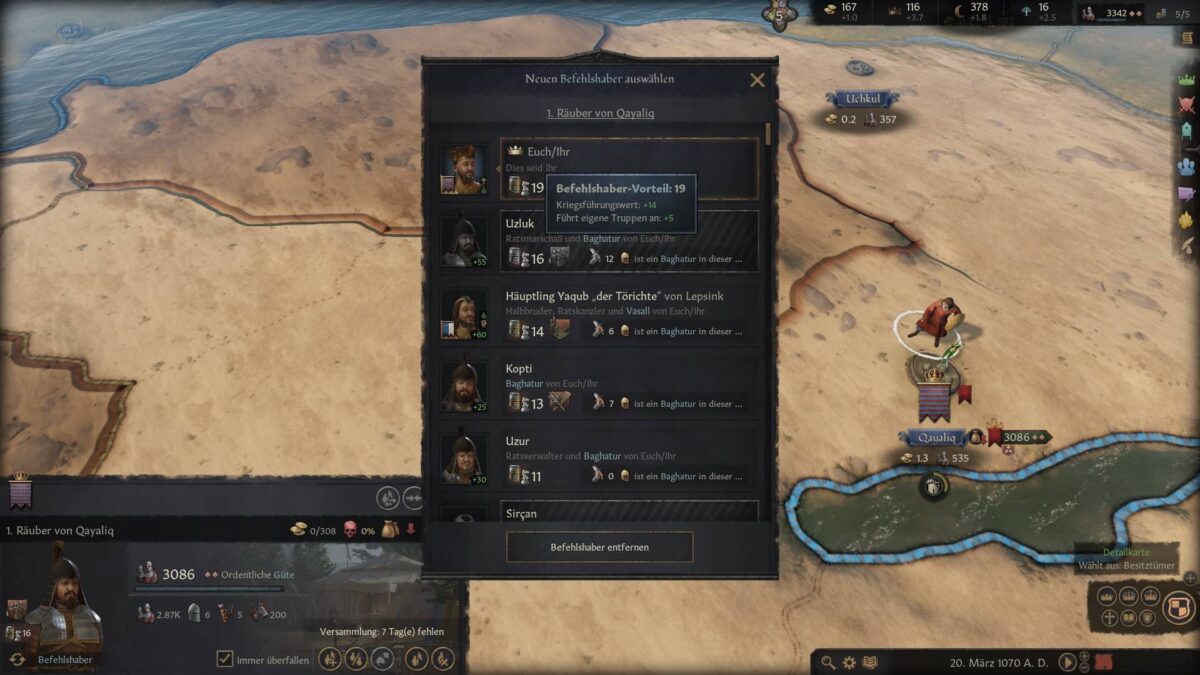
Commanders
Every army requires a commander to achieve maximum efficiency. How well a commander can lead his troops, depends on his Martial skill. The higher the Martial skill, the more Advantage the commander will bestow on his troops in battle. Commander traits increase the Advantage of his troops and may even give them a crucial advantage. You can read more about Commander Abilities later in this Crusader Kings 3 Guide.
- Warriors can be either commander or champion in a battle, but not both. An outstanding warrior that you designate as commander cannot attack the enemy as a champion, so consider before the start of the battle where you will make best use of warriors with high values in Martial and Prowess skills.
Once you have raised armies, right-click on the soldier figure next to the rally point on the overview map to open the army overview window. The portrait of the current commander (or an empty figure if no commander can be assigned) appears on the left, along with the martial skill value and any commander traits. Click on the two arrows next to “Commander” to exchange the commander. Now a list opens, which shows all potential commander candidates, together with their Prowess skill and their commander traits. Select your desired candidate. When selecting your desired candidate, make sure you choose fighters with high Prowess skill values or commander traits that are suited for the terrain or combat scenario!
Movement of Troops
Mark the army by clicking on the soldier figurine on the overview map. Then specify the target of this army with a right click on the target location. The army starts moving and after some time (depending on the distance) it will reach its target. The speed of the army also depends on the terrain. If a few days’ make a difference in battle, you should check the types of terrain in the counties that are suitable for passing through. Mountainous terrain, for example, slows your armies down to 50% of their speed while they march at full speed on farmland or plains.
Tactical use of the Rally Point
Pause the game immediately after a war has been declared and move the rally point of your army to a spot within your territory, that is as close as possible to the border of the enemy. This way, your soldiers will assemble on the spot without you having to gather them first and then having them advance to the target. This saves not only time, but also shipping costs if you travel by sea.
Open the Military window (F3) and click on the red flag symbol under “Rally Points”. The camera automatically switches to the rally point. Left-click the red flag on the map to open the rally point window. With the button “Move Rally point” (bottom right of the window, flag with an arrow symbol) you can move the rally point to another one of your controlled areas. Rally points can only be placed in your own territory.
- Important: Don’t forget to move the rally point again after the end of the war – otherwise your troops will end up in a corner where you won’t need them at all when you raise them for the next war!
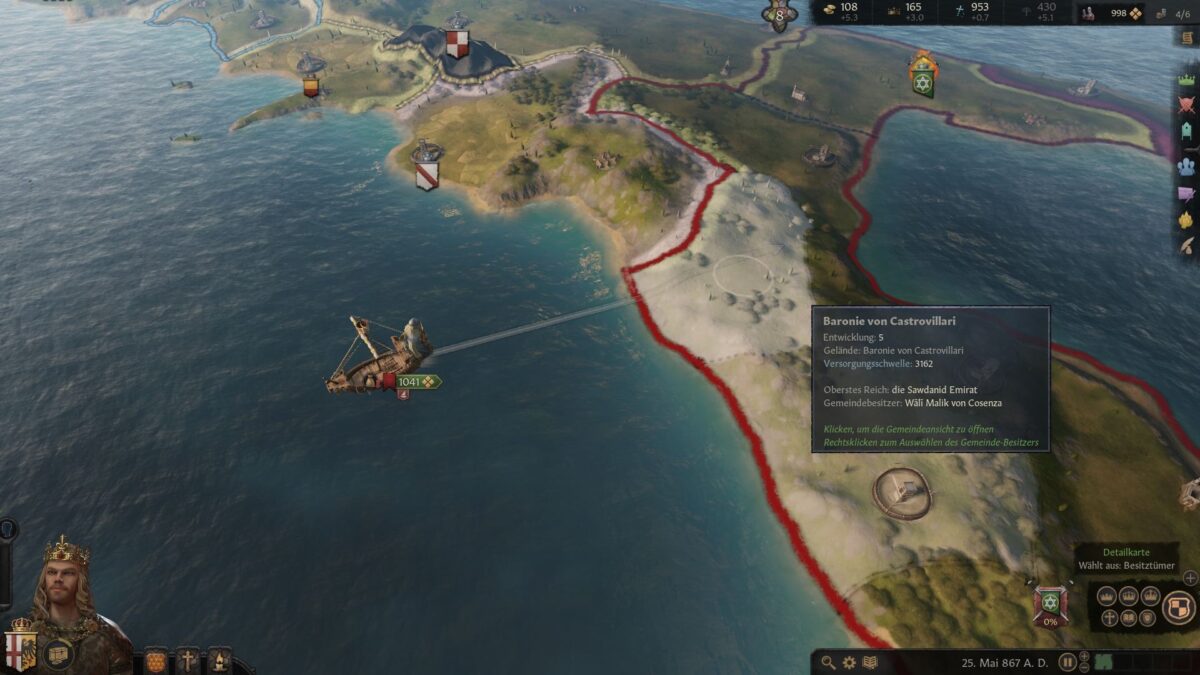
Movement of Troops Across the Sea
If you move your armies to a sea square, they will automatically embark – unlike in the predecessor Crusader Kings 2, you don’t need to build extra ships to move over water. However, the journey by ship remains expensive: transport by sea costs one gold per 100 men! So make sure you have a Gold Reserve before you send your armies via ship to the enemy, to avoid running into a debt trap. After landing, your army will receive the temporary penalty “Recently Disembarked”, which reduces its advantage in battle.
Terrain Characteristics
Overview of all terrain characteristics
| Terrain | County Effects | Military Effects |
|---|---|---|
| Farmlands | Supply Limit +50%, Monthly Development Growth +20% | Movement Speed 100%, Combat Width 100% |
| Floodplains | Supply Limit +35%, Monthly Development Growth +20% | Movement Speed 100%, Combat Width 75% |
| Mountains | Supply Limit -50%, Monthly Development Growth -25% | Movement Speed 50%, Combat Width 50%, Defender Advantage +12 |
| Desert Mountains | Supply Limit -60%, Monthly Development Growth -50% | Movement Speed 50%, Combat Width 50%, Defender Advantage +12, Defender Modifier: Retreat Losses -30% |
| Jungle | Supply Limit -25%, Monthly Development Growth -40% | Movement Speed 50%, Combat Width 70%, Defender Advantage +6 |
| Steppe | — | Movement Speed 100%, Combat Width 100% |
| Wetlands | Supply Limit -25%, Monthly Development Growth -25% | Movement Speed 70%,Combat Width 60%, Defender Advantage +5, Attacker Modifier: Retreat Losses +25%, Allied Casualties +20%; Defender Modifier: Retreat Losses +25%, Allied Casualties +20% |
| Hills | Supply Limit -10%, Monthly Development Growth -10% | Movement Speed 80%, Combat Width 80%, Defender Advantage +5 |
| Oasis | Supply Limit +10%, Monthly Development Growth +10% | Movement Speed 100%, Combat Width 100% |
| Steppe | Monthly Development Growth -50% | Movement Speed100%, Combat Width 100% |
| Taiga | Supply Limit -20%, Monthly Development Growth -5% | Movement Speed 80%, Combat Width 80%, Defender Advantage +4 |
| Drylands | Monthly Development Growth-5% | Movement Speed 100%, Combat Width 100% |
| Forest | Supply Limit -10% | Movement Speed 80%, Combat Width 90%, Defender Advantage +3 |
Battles
When leading an assembled army into enemy territory, you will usually encounter resistance pretty quickly. If both armies are in the same area, the battle begins: In the battle overview, you can see the advantages, troop strength, troop quality, champion quantity and the Prowess skill of the commanders of both sides. A thick, two-colored bar tells you which side gains the upper hand in the battle.
- Battle Advantage/Advantage determines that one side causes more damage than the other in a battle. The higher the advantage of one side, the more damage the troops will inflict on their opponents. Advantage depends on several possible factors: Terrain characteristics, martial skill value and commander traits of the commander. Both sides gain additional advantages from Advantage rolls made by the commander during the battle, which symbolize random events during the battle.
Commanders and champions can be injured, mutilated or killed during battles. If your commander falls, the enemies will gain a significant advantage! If one side has the upper hand and thus wins the battle, the defeated army will have to flee,but it can still be pursued and wiped out in subsequent battles.
- Watch out for the counties’ supply limit, when invading foreign lands: If the total amount of troops in the area exceeds the supply limit, the army loses its supply until all carried supplies are used up. At this point, the army is considered worn down and starts to lose soldiers through desertion, disease and hunger. Only when an army is back on friendly terrain, it will be supplied again.
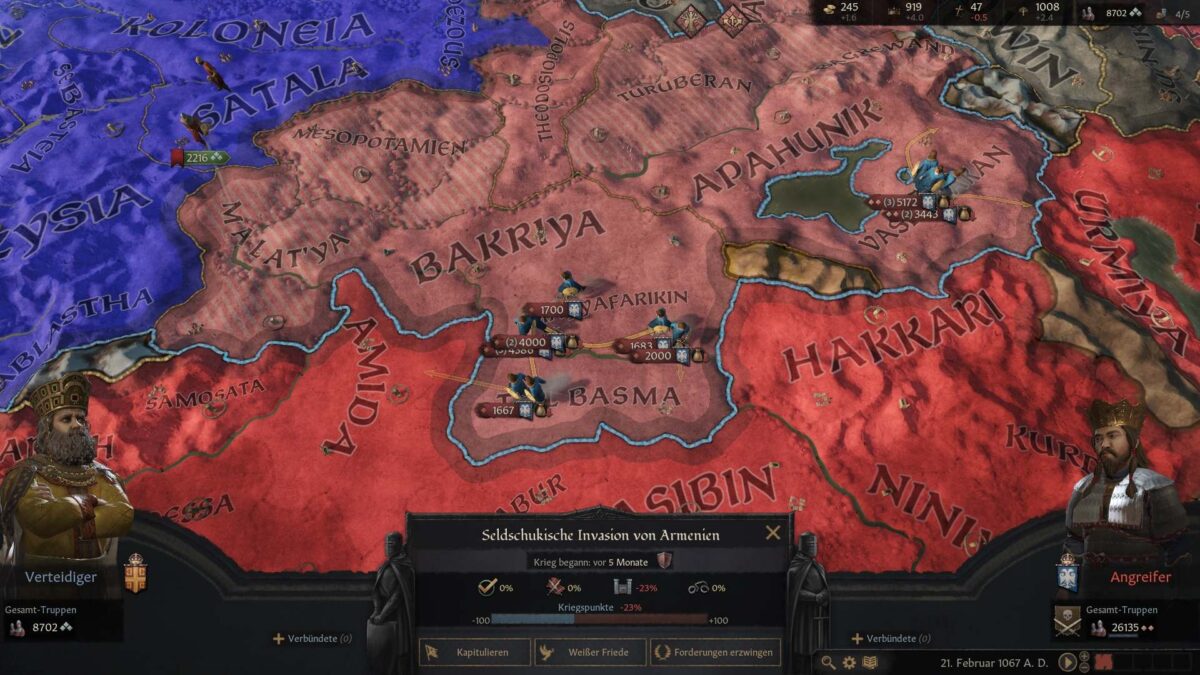
Siege
Once enemy troops have been pushed back, move your army into a county field with holdings to lay siege to it. The duration of the required siege time is calculated by the Garrison Strength and Fort Level of the besieged holding as well as other effects on both sides. The siege window displays how long the siege lasts, how big the daily Siege Progress is, how many troops are stationed in the enemy garrison, how much loot in gold can be expected as well as the Fort Level of the attacked fortified holding.
- To carry out a successful siege, your army must be greater in size than the troops stationed as garrison in the fortified holding. Fortresses with high Fort Levels cannot be captured efficiently without siege weapons (Men-at-Arms).
If you have siege weapons in your army, this will speed up a siege significantly. You can also storm a besieged fort using siege weapons in your army, but this costs a much higher blood toll compared to a conventional, slower siege. During a siege, various events take place, which determine the supply situation and resistance of the defenders. If the siege is successful, you will receive loot in the form of gold, and sometimes even prisoners and Prestige.
The county in which a successfully conquered fortress is located, is considered to be occupied during the war campaign and it increases the war score for the successful besieger. Occupied areas are marked with a colored hatching on the map. Headquarters of a ruler increase the war score significantly, making it worthwhile to first attack your opponent’s most important fortress with the largest amount of troops you own.
- If a siege lasts too long, your army starts losing supplies until all of the supplies it has brought with it are depleted. At this point, the army is worn down and loses troops, so make sure to finish sieges swiftly. In such a case, it is worth risking an assault on the fortress if you have siege weapons available, since you will lose troops anyway, if they are worn down.
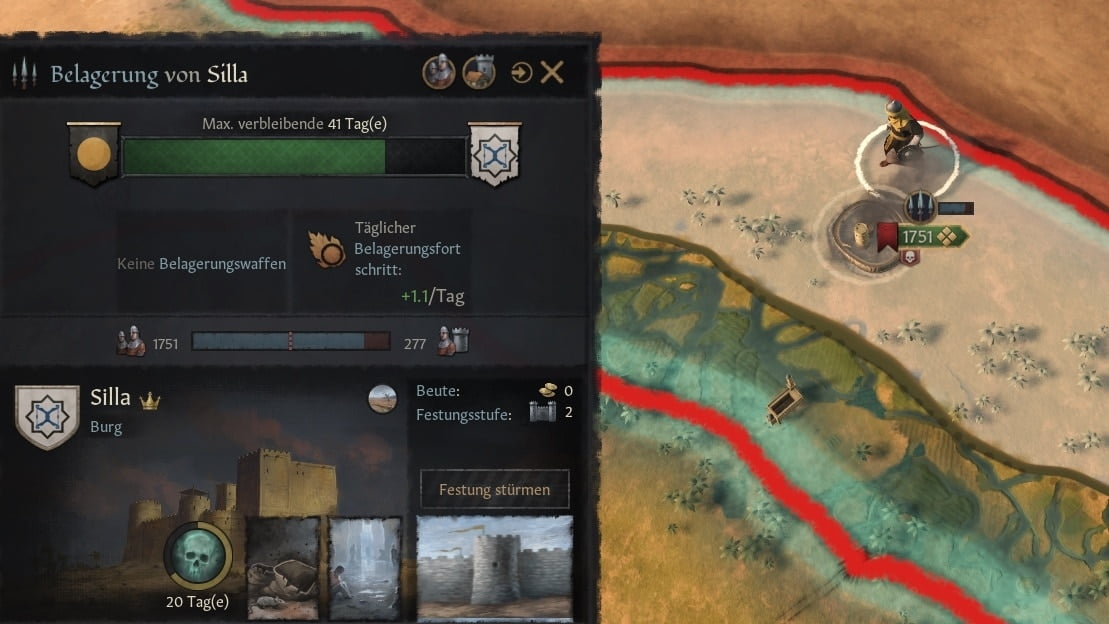
Home Defense
If enemies succeed in conquering your headquarters (usually the capital of your most important or highest title), you will receive a substantial penalty on your war score. Therefore, start preparing your castle in time of peace already, so that you can defend it effectively against enemies. Depending on how your realm has expanded, it may be worth moving your headquarters further into the center of the realm. The more time an enemy needs to fight his way through your counties and reach your headquarters, the more time you have for defense. Open the holding overview window of the county to which you want to move your headquarters. There is a button with an arrow pointing into a crown next to the name of the county. This button allows you to make this holding your new headquarters. Headquarters can only be moved during peacetime.
Additionally, expand your headquarters by improving the castle and other defensive buildings (“Walls & Towers”, “Outposts”, “Hill Forts” and “Watchtowers”). Buildings specialized in defense will increase the Fort Level of your holding and prolong enemy sieges substantially. By increasing the garrison size, you are also forcing the enemy to attack your holding with armies larger than the garrison stationed there. If your buildings provide additional combat advantages for defenders, you will have a noticeable bonus in defensive battles, provided that you approach with a relief army and engage the enemy on the territory of your headquarters.
Marriage Policy: Finding Spouses and Forming Alliances
Apart from military actions, a purposeful marriage policy is essential for rulers in Crusader Kings 3 to secure power and strengthen the dynasty. You should not do without a marriage for your ruler (or ruleress).
Why you Should Marry in Crusader Kings 3
- Begetting heirs: You can only continue playing after the death of your current ruler character, if you have heirs within your dynasty. Ideally, an heir is a child of your ruler character, whose education can be controlled by choosing a suitable guardian as early as childhood.
- Forming Alliances with other rulers: For smaller realms in particular, it is important to secure potential military aid by marrying a descendant of any other ruler. If a war breaks out, you can call them out to fight, and if there is enough sympathy between the characters, you will receive powerful support.
- Breed beneficial physical traits into the dynasty: Find brides and grooms with desirable traits, to add advantageous physical traits to your dynasty’s gene pool. You will learn more about this in the “Traits” section later in the guide.
- Support in the stewardship of your realm: Spouses have their own place in the Realm Council. If a spouse has particularly outstanding skill values, then choose tasks for your spouse that match these skills. Then the value brought in is added to the value of your ruler, which can result in a significant effect!
- Realm events caused by spouses: From time to time, spouses can trigger random events such as improvements of relations with a certain vassal or a strengthening of troop recruitment etc.
- Spousal support: If your ruler has a positive relationship to his spouse, he can receive support (from his spouse) through special events in critical situations. Especially for rulers whose mental or physical health is unstable or whose skill values are not exactly breathtaking, such events help to reduce stress or threats.
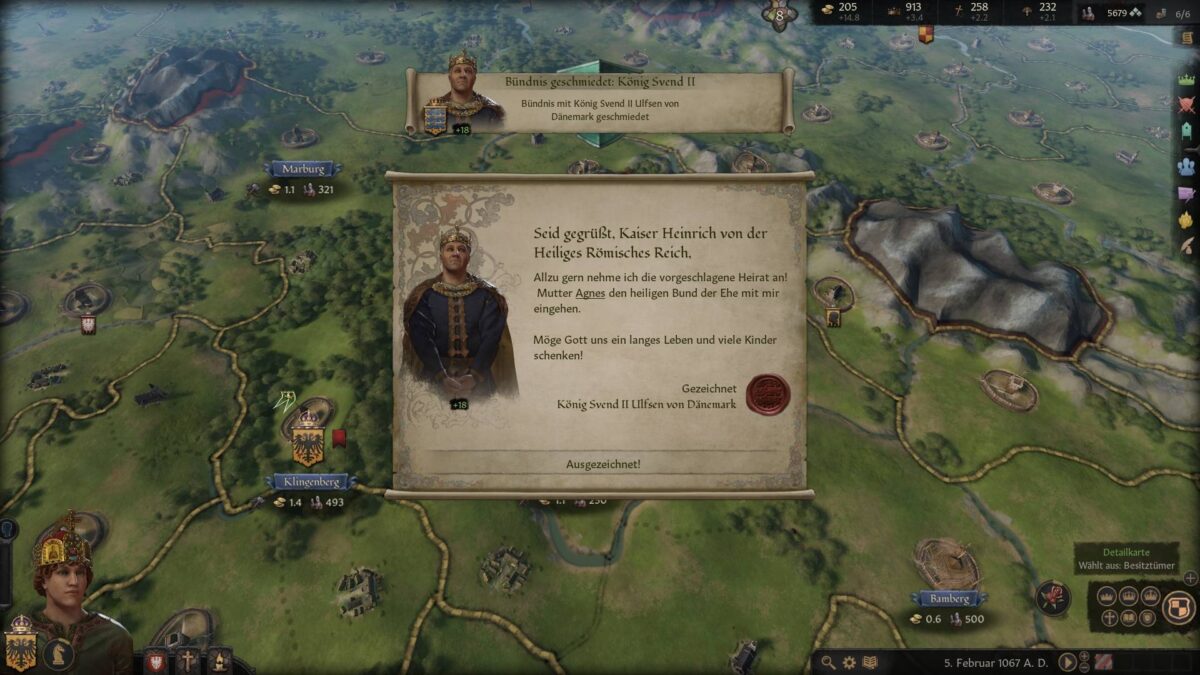
Finding a Suitable Spouse
If your ruler (or heir) is missing a spouse, the game will inform you about it explicitly. Open the character window with a left click on the ruler portrait and click on the spouse figure to open the “Find Spouse” menu. There you can see for which character the spouse is being searched for (in this example, for your ruler) and a lengthy list of possible spouses below. Depending on the focus of your search (e.g. advantageous physical traits), you can use the button with the loupe on the left above the list, to filter the search results.
- Non-adult, potential spouses can be engaged, but marriage will only be possible once both spouses have reached the age of maturity. Engagements are seen as promises of marriage and they can be broken by the other party!
For advantageous physical traits, select the “Congenital” option in the “Personal” section under “Traits” to display only potential spouses with congenital traits and then select the desired person. Use the “Relevance” drop-down menu on the left above the list to rank the candidates according to the different criteria. For example, for strong allies use the “Alliance Power” option, for marriages that bring you a lot of Prestige use the “Prestige Growth” option, and so on. If you want your ruler to marry in order to secure his succession, make sure that the future wife is not older than 35 years, to ensure that she is fertile enough to conceive.
Once you have found a suitable spouse, click on him/her in the list. A new window will show you who the liege of this character is, into which house the children resulting from the marriage will be born, what chance for offspring there is, how much Prestige both spouses will receive through the marriage, whether alliances will be formed, and how strong said alliance partner is. You can also choose whether you want to have a matrilineal marriage (in which children are born into the mother’s house – which is absolutely necessary for a female ruler character) or whether you want to force the marriage with a Hook.
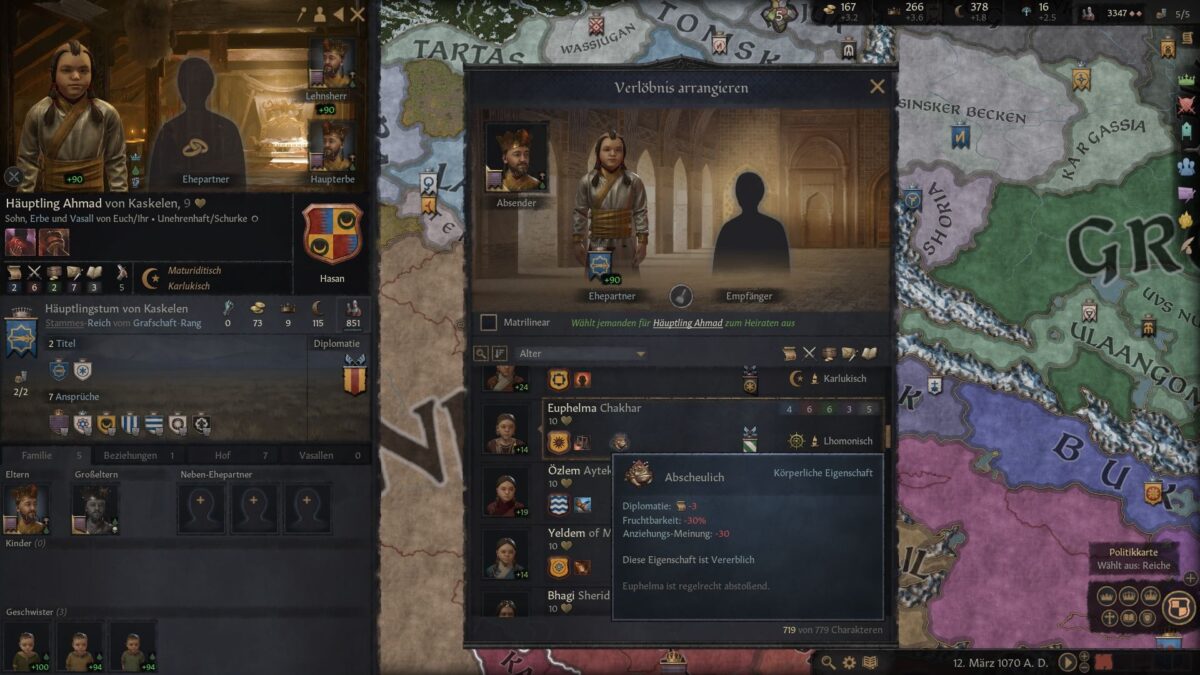
In addition to an assessment of whether the liege of the potential partner will accept the marriage proposal, there is also the “Send Proposal” button. After a short time the liege of the potential partner will contact you and you will be able to get your ruler married. The spouse arrives at the court and from now on he or she can work for your realm.
- For characters at your court, you have two options for marriage: With “Find Spouse” you can search for a spouse outside of your court, with “Arrange Marriage” you can choose the spouse among the persons at your ruler’s court. You can get more courtiers through decisions such as “Invite champions”, “Invite claimants”, “Find a doctor”, etc.
How to have a Happy Marriage
To ensure that your spouse supports your ruler character in the set goals, a high Opinion value is advantageous. In addition, you prevent your wife or husband from joining schemes against your ruler – after all, those who are happy do not want to see their spouse die immediately!
Improving the Relationship to your Spouse
- Send a gift: If your ruler has sufficiently filled gold chests, a gift is a good start for positive relationship values. Improve the effect of gifts additionally by the perk “Thoughtful” (Diplomacy lifestyle, Diplomat tree) by 100 percent!
- Marital Loyalty: Do not get lost in extramarital affairs. If these become known, this will cause significant deductions in the opinion of the spouse!
- “Loyalty and Respect” perk (Martial/Gallant): Increases spouse’s opinion by +50, skill values are increased by +25 percent through spouse council tasks.
- Sway scheme: Gradually increases the spouse’s opinion of your ruler, as long as you successfully accomplish the occurring events, that are part of the scheme.
- Deciding in favor of the spouse: If you receive events in the course of the ruler-character life where you can decide in favor of the ruler-spouse (and against vassals, friends, other family members), supporting the spouse will boost the opinion value.
- Romance scheme: If you have the opportunity to start a romance scheme that is targeted at your spouse, you should definitely do so. If the romance scheme is successful, the spouse can become a soul mate, which significantly increases the opinion. Improve the effect of romance schemes with the perk “Courtship” (Martial Lifestyle, Gallant perk tree).
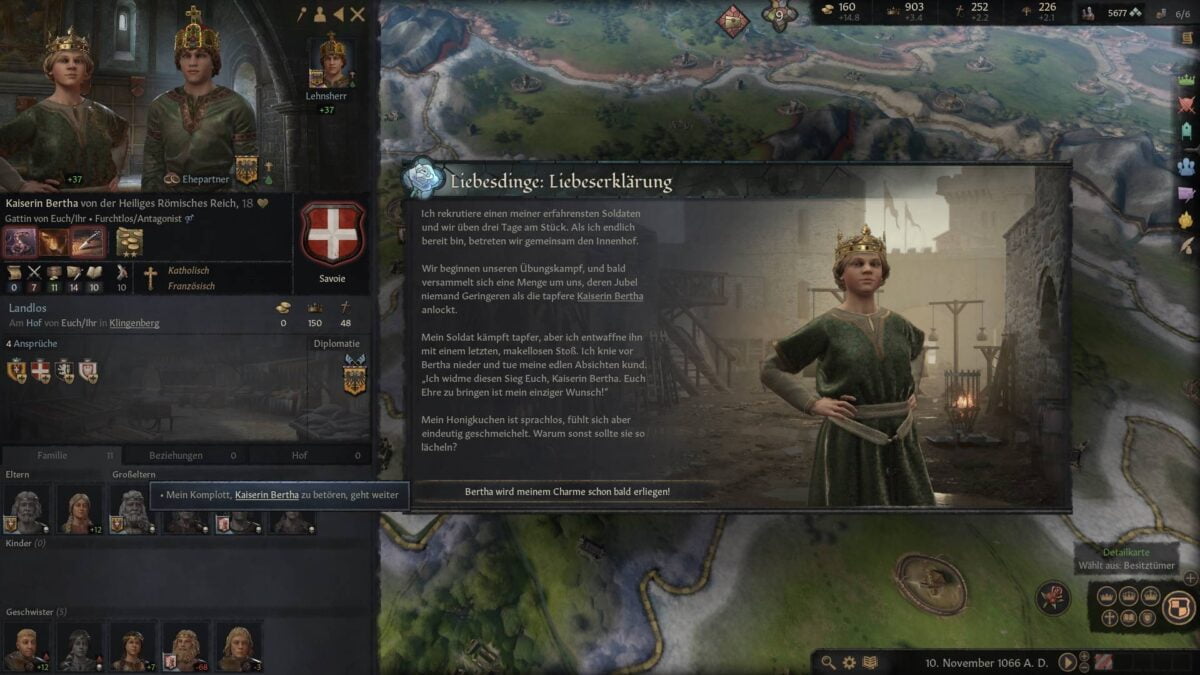
Ending a Marriage
If your marriage no longer suits you, it depends greatly on your Faith as to how you can end it. Christian religions, for example, do not allow divorce, but others do. Click on the faith icon (center right, next to your ruler’s portrait, bottom left on the map overview) and look at the marriage doctrines of the current faith. You can dismiss concubines at any time, but you must divorce secondary spouses as well.
Divorce Options in Crusader Kings 3
- Disallowed: In this case, only death can bring a married couple apart.
- Must be Approved: Characters may divorce their spouse if the Spiritual Head of Faith approves (or the House Head if there is no clerical Head of Faith)
- Always Allowed: Characters may divorce from spouses at any time in exchange for Piety
If divorce is not possible, your character must, in the worst-case scenario, remain married until the partner’s death. Alternatively, you can get rid of unpleasant spouses by using a murder scheme or you can try to catch the spouse committing a crime (e.g. a murder scheme targeting another person, adultery, etc.) by using the councillor task “Find Secrets”, performed your Spymaster. Only in the case of a proven crime, a legitimate arrest with imprisonment is possible.
Always adapt your actions to the prevailing religious and criminal doctrines of your faith, in order to find a loophole for ending a marriage. In religions with permitted human sacrifices and forbidden marital unfaithfulness, for example, a caught adulterer makes one very God-pleasing sacrifice! And once you have imprisoned a criminal spouse, you can tighten the conditions of imprisonment to ruin the health of the unpleasant partner permanently and maybe even fatally …
- If you can’t find a loophole for a divorce (or a way to get rid of your partner), you can also try to reform your religion and introduce doctrines that suit your needs. More on this in the “Religion” section.
Skill Values and How to Increase Them
In this section
Every character in Crusader Kings 3 is defined by his or her skill values (main values) in addition to descent, education, rank and traits. The tenet is: The higher the value in Learning, Diplomacy, Martial, Intrigue and Stewardship, the better the character will perform in all activities that require the respective value.
| Value Thresholds | Grading |
|---|---|
| 0-4 | Terrible |
| 5-8 | Poor |
| 9-14 | Average |
| 15/16 | Good |
| 17+ | Excellent |
A character with “excellent” values in Diplomacy, for example, has a much easier time when negotiating with neighbors, while a ruler with “poor” Martial skill values should better not lead an army. Prowess is a secondary value in addition to the five main values and describes the character’s skill in battle.
The Main Skill Values and their Influence on Gameplay
- Learning (grey)
The Learning skill value shows how well-read and wise a character is. The higher the value, the greater the monthly bonus of Piety; in addition, the crown authority of educated rulers is increased. The Learning skill value of a ruler also determines how fast his realm develops through new technologies and innovations. High Learning skill values also reduce the Prestige costs of increasing the crown authority. - Diplomacy (blue)
Diplomatic characters can more easily influence, manipulate and convince other people of their own opinion. This value directly reflects the opinion other characters have of your ruler. The higher your Diplomacy skill value is, the higher the opinion bonus will be. Even schemes that require diplomatic action are more successful with a high value (sway schemes, befriend schemes, etc.) - Martial (red)
The martial skill value determines how successfully a character leads armies into battle as a commander. In addition, a high martial skill value also increases the size of the recruitable levy contingent and the rate of levy reinforcement, i.e. how quickly the levy strength regenerates at home. - Prowess (secondary)
This value indicates how well a character performs in active combat. The higher the value, the more likely the character is to survive a battle and excel in the battle. Each point in Prowess gives a knight 100 damage ( Losses inflicted on the opponent) and 10 Toughness (how much damage a fighter can take in battle before it counts as a loss). - Intrigue (purple)
Characters skilled in Intrigue have a higher chance of success in executing hostile schemes and manipulating others with more devious tactics. In addition, characters with a high Intrigue skill value can defend themselves better against the schemes of others and have a better chance of exposing the schemes of others. They also have a better chance of imprisoning other people. - Stewardship (green)
Characters with a high Stewardship skill value generate higher tax amounts from their domain, which directly affects your monthly earnings. For every five points in Stewardship, the domain limit increases by one, which means that your ruler can control another domain, without having to deal with deductions in vassal opinion and efficiency for too large realms.
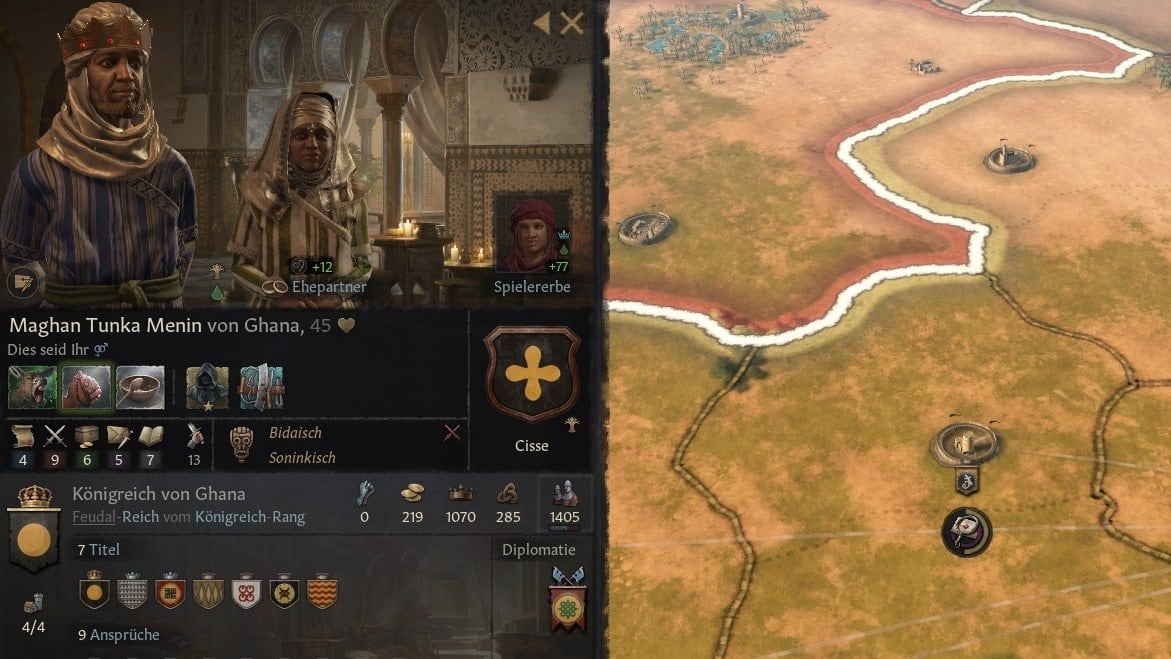
How to Increase Skill Values
Even small children have a few points in the five skill values, which are either increased or decreased by innate physical traits. The increase of skill values is indirectly determined by the choice of a suitable guardian for the child. For example, if you want to educate a child to be a commander, it is worth choosing a character as a guardian that not only has high Martial skills value, but also a high quality Martial Education trait, such as “Skilled Tactician” (3 stars) or “Brilliant Strategist” (4 stars).
In order to be able to better control a child’s education, you take over the guardianship of a child yourself and make the appropriate decisions when events occur. When the child reaches the age of maturity (18 years), the education is finished, the child receives an Education trait in addition to existing personality traits and the main skill values that have been developed during adolescence.
How to Increase the Skill Values of your (adult) Character
- Choosing the appropriate Lifestyles Focus: Whether you balance weak main values or support strong more values through Lifestyles – one of three possible focuses within a Lifestyles category gives you a +1 to +3 increase in the appropriate skill value. You can unlock further gains by choosing suitable perks from the three possible perk talent trees, provided you have collected enough Lifestyle experience. You can read more about this in the “Lifestyle” section.
- Skilling Lifestyle perk trees to the maximum: In each of the three perk trees of a Lifestyle category, the last perk you unlock, rewards you with an additional Lifestyle trait. Most of these traits reward your investment of Lifestyle experience points with additional skill value bonuses.
- Making the right decisions when events occur: Some events that happen to your character in the course of its life, give you a chance to increase the main value associated with them. If the decision is successful, you will immediately receive the respective increase.
- Involve spouses in the government: If your ruler is married, you can assign a suitable task to your spouse in the drop-down menu “Help Ruler”. Depending on the values of the spouse, your ruler will be given a share of the existing value. How much “Extra” your ruler gets, is revealed to you in advance, so you can choose the best bonus.
Lifestyles in Crusader Kings 3
In accordance with the five skill values Learning, Diplomacy, Martial, Intrigue and Stewardship, you decide which of the five types of Lifestyles your ruler character should follow. A lifestyle not only adds lifestyle-specific events to a character’s life, but also allows you to earn Lifestyle experience points through choices made based on the Lifestyle.
By selecting one of three possible focuses within your chosen Lifestyle, you increase your skill values directly and also receive additional bonuses. Focuses can be changed every 5 years within the Lifestyle category.
How to get Lifestyle Experience Points
- Monthly Passive Gaining of Experience: Depending on the traits and focus you choose, your character will automatically generate a certain amount of Lifestyle Experience Points per month. Depending on the training you have received, you will also gain extra Lifestyle Experience.
- Chosen Even Decisions: During Events, you will be rewarded with a certain amount of Lifestyle experience points, for making certain decisions. These decisions are in line with your Lifestyle, but do not have to match your character’s personality traits. You will have to decide whether the expected stress is worth the amount of experience points you could gain.
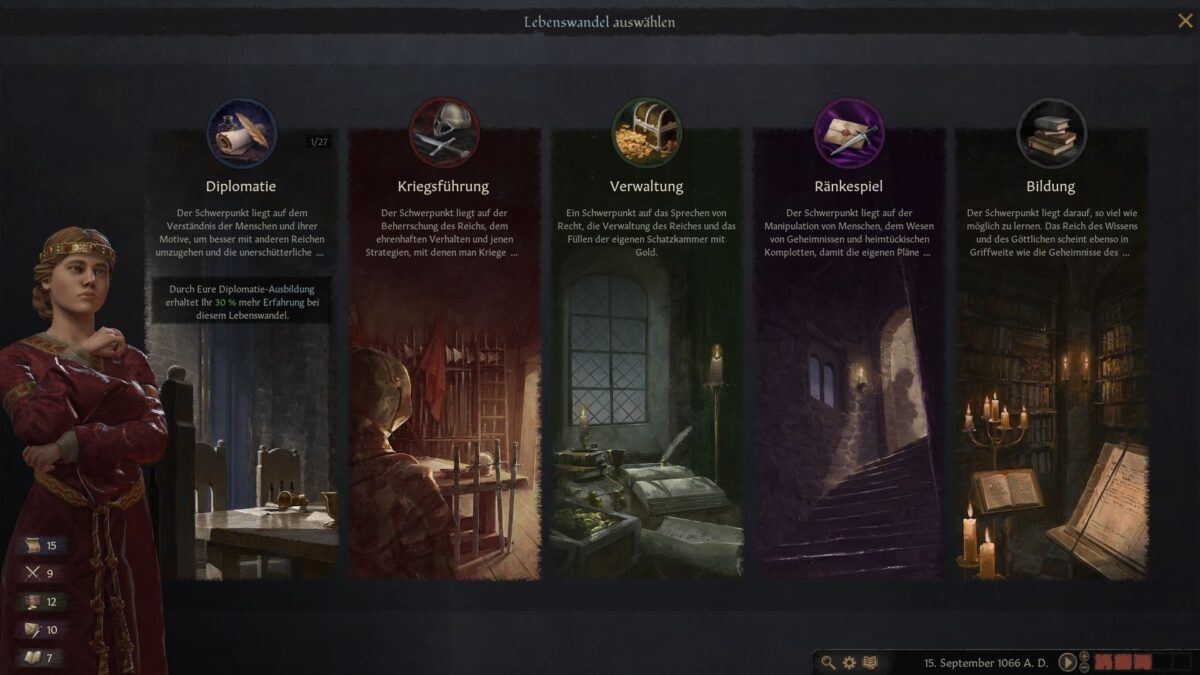
Once you have collected enough Lifestyle points, you will unlock various perks in one of three Lifestyle paths, with which you increase your skill values, gain new options for action, and a Lifestyle trait at the end of each perk tree. Perks can be freely distributed within the three trees, depending on your progress. However, we recommend unlocking one tree completely to get the maximum effect, before you start skilling perks of other trees.
- Perks can be reset once during a characters life with the “Reset Perks” option. The character will receive 120 Stress points simultaneously, i.e. the character will rise by at least one Stress Level.
You cannot change the Lifestyle category any longer, after you have made your choice! You can find guidelines for choosing the right Lifestyle in the section “Which Lifestyle suits my ruler“, further down in this Crusader Kings 3 Guide.
Learning Lifestyle
With the Learning Lifestyle, characters can lead a long and healthy life, gain more Piety and receive additional bonuses through a religion-based life.
Selectable Focuses in the Learning Lifestyle:
- Medicine: +1 Learning, Health: Small Boost, Learning Experience: 25 per Month
- Scholarship: +3 Learning, Development Growth: +15% per Month, Learning Experience: 25 per Month
- Theology: +1 Learning, +1 Monthly Piety, Learning Experience: 25 per Month
Whole of Body Perks
- Anatomical Studies: Recruiting Court Physicians costs less, treatments by Court Physicians produce better results
- Carefree: -20% Stress Gain
Mental Resilience: +3 Years Time between Mental Breaks - Restraint: The “Embrace Celibacy” and “Abandon Celibacy” decisions become available
Know Thyself: Game alerts you, when death through natural causes is only 1 year away - Wash Your Hands: Lower probability of illness, lower probability of courtiers contracting diseases
Iron Constitution: +30% Disease Resistance (Fertility), Disease Resistance (Health): Massive Boost - Healthy: Health: Medium Boost
- Whole of Body: Character gains the “Whole of Body” Trait (+20% Fertility, Health: Medium Boost, −20% Stress Gain)
Scholar Perks
- Pedagogy: Wards can gain additional Skills and become friends of the character.
Open-Minded: +15 Different Culture Opinion, ignore Negative Culture Opinion
Apostate: +15 Different Faith Opinion, -75% Faith Conversion Cost - Scientific: +35% Cultural Fascination Progress
Planned Cultivation: +20% Increase Development in Country Efficiency
Scholarly Circles: +2 Learning per Level of Devotion - Learn on the Job: 20% of your Councilors’ primary Skill values are added to your characters Skills
- Sanctioned Loopholes: Unlocks the Buy Claim Interaction
- Scholar: Gain the trait “Scholar” (+5 Learning, +10 Hostile Scheme Success Chance, +10 Personal Scheme Success Chance, +15% Monthly Development Growth)
Theologian Perks
- Faithful: +10 Clergy Opinion
- Zealous Proselytizer: +25% Convert Faith in County councillor task progress speed
Religious Icon: Time needed to convert a county is no longer increased, if its faith has a higher Fervor than the ruler’s faith
Prophet: +1% Monthly Piety per Knight, and -50% Faith Creation and Reformation Cost - Clerical Justifications: +20% Religious Relations Decision Efficiency
Church and State: +50 Realm Priest Opinion
Radiant: +100% Level of Devotion Impact - Defender of Faith: -25% Tyranny Gain, +5 Same Faith Opinion
- Theologian: Gain the trait “Theologian” (+3 Learning, +20% Monthly Piety)
Diplomacy Lifestyle
The Diplomacy Lifestyle is suitable for rulers who want to increase their Prestige income, maintain the goodwill of friends and family, and win more forms of Claims and Casus Bellis for an expansionist style of rule.
Selectable Focuses in the Diplomacy Lifestyle:
- Foreign Affairs: +3 Diplomacy, Diplomacy Experience: 25 per Month
- Majesty: +1 Diplomacy, +1 Monthly Prestige, Diplomacy Experience: 25 per Month
- Family: +2 Diplomacy, +20% Fertility, Diplomacy Experience: 25 per Month
Diplomat Perks
- Thoughtful: +100% Opinion Gain from Send Gift
- Ducal Conquest: -20% Title Creation Cost
Forced Vassalage: Unlocks the Vassalize Casus Belli - Adaptive Tradition: +25% Foreign Affairs Decision Effectiveness
Flexible Truces: Shorter Truces and no Prestige penalty for breaking Truces - Defensive Negotiations: +15 Fellow Vassal Opinion
- +15 Independent Ruler Opinion, can propose Alliance without a Marriage
Embassies: +1 Diplomacy per active Alliance - Accomplished Forger: +75% Fabricate Claim on County Decision Speed
- Diplomat: Gain the trait “Diplomat”: (+3 Diplomacy, +20 Independent Ruler Opinion, +25% Power for Personal Schemes)
August Perks
- Benevolent Intent: +30% Sway Scheme Power
Inspiring Rule: +5% Monthly Prestige per Powerful Vassal on the Council - Firm Hand: +1% Monthly Prestige per Dread
Praetorian Guard: +2% Monthly Prestige per Knight - True Ruler: +25 Offer Vassalization Acceptance
- Writing History: Unlock the Commission Epic Decision
- A Life of Glory: +100% Level of Fame impact
- Dignitas: +1 Diplomacy per Level of Fame
- August: Gain the trait “August” (+2 Diplomacy, +1 Martial, +1 Monthly Prestige)
Family Hierarch Perk
- Befriend: Unlocks the Befriend Scheme
Confidants: -5% Stress Gain per Friend
Flatterer: +30% Befriend Scheme Power - Groomed to Rule: The character’s children receive +1 to +3 skill points
Heart of the Family: +15 Close Family Opinion
Thicker than Water: +25% Personal Scheme Success Chance against family members - Friendly Counsel: Each friend relationship gives 2 random skill points
- Sound Foundations: Each living Child gives +1 random skill points
- Patriarch / Matriarch: Charakter gains the trait Patriarch / Matriarch: (+10 House Opinion +15 Close Family Opinion +20% Fertility +20% Stress Loss)
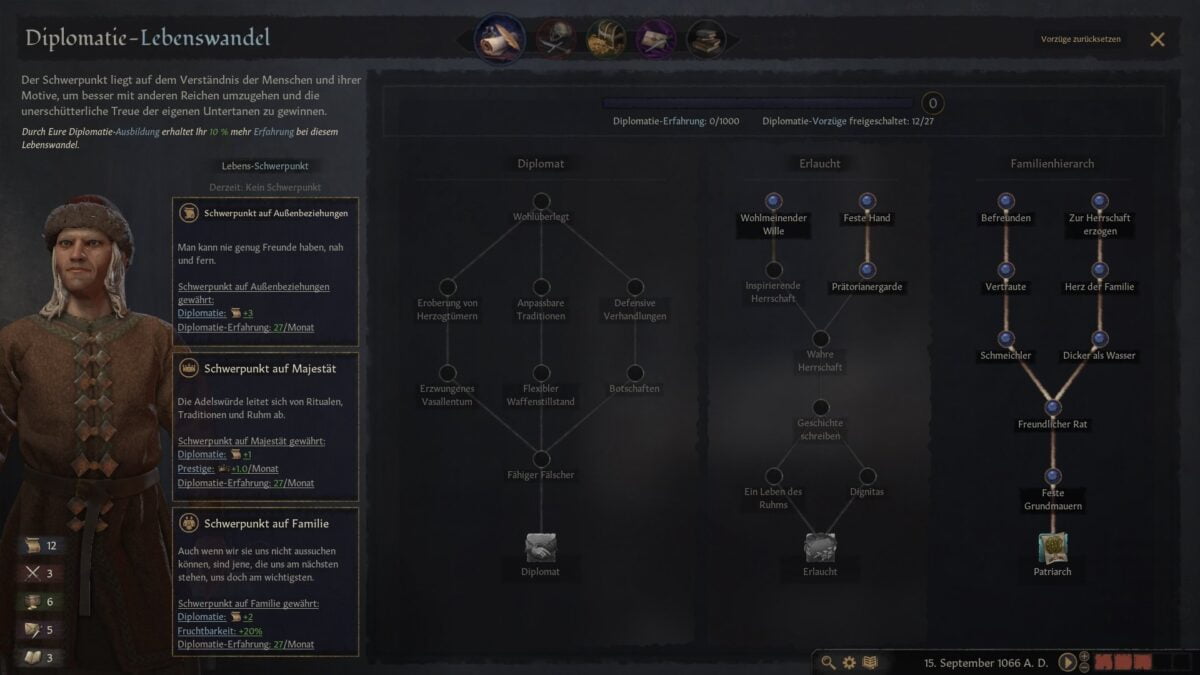
Martial Lifestyle
Use the Martial Lifestyle, if you want to improve your ruler’s chances of winning Wars, improve your ruler’s Men-at-Arms and knights, or if you want to increase your control in the domain.
Selectable Focuses in the Martial Lifestyle:
- Strategy: +3 Martial, Martial Experience: 25 per Month
- Authority: +1 Martial, +20% Dread Gain, +0.3 Monthly Control, Martial Experience: 25 per Month
- Chivalry: +3 Prowess, +10 Attraction Opinion, +5 Advantage, Martial Experience: 25 per Month
Strategist Perks
- Bellum Justum: -50% Casus Belli Cost
- Parthian Tactics: +30% Light/Heavy Cavalry Toughness, +20% Light/Heavy Cavalry Pursuit, +20% Skirmisher Damage, +10% Skirmisher Toughness
Envelopment: +25% Men-at-Arms Counter Efficiency - Organized March: +15% Movement Speed, +5 Screen for Archer, Heavy Infantry, Pikeman and Skirmisher
Hit and Run: -25% Retreat Losses, +15% Heavy Infantry Damage, 15% Heavy Infantry Toughness, +30% Archer Damage, +30% Spearmen Toughness - Engineered for Destruction: +25% Naval Speed, +40% Siege Weapon Effectiveness
Living Off the Land: +25% Raid Speed, +200% Supply Capacity - Sappers: +0.1 Siege Progress for Archer, Heavy Infantry, Pikeman and Skirmisher
- Strategist: Character gains the “Strategist” trait (+1 Diplomacy, +3 Martial, +25% Enemy Fatal Casualties, Cross water without penalty)
Overseer Perks
- Serve the Crown: +15 Natural Dread, +0.3 Monthly Control Growth
- A Man’s Home: +5 Controlled Territory Defender Advantage
Enduring Hardships: +1 Fort Level, Enemy Occupations do not lower Control
Prepared Conscription: -15% Army Maintenance, +100% Friendly Territory Levy Reinforcement Rate - Strict Organization: +20% Progress Gain for Increase Control in Country councillor task
Hard Rule: +20% Dread Gain, +50% Siege Progress against Revolts, +20 Faction Military Power Threshold for vassals
Soldiers of Lesser Fortune: -30% Mercenary Hire Cost - Absolute Control: Enables absolute control for counties
- Overseer: Character gains the “Overseer” Trait (+2 Martial, +2 Stewardship, +50% Monthly Control Growth)
Gallant Perks
- Stalwart Leader: +4 Prowess, Reduced risks for Commanders of Armies that lead an army into battle
- Courtship: +30% Romance and Elope Scheme Power and +30% Romance and Elope Scheme Success Chance
Promising Prospects: +50 Marriage Acceptance, +25 Marriage Acceptance for Close Family and Extended Family
Loyalty and Respect: +50 Spouse Opinion, +25% Skills from Spouse Councilor Tasks - Chivalric Dominance: +75% Knight Effectiveness
Never Back Down: -20% Friendly Fatal Casualties, +5 Advantage
Kingsguard: +4 Number of Knights - Peacemaker: +10 Peace Acceptance
- Gallant: Character gains the “Gallant” Trait: (+2 Martial, +4 Prowess, +20% Monthly Prestige, +20 Attraction Opinion)
Intrigue Lifestyle
With the Intrigue Lifestyle, your character gains more scheming options, and increases the chances of a successful completion of Schemes, gains terror and learns to manipulate and seduce other people for his own purposes.
Selectable Focuses in the Intrigue Lifestyle:
- Skulduggery: +3 Intrigue, +10 Agent Acceptance. Intrigue Experience: 25 per Month
- Temptation: +20% Fertility, +10 Attraction Opinion, +20% Seduction Scheme Power, Intrigue Experience: 25 per Month
- Intimidation: +2 Intrigue, +30.0 Natural Dread, Intrigue Experience: 25 per Month
Schemer Perks
- Truth is Relative: Enables the Fabricate Hook Scheme, Find Secrets councillor task can also fabricate Hooks
- Digging for Dirt: +25% Find Secrets councillor task Progress Speed
Kidnapper: Unlocks the Abduction Scheme - Court of Shadows: +50% Disrupt Schemes counillor task effectiveness
Prepared for Anything: -25 Enemy Hostile Scheme Success Chance, -10 Enemy Hostile Scheme Success Effectivness against own Courtiers - Swift Execution: +30% Murder Scheme Power
A Job Done Right: +25 Hostile Scheme Success Chance - Twice Schemed: +1 Max Hostile Schemes
- Schemer: Character gains the “Schemer” trait (+5 Intrigue, +25% Hostile Scheme Power)
Seducer Perks
- Like Weeds in a Garden: +30% Fertility
Unshackled Lust: Removes the Attraction penalty from Seduction Schemes
Subtle Desire: Removes the Tier difference penalty from Seduction Schemes, Removes the Incestuous penalty from Seduction Schemes targeting characters over 19 years old
Mortal Adoration: The character’s affairs are less likely to join murder schemes against the character, affairs are more likely to save the character from assassination attempts - Enticing Opportunity: +30% Seduction Scheme Power
Home Advantage: +50% Seduction Scheme Success Chance against own courtiers and guests
Graceful Recovery: Can no longer Critically Fail Seduction Schemes
Smooth Operator: +25% Seduction Scheme Success Chance - Seducer: Character gains the “Seducer” trait (+3 Intrigue, +20% Fertility, +40 Attraction Opinion)
Torturer Perks
- Dark insights: 50% chance to gain 1 Intrigue or 1 Prowess when torturing someone (Max 5 each)
Divine Retribution: No longer lose Piety or Clergy Opinion, when the character is torturing or executing someone - Dreadful: +30% Dread Gain
Thriving in Chaos: +4 Martial and +4 Intrigue per Stress level, +6 Prowess per Stress level - Malice Implicit: +0.5 Dread Gain per Tyranny
- Fear Tax: +15% Intimidated Vassal Tax (Contribution) and +15 Levy (Contribution), +30% Terrified Vassal Tax (Contribution) and 30% Levy (Contribution)
- Forever Infamous: -1000% Dread Decay
- Prison-Feudal Complex: +50% Imprison Chance
- Torturer: Characters gain the “Torturer” trait (+4 Prowess, +50% Dread gain, +25% Hostile Scheme Resistance, +10% Levy Size)
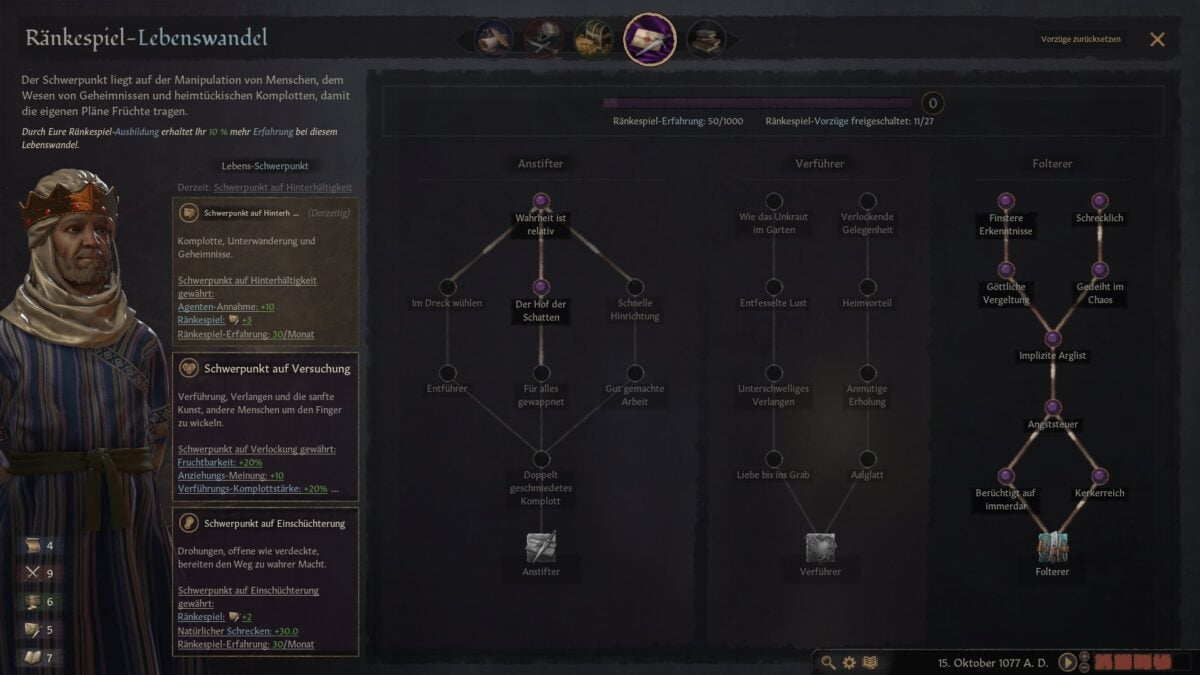
Stewardship Lifestyle
The Stewardship Lifestyle allows rulers to improve and manage their domain more efficiently, get along better with lieges and Vassals, and helps to make a lot of money.
Selectable Focuses in the Stewardship Lifestyle:
- Wealth: +10% Monthly Income, Stewardship Experience: 25 per Month
- Domain: +3 Stewardship, Stewardship Experience: 25 per Month
- Duty: +1 Stewardship, +20 Courtier and Guest Opinion, -5 Enemy Agent Acceptance, Stewardship Experience: 25 per Month
Avaricious Perks
- Golden Obligations: You can demand payment for Hooks
- Heregeld: +10% Vassal Tax (Contribution)
Detailed Ledgers: +20 Republican Ruler Opinion, +15% Republican Tax (Contribution) - War Profiteer: +10% Monthly Income while at War
Fearful Troops: -0.50% Men-at-Arms Maintenance per Dread - This is MY Domain: Unlock the Extort Subjects Decision
Golden Aplomb: +10% Monthly Income per Stress Level - At Any Cost: Unlock the Sell Titles Decision
- Avaricious: Character gains the “Avaricious” trait (+2 Stewardship +15% Holding Taxes)
Architect Perks
- Tax Man: +25% Collect Taxes councillor task effectiveness
Defensive Measures: +1 Fort Level, +20% Garrison Size
Organized Muster Rolls: +100% Levy Reinforcement Rate - Cutting Cornerstones: -5% Gold, Piety, and Prestige Construction Cost for Buildings and -5% Gold, Piety, and Prestige Construction Cost for Holdings
Professional Workforce: -30% Building and -30% Holding Construction Time
Centralization: +0.3 Monthly Development Growth in Realm Capital - Popular Figurehead: +50 Popular Opinion
- Divided Attention: +2 Domain Limit
- Architect: Character gains the “Architect” trait (+2 Stewardship, −15% Building Construction Time, −15% Holding Construction Time, −10% Building and Holding Gold Cost)
Administrator Perks
- Meritokratie: Character can use Claim Throne against the liege
- Chains of Loyalty: +25% Domestic Affairs councillor task efficiency
Likable: 10 Direct Vassal Opinion, 20 Liege Opinion
Positions of Power: 20 Counillor Opinion - Large Levies: +20% Vassal Levy (Contribution)
Soon Forgiven: -0.15 Monthly Tyranny
Toe the Line: Vassals are less likely to join Independence Factions - Honored to Serve: +20% Powerful Vassal Councillor Tax (Contribution) and +20% Powerful Vassal Councillor Levy (Contribution)
- Administrator: Character gains the “Administrator” trait (+1 Diplomacy, +3 Stewardship, +5 Vassal Opinion)
Which Lifestyle Suits my Ruler?
Given so many possibilities, you should make the choice of a certain Lifestyle dependent on the situation you find yourself in. Look at your character’s Skill Values and general situation, and make your decision based on them.
Important questions for the choice of a Lifestyle
- Are there clear strengths (values above 15) or clear weaknesses (values below 5) among your ruler’s skill values?
If you have great strengths, you could enhance them by choosing the right Lifestyle. Weaknesses, on the other hand, can be compensated for by choosing a different lifestyle that allows you to increase the value. A character with a high Intrigue skill value could secure his dominance through the appropriate lifestyle and either make others afraid (Intrigue/Torturer), bring disagreeable competitors into line through seduction (Intrigue/Seducer) or simply blackmail them (Intrigue/Schemer). An uneducated ruler slows down the development of his realm, so mitigate this through a Lifestyle that makes him a scholar (Learning/Scholar) – and so on. - Do you want to expand your dominion or protect it against strong neighbors?
If you own only a small amount of land, there is no way around war against your neighbors – therefore you should strengthen your troops in battle and reduce the costs for declaration of war (Martial/Strategist). With the Stewardship Lifestyle, you will be able to rule a large realm more successfully. Thanks to the Diplomacy Lifestyle, you will gain more influence and form alliances more easily with other rulers, who will support you in your fight against greedy neighbors. - Do you want to draw the clergy to your side or even reform your faith?
In order to keep your church vassals and the Realm Priest on course, you will dedicate yourself to a pious life (Learning/Theologian) and, in addition, you will reduce all costs for the reformation of the faith. As a motivated hobby torturer (Intrigue/Torturer), you also unlock the “Divine Retribution” perk, where the clergy no longer cares whether you mistreat prisoners in your dungeon. The junior tyrant will be delighted! - What training has the character received?
Depending on your ruler character’s training, he will receive more Lifestyle experience points per month for the lifestyle matching the basic skill value of the training. If you can’t make up your mind, a fast lifestyle with unlocked perks could be an interesting game alternative. - Do you have to keep a large family or many powerful vassals in check?
Especially with many conflicting interests and generally bad opinion values in the environment around your ruler-character (which can already be the case due to unfavorable traits), it is worth either intimidating your environment (Intrigue/Torturer) or to passively raise the opinion of family members (Diplomacy/Family Hierarch) and subjects (Stewardship/Administrator). Otherwise, you’ll be forging schemes until your throne chair starts smoking, and you can’t use the personal scheme for anything other than the appeasement of your vassals and family members.
Traits in Crusader Kings 3
Each person in your Crusader Kings 3 game is defined by their different traits. They determine not only how Skill values are increased or decreased, but also how other people fundamentally react to them: Chaste contemporaries, for example, are much worse at dealing with lustful personalities, deceitful rulers look down on honest ones, while modest people do not like arrogant ones, and so on.
Characters can Acquire These Traits
- Education Traits
After completing education as a child and teenager, a character receives an educational trait, the quality of which enhances skill values. The higher the quality of the educational trait, the greater the skill value increase. - Commander Traits
With growing experience on the battlefield, through events, and successful training by a marshal, individuals receive one or more commander traits, that grant certain combat advantages (such as crossing waters without penalty). - Health Traits
If a person suffers from a debilitating or permanently damaging disease, this is reflected in corresponding extra traits. If the Court Physician succeeds in curing an illness, this trait disappears again. - Physical Traits
Diese bestimmen den körperlichen Zustand der jeweiligen Person und körperliche Vorzüge (wie Schönheit, robuster Körperbau etc.) oder Nachteile (Klumpfuß, Stottern usw.) sein. Körperliche Vorzüge oder Nachteile sind oft vererblich. - Lifestyle Traits
Depending on their chosen Lifestyle, individuals can unlock special perks, increase Skill values and change the way others interact with them. These traits are not only unlocked through distributed Lifestyle points, but also through decisions and interactions, which are related to Lifestyle events. - Personality Traits
This type of trait determines how a person views the world and how they will most likely interact with it. Every person has at least three personality traits, which can change over the course of a lifetime as a result of certain decisions and experienced events. If a person acts against his or her own personality traits, his or her stress level rises. - Fame Traits
A Fame trait is given to persons after they have accomplished a particularly outstanding deed or after their dark secrets have been revealed. However, some Fame traits are simply linked to the person’s birth circumstances. - Improvable Traits
In the course of event chains, a character acquires a basic trait that can be upgraded to the maximum through successful decisions and that grants strong effects. - Other Traits
These traits result from what people do to other people or what happens to them in addition to regular events. These traits describe a status, physical characteristics or how the person is seen by others.
Inheritance
If you want to breed specific physical traits into your dynasty, you should select persons with the desired trait when searching for a suitable Spouse. If you want your dynasty to become a little more attractive in general, it is worthwhile to look for well-shaped partners. For more brains, look for smart or intelligent partners. If both parents have an identical trait, the probability is higher that it can be inherited by descendants or even develop into the next stronger trait variant. Caution: This also applies to negative traits with skill value deductions!
- If you couple closely related characters to each other, you have a good chance of obtaining traits that were available in the dynasty, but here, inbreeding threatens to bring enormous disadvantages. Be careful not to arrange such marriages in every generation!
Certain religions allow (mainly male) characters to choose concubines or secondary marriage partners. So, if your ruler is already married, use the “Find Spouse” option in the Family View to select a woman with a desired trait as an additional partner among the concubines/sub-spouses. Children born illegitimately may start with a slight penalty due to their lower birth, but can continue your dynasty if regular heirs are no longer available.
Education Traits (List)
As a child grows up, it receives changing childhood traits that indicate a certain development. When a child reaches the age of six years at the court of your ruler, it is time for courtly education. You determine which Skills your child should learn or improve by choosing a focus of education. Click on the round book icon in the child character window on the left below the character portrait: Depending on the childhood traits you received, a certain educational focus is recommended more than another; this is indicated by the hints in the window itself.
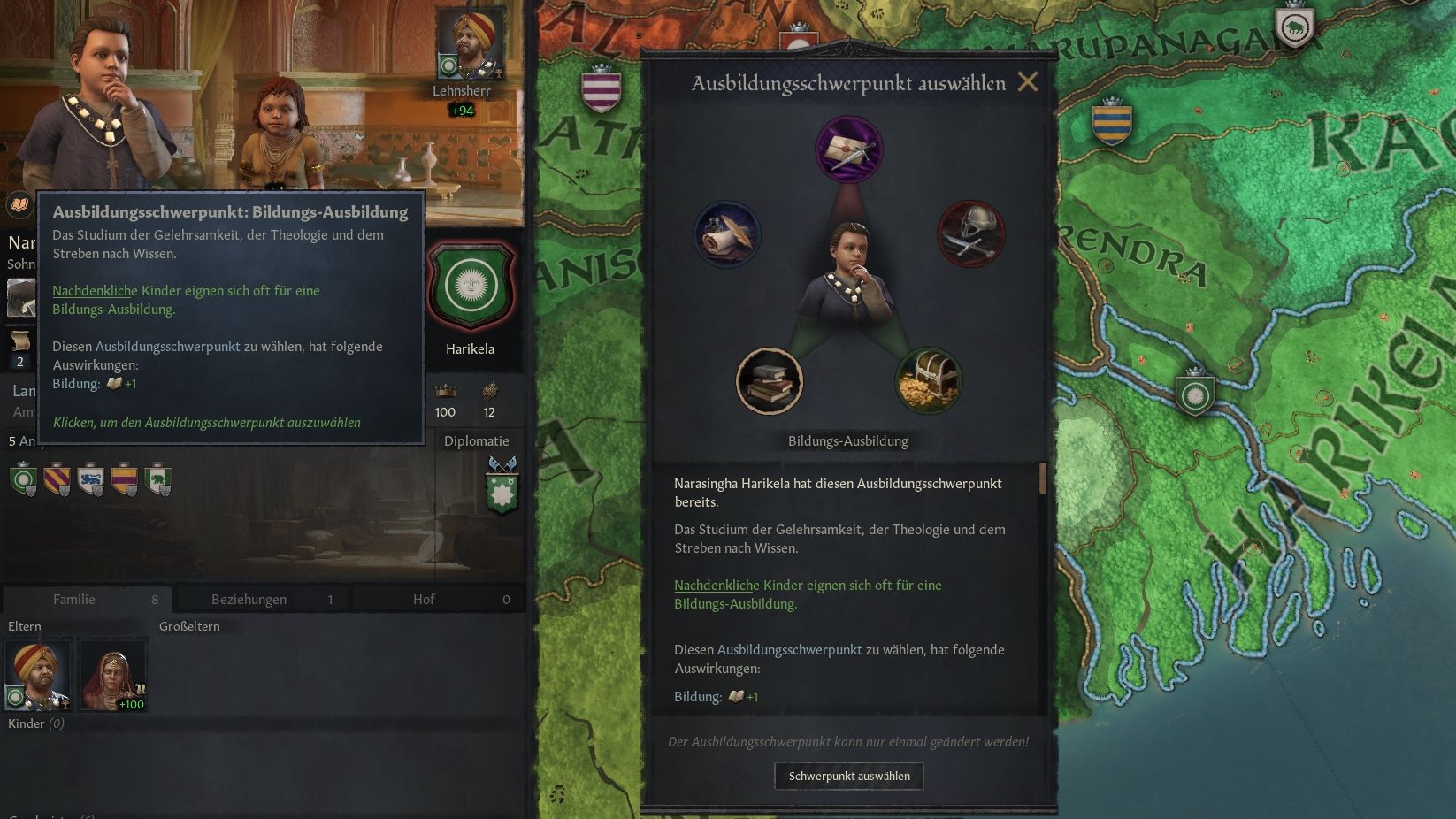
In addition, you also need a suitable Guardian for the growing child, who ideally has a high-quality education and helpful personality traits. The three personality traits that your child develops between the ages of 6 and 18 are largely determined by the behavior of the Guardian.
- Current guardianships or Wards of a person can be seen in the “Relationships” tab on the character overview page.
Of course, you can let your heir be educated by a lazy, gluttonous fool, but perhaps an intelligent, hard-working person with a well-balanced temperament would be the better choice for a future ruler?
You can use your current ruler as a guardian, if you want to keep full control over a child’s education. From time to time, you will receive events as a guardian, whose decision options either develop or replace personality traits of the child. This way, you will raise a young person with your desired characteristics as your heir. If the child reaches the age of maturity, the training relationship ends and the child receives a education trait, which matches the focus of the education.
Overview of all Education Traits
| Education Trait | Stars | Skill Value Bonus | Lifestyle Bonus |
|---|---|---|---|
| Conscientious Scribe | 1 | + 2 Learning | +10% Learning |
| Amateurish Plotter | 1 | + 2 Intrigue | +10% Intrigue |
| Naive Appeaser | 1 | + 2 Diplomacy | +10% Diplomacy |
| Misguided Warrior | 1 | + 2 Martial | +10% Martial |
| Indulgent Wastrel | 1 | + 2 Stewardship | + 10% Stewardship |
| Adequate Bargainer | 2 | + 4 Diplomacy | +20% Diplomacy |
| Insightful Thinker | 2 | + 4 Learning | +20% Learning |
| Flamboyant Trickster | 2 | + 4 Intrigue | +20% Intrigue |
| Thrifty Clerk | 2 | + 4 Stewardship | +20% Stewardship |
| Tough Soldier | 2 | + 4 Martial | +20% Martial |
| Charismatic Negotiator | 3 | + 6 Diplomacy | +30% Diplomacy |
| Skilled Tactician | 3 | + 6 Martial | +30% Martial |
| Astute Intellectual | 3 | + 6 Learning | +30% Learning |
| Intricate Webweaver | 3 | + 6 Intrigue | +30% Intrigue |
| Fortune Builder | 3 | + 6 Stewardship | +30% Stewardship |
| Brilliant Strategist | 4 | + 8 Martial | +40% Martial |
| Elusive Shadow | 4 | + 8 Intrigue | +40% Intrigue |
| Grey Eminence | 4 | + 8 Diplomacy | +40% Diplomacy |
| Midas Touched | 4 | + 8 Stewardship | +40% Stewardship |
| Mastermind Philosopher | 4 | + 8 Learning | +40% Learning |
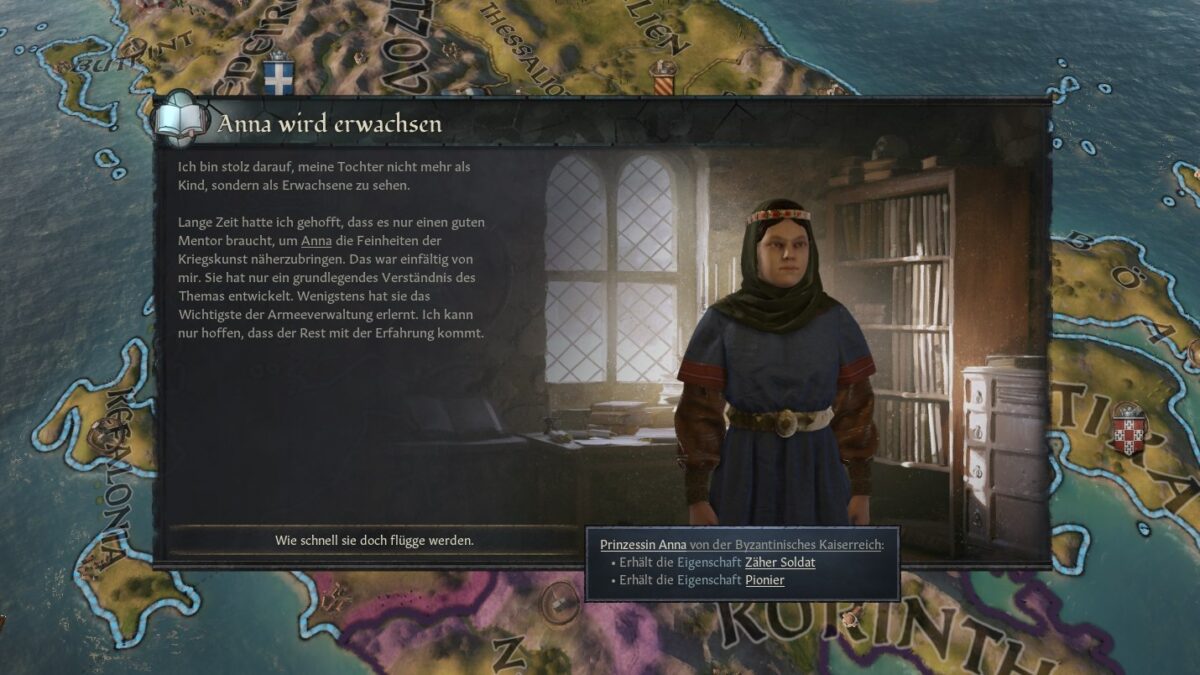
Commander Traits (List)
While all other traits are always useful, commander traits are only important in wartime situations – whether you are at War with a neighbor, roaming the countryside as a raider, or defending yourself against attackers or insurgents. Once a character has been given commander traits, he or she will receive unique bonuses such as faster mobility, reduced siege periods, or higher enemy fatal casualties in battle.
Commander traits are given to your characters through the following actions:
- Active Warfare: Your character excels in battle and survives it. The commander traits you receive are always related to what your character has experienced in battle (for example, “Jungle Stalker” for successful warfare in the jungle).
- Training by the Marshal: If a member of your dynasty is a commander, knight, champion, or similar, you can assign the Marshal the task “Train Commanders”. The Marshal then devotes his time to train all commanders at court, allowing dynasty members to receive improved combat values as well as new commander traits.
- Martial Lifestyle: If your character is dedicated to a Martial Lifestyle, the chances of events related to warfare are greater. Possible outcomes of successful event choices include the acquisition of commander traits.
Overview of all Commander Traits
| Commander Traits | Effects |
|---|---|
| Aggressive Attacker | +25% Enemy Fatal Casualties |
| Jungle Stalker | +6 Advantage in junges, −50% Attrition in jungles, No Supply Limit Penalty in jungles |
| Open Terrain Expert | +4 Advantage in Farmlands, Plains and Steppe terrain |
| Rough Terrain Expert | +4 Advantage in Hills, Mountains and Wetlands terrain |
| Flexible Leader | −50% Enemy Defensive Advantage |
| Forder | No penalties when loading by ship and attacking over straits and rivers |
| Holy Warrior | +10 Faith Hostility Advantage |
| Reckless | +6 Maximum Battle Roll, −4 Minimum Battle Roll |
| Logistician | +100% Supply Duration |
| Organizer | +25% Movement Speed, −20% Retreat Losses |
| Military Engineer | −30% Siege Phase Time |
| Reaver | +100% Raid Speed, −75% Hostile County Attrition |
| Unyielding Defender | −25% Friendly Fatal Casualties |
| Forest Fighter | +5 Advantage in Forest and Taiga |
| Desert Warrior | +5 Advantage in Desert, Desert Mountains, Drylands and Oasis terrain, No Supply Limit Penalty in deserts |
| Cautious Leader | +4 Minimum Battle Roll, −2 Maximum Battle Roll |
Health Traits (List)
Life in the Middle Ages was not only dangerous, but in most cases also not very healthy. Plague, disease and lack of medical care were no real help to people’s survival – and you face the same problems in Crusader Kings 3. Usually, only the court physician can help a character, whose health has been tarnished. The court physicians obscure therapies can be helpful – but they don’t have to be!
While certain diseases such as bubonic plague, leper or smallpox occur in epidemics, it is possible for a character to be born with a trait like “Insane” or “Sickly”. Diseases such as gout or consumption usually occur in middle or old age, while “Wounds” often result from active participation in wars, and they heal over time.
Overview of all Health Traits
| Disease | Penatly/Effect | Health | Impact on other people |
|---|---|---|---|
| Leper | -8 Prowess, -95% Fertility | Severe penalty | + 100% Dread Loss, -20 Natural Dread, -10 Opinion, -35 Attraction Opinion |
| Possessed | +10% Monthly Learning lifestyle Experience | Moderate penalty | – 10 Attraction Loss, +15 Opinion about Possessed |
| Smallpox | -2 Diplomacy, -1 Stewardship, -2 Learning, -10 Prowess, -25% Fertility | Critical penalty | + 100% Dread Loss, -15 Natural Dread, – 10 Attraction Opinion |
| Infirm | -3 Diplomacy, -3 Martial, -3 Stewardship, -3 Intrigue, -3 Learning, -6 Prowess, -30% Fertility | Severe penalty | + 100% Dread Loss, -15 Natural Dread |
| Gout Ridden | -2 Diplomacy, -1 Martial, -2 Prowess | Severe penalty | -5 Natural Dread, -15 Attraction Loss |
| Ill | -4 Prowess, -20% Fertility | Severe penalty | + 100% Dread Loss, -10 Natural Dread |
| Sickly | — | Severe penalty | + 100% Dread Loss, -20 Natural Dread |
| Cancer | -20% Fertility | Critical penalty | + 100% Dread Loss, – 15 Natural Dread |
| Lover’s Pox | Venereal disease, is inheritable | – | -5 Natural Dread, -20 Attraction Loss |
| Syphilis | -1 Diplomacy, -1 Martial, -1 Stewardship, -1 Intrigue, -1 Learning, -20% Fertility, May be inherited | Severe Penalty | + 100% Dread Loss, -20 Natural Dread, -10 Attraction Opinion |
| Pneumonia | -2 Diplomacy, -2 Martial, -2 Stewardship, -2 Intrigue, -2 Learning, -8 Prowess, -50% Fertility | Critical Penalty | +100% Dread Loss, -10 Natural Dread |
| Melancholic | -1 Diplomacy, -1 Martial, -1 Stewardship, -1 Intrigue, -10% Fertility | Moderate penalty | — |
| Bubonic Plague | -2 Diplomacy, -3 Martial, -2 Stewardship, -3 Intrigue, -2 Learning, -10 Prowess, -50% Fertility | Catastrophical penalty | + 100% Dread Loss, -30 Natural Dread, -30 Attraction Opinion |
| Pregnant | -2 Prowess | — | — |
| Severely Injured | -2 Martial, -2 Intrigue, -4 Prowess, -25% Fertility | Severe penalty | + 100% Dread Loss, -15 Natural Dread, -10 Attraction Opinon |
| Consumption | -2 Diplomacy, -1 Stewardship, -2 Intrigue, -2 Prowess | Severe penalty | + 100% Dread Loss, -10 Natural Dread, -10 Attraction Opinion |
| Typhus | -1 Diplomacy, -2 Stewardship, -2 Intrigue, -2 Learning, Fertility -20% | Critical penalty | + 100% Dread Loss, -15 Natural Dread, – 10 Attraction Opinion |
| Brutally Mauled | -4 Martial, -4 Intrigue, -8 Prowess, -75% Fertility | Catastrophical penalty | + 100% Dread Loss, – 15 Natural Dread, -20 Attraction Opinion |
| Incapable | -6 Diplomacy, -6 Martial, -6 Stewardship, -6 Intrigue, -6 Learning, -12 Prowess, -30% Fertility, Can´t conceive children | Critical penalty | + 100% Dread Loss -25 Natural Dread |
| Maimed | -2 Diplomacy, -2 Martial, -2 Stewardship, -2 Intrigue, -4 Prowess, -50% Fertility | Critical penalty | + 100% Dread Loss – 15 Natural Dread – 10 Attraction Opinion + 5 Opinion about other Maimed |
| Wounded | -1 Martial, -1 Intrigue, -2 Prowess | Severe penalty | 100% Dread Loss, -10 Natural Dread |
| Insane | +10 Opinion about insane people, +10 Scheme Resistance against hostile Schemes | Small penalty | – 10 Attraction Loss, -10 Vassal opinion |
Physical Traits (List)
A character either brings physical traits with him/her as a trait inherited from his/her parents or acquires them through events in the course of his/her life. If a warlike character survives severe wounds, he often receives the trait “Scarred” as visible evidence of past war wounds.
Overview of all Physical Traits
| Physical Traits | Bonus/Penalty | Other | Attraction Opinion | Inheritable? |
|---|---|---|---|---|
| Hideous | -3 Diplomacy | -30% Fertility | – 30 | yes |
| Albino | +15 Natural Dread | Opinion about Albinos: + 10 | – 10 | yes |
| Amazonian/ Herculean | +8 Prowess | Health: Great Boost | + 15 | yes |
| Dull | −2 Diplomacy, −2 Martial, −2 Stewardship, −2 Intrigue, −2 Learning | – 10% Monthly Lifestyle Experience | — | yes |
| Bleeder | 10 vassal opinion | Health: Severe penalty | — | yes |
| Hunchbacked | -10 vassal opinion, -2 prowess | Opinion about hunchbacked: +10 | – 30 | yes |
| Stupid | −4 Diplomacy, −4 Martial, −4 Stewardship, −4 Intrigue, −4 Learning | −20% Monthly Lifestyle Experience | — | yes |
| Slow | −2 Diplomacy, −2 Martial, −2 Stewardship, −2 Intrigue, −2 Learning | — | — | no |
| Disfigured | -4 Diplomacy | -20% Fertility | – 20 | no |
| Fecund | +50% Fertility | +5 (years) Life Expectancy | — | yes |
| Genius | +5 Diplomacy, +5 Martial, +5 Stewardship, +5 Intrigue, +5 Learning | +30% Monthly Lifestyle Experience | — | yes |
| Shrewd | +2 Diplomacy, +2 Martial, +2 Stewardship, +2 Intrigue, +2 Learning | — | — | no |
| Ugly | -2 Diplomacy | -20% Fertility | – 20 | yes |
| Pretty/Handsome | +2 Diplomacy | +20 Fertility | + 20 | yes |
| Intelligent | +3 Diplomacy, +3 Martial, +3 Stewardship, +3 Intrigue, +3 Learning | +20% Monthly Lifestyle Experience | — | yes |
| Inbred | −5 Diplomacy, −5 Martial, −5 Stewardship, −5 Intrigue, −5 Learning, −30% Fertility | Health: Severe penalty, -10 Vassal opinion | – 30 | yes |
| Hale | +2 Prowess | Health: Small penalty | + 5 | yes |
| Wheezing | −10 Vassal opinion | Health: Tiny penalty | — | yes |
| Club-footed | −2 Prowess | Opinion about club-footed: +10 | – 10 | yes |
| Feeble | −6 Prowess | Health: Great penalty | – 10 | yes |
| Lisping | −2 Diplomacy | Opinion about lisplers: +10 | – 5 | yes |
| Pure-blooded | +10% Fertility | Health: Small Boost −50% Inbreeding chance | — | yes |
| Reizlos | -1 Diplomacy | -10% Fertility | -10 | yes |
| Giant | +6 Prowess, +5 Vassal opinion +10 Tribal Ruler Opinion | Health: Small Boost, +20 Opinions about giants | -5 | yes |
| Robust | +4 Prowess | Health: Medium Boost | + 10 | yes |
| Quick | +1 Diplomacy, +1 Martial, +1 Stewardship, +1 Intrigue, +1 Learning | +10% Monthly Lifestyle Experience | — | yes |
| Scaly | −20% Fertility, +10 Natural Dread, −10 Vassal opinion | Opinion about scaly people: +10 | – 30 | yes |
| Weak | −4 Prowess | Health: Moderate penalty, -10 Vassal opinion | – 10 | no |
| Imbecile | −8 Diplomacy, −8 Martial, −8 Stewardship, −8 Intrigue, −8 Learning | −30% Monthly Lifestyle Experience | — | yes |
| Spindly | −1 Prowess | Health: Small Boost | – 10 | yes |
| Stuttering | −2 Diplomacy | Opinion about stutterers: +10 | — | yes |
| Strong | +4 Prowess | Health: Medium Boost | — | no |
| Scarred | +0.1 Monthly prestige | — | + 5 | no |
| Comely | +1 Diplomacy | +10% Fertility | + 10 | yes |
| Beautiful | +3 Diplomacy | +30% Fertility | + 30 | yes |
| Delicate | −2 Prowess | Health: Small penalty | — | yes |
| Sterile / Barren | −50% Fertility | — | — | yes |
| Frail | -4 Prowess | Health: Moderate Boost | – 5 | yes |
| Dwarf | -4 Prowess | Opinion about dwarfs: +20 | – 20 | yes |
Lifestyle Traits (List)
After you have chosen one of five lifestyle options for your character, you also have to choose one of three possible focuses within this Lifestyle. As he or she gains lifestyle points over time and through event decisions, you distribute these points among the three different talent trees.
At the end point of each talent tree, you unlock a Lifestyle trait that grants your character additional bonus values and supports the chosen style of play. If you want to unlock more than one Lifestyle trait, you will need to finish skilling more talent trees.
Overview of all Lifestyle Traits
| Trait | Bonus | Lifestyle |
|---|---|---|
| Administrator | +1 Diplomacy, +3 Stewardship, +5 Vassal opinion | Stewardship |
| Architect | +2 Stewardship, −15% Building and Holding Construction Time, −10% Building and Holding Gold Cost | Stewardship |
| Overseer | +2 Martial, +2 Stewardship, +50% Monthly Control Growth Factor | Martial |
| Diplomat | +3 Diplomacy, +20 Independent Ruler Opinion, +25% Personal Scheme Power | Diplomacy |
| August | +2 Diplomacy, +1 Martial, +1.0 Monthly prestige | Diplomacy |
| Family Hierarch | +10 House Opinion, +15 Close Family Opinion, +20% Fertility, +20% Stress loss | Diplomacy |
| Torturer | +4 Prowess, +50% Dread gain, +25% Hostile Scheme Resistance, +10% Levy Size | Intrigue |
| Gallant | +2 Martial, +4 Prowess, +20% Monthly prestige, +20 Attraction Opinion | Martial |
| Scholar | +5 Learning, +15% Monthly Development Growth, +10 Hostile Scheme Success chance, +10 Personal Scheme Success chance | Learning |
| Whole of Body | +20% Fertility, −25% Stress Gain, Health: Medium Boost | Learning |
| Avaricious | +2 Stewardship, +15% Holding Taxes | Stewardship |
| Schemer | +5 Intrigue, +25% Hostile Scheme Power | Intrigue |
| Strategist | +1 Diplomacy, +3 Martial, +25% Enemy Fatal Casualties, Cross water without Penalty | Martial |
| Theologian | Learning +3, Monthly Piety +20% | Learning |
| Seducer | +3 Intrigue, +20% Fertility, +40 Attraction opinion | Intrigue |
Fame Traits (List)
In the Middle Ages, birth determined to a decisive extent the status of a person in the world. This is covered in Crusader Kings 3 with Fame traits that a child receives at the time of birth, if it is not born as a legitimate descendant of a married couple. Other Fame traits can be given to characters in the course of their lives, for example if they have extramarital affairs that are made public by unfortunate circumstances or if a bastard child is legitimized afterwards.
Fame traits generally reflect the opinion of the outside world, the general social average, so to speak.
Overview of all Fame Traits
| Fame Trait | Bonus/Penalty | Requirements |
|---|---|---|
| Bastard | +5 Opinion about Bastards −15 Dynasty Opinion −1 Diplomacy Can not inherit titles | Born as a bastard |
| Bastard Founder | −1 Diplomacy Can not inherit titles | A former bastard who has founded their own Dynasty. |
| Berserker | +2 Martial +5 Prowess +10 Opinion about berserkers −2 Diplomacy | Known as berserker in battle |
| Adulterer | Opinion about Adulterers: +10, is it a religious sin, then -5 opinion | Publicly known adultery |
| Child of Concubine / Consort | −1 Diplomacy | This child was born of a concubine |
| Legitimized Bastard | −10 Dynasty Opinion −1 Diplomacy | Was born a bastard, but has since been legitimized. |
| Murderer | −15 General opinion | Has illicitly caused the death of another person |
| Born in the Purple | +0.5 Monthly prestige +5 Vassal opinion | Child was born to prominent parents |
| Disputed Heritage | −1 Diplomacy −10 House Opinion | Credible Rumors about a different descent of the person |
| Adulterer | Opinion about Adulterers: +10, is it a religious sin, then -5 opinion | Publicly known adultery |
| Twin | +15 Twin Sibling Opinion | Born as a twin |
Personality Traits (List)
Each character in Crusader Kings 3 has at least three personality traits at age 18. Other traits can be acquired through decisions made during the course of a character’s life. Children develop the three personality traits during education, based on the traits of their chosen guardian and the choices made, until they reach the age of adulthood.
Additionally, the currently exercised Faith influences the perception of personality traits:
- Green-edged trait fields signify virtues of the religion exercised by the character and grant additional bonuses with believers of the same faith (+10 Opinion, +1.0 Piety per Month)
- Red-edged trait fields are considered sinful in the character’s faith and generate additional deductions with believers of the same faith (-10 Opinion, – 1.0 Piety per Month)
Stress Caused by Acting Against the Personality Traits
If your character acts consistently against the values given to him by his personality traits when making event decisions (e.g. a lazy character diligently tries to acquire new knowledge), the stress of the character will increase by the number of points displayed during the event. The stress bar can be seen to the left of your ruler’s character portrait and above the coat of arms in the standard map view.
- When the number of points accumulated by inappropriate decisions reaches 100, the stress level increases from a minimum of 0 to a maximum of 3, with each level increasing the penalty on fertility and health.
Characters are prone to mental breakdowns beginning at the first level of stress, which manifests itself in a personal crisis, in which your character acts out the need to reduce his or her stress – no matter how! At low levels of stress, the possible consequences of this behavior are still bearable, eg an insatiable character exercizes extreme binge-eating. At higher levels of stress, insanity or even death become a real threat.
Overview of all Personality Traits
| Trait | Bonus | Penalty | Opinion Modifier |
|---|---|---|---|
| Arrogant | +1.0 Monthly Prestige | — | −5 Opinion of Vassals, −5 Opinion of Liege, -15 Opinion about characters with the trait Humble |
| Humble | +0.5 Monthly Piety | — | +10 Opinion of Liege; +10 Opinion of Vassals; +10 Clergy opinion, -15 Opinion about characters with the trait Arrogant |
| Ambitious | +1 Diplomacy, +1 Martial, +1 Stewardship, +1 Intrigue, +1 Learning, +1 Prowess | +25% Stress Gain | −15 Opinion of Liege, -15 Opinion about characters with the trait Ambitious |
| Honest | +2 Diplomacy | −4 Intrigue | +10 Opinion about characters with the trait Honest, -10 Opinion about characters with the trait Deceitful |
| Arbitrary | +3 Intrigue, +15 Natural Dread, −50% Stress Gain | −2 Stewardship, −1 Learning | −5 Vassal opinion |
| Lazy | −1 Diplomacy, −1 Intrigue, −1 Stewardship, −1 Martial, −1 Learning | +15% Stress loss | — |
| Craven | −50% Likelihood of death in Battle | −2 Martial, −3 Prowess | −10 Attraction opinion, −5 Vassal opinion, +20 Opinion about characters with the trait Craven |
| Diligent | +1 Diplomacy, +1 Martial, +1 Stewardship, +1 Intrigue, +1 Learning | +20% Stress gain | +10 Opinion about characters with the trait Diligent, -10 Opinion about characters with the trait Lazy |
| Patient | +2 Learning, +10 Hostile Scheme Resistance | — | +5 Vassal opinion, +5 Liege opinion, -15 Opinion about characters with the trait Impatient |
| Callous | +2 Intrigue, −20% Tyranny Gain, +25% Dread Gain, -25% Dread decay | -2 Diplomacy | −5 Attraction opinion, −5 Close Family Opinion |
| Just | +2 Stewardship, +1 Learning | -3 Intrigue | +5 Vassal opinion, +10 Opinion about characters with the trait Just, -10 Opinion about characters with the trait Arbitrary |
| Gregarious | +2 Diplomacy, +15% Personal Scheme Power | — | +5 Attraction opinion, Opinion about characters with the trait Gregarious +10 |
| Greedy | +15% Monthly Income | -2 Diplomacy | — |
| Generous | +3 Diplomacy | −10% Monthly Income | -15 Opinion about characters with the trait Greedy |
| Deceitful | +4 Intrigue | -2 Diplomacy | -10 Opinion about characters with the trait Honest |
| Chaste | +2 Learning | -25% Fertility | +10 Opinion about characters with the trait Chaste, -10 Opinion about characters with the trait Lustful |
| Lustful | +2 Intrigue +25% Fertility +10% Seduction Scheme Power | — | +10 Opinion about characters with the trait Lustful, -10 Opinion about characters with the trait Chaste |
| Temperate | +2 Stewardship, Health: Small Boost | — | +10 Opinion about characters with the trait Temperate, -10 Opinion about characters with the trait Gluttonous |
| Compassionate | +2 Diplomacy | −2 Intrigue, −15 Natural Dread, +100% Dread decay | +5 Attraction opinion, -15 Opinion about characters with the trait Callous, -15 Opinion about characters with the trait Sadistic |
| Forgiving | +2 Diplomacy, +1 Learning | -2 Intrigue | +15 Prisoner opinion, +10 Opinion about characters with the trait Forgiving, -10 Opinion about characters with the trait Vengeful |
| Paranoid | +3 Intrigue, +25% Dread Gain, +10% Scheme Discovery chance, −25 Enemy Personal Scheme Success chance | −1 Diplomacy, +100% Stress Gain | −10 Opinion of Vassals |
| Vengeful | +2 Intrigue, +2 Prowess, +15% Dread Gain, +15 Hostile Scheme Success chance against Rivals | −2 Diplomacy | — |
| Zealous | +2 Martial, +20% Monthly Piety | +20% Faith Conversion Cost | −35 Different Faith Opinion, +15 Opinion about characters with the trait Zealous and within the same faith, -10 Opinion about characters with the trait Cynical |
| Calm | +1 Diplomacy, +1 Intrigue, +10% Stress Loss, +10% Scheme Discovery chance | +15% Dread decay | +10 Opinion about characters with the trait Calm, -10 Opinion about characters with the trait Wrathful |
| Sadistic | +2 Intrigue, +4 Prowess, +35 Natural Dread, Can use Hostile Schemes against their own children | — | -10 General Opinion |
| Shy | +1 Learning, +15% Hostile Scheme Resistance | −2 Diplomacy, −15% Personal Scheme Power | −5 Attraction opinion, +10 Opinion about characters with the trait Gregarious |
| Flickle | +1 Diplomacy, +20% Hostile Scheme Resistance | −2 Stewardship | — |
| Stubborn | +3 Stewardship, Disease Resistance: Small Boost | — | −5 Liege opinion, −5 Vassal opinion |
| Brave | +2 Martial, +3 Prowess | +100% Likelihood of death in Battle | +5 Vassal opinion, +10 Attraction opinion, +10 Opinion about characters with the trait Brave, −10 Opinion about characters with the trait Craven |
| Trusting | +2 Diplomacy | −2 Intrigue, +15 Enemy Hostile Scheme Success | +15 Opinion of Liege, +15 Opinion of Vassals |
| Gluttonous | +10% Stress loss | −2 Stewardship | −5 Attraction opinion, −10 Opinion about characters with the trait Temperate, +10 Opinion about characters with the trait Gluttonous |
| Impatient | +20% Monthly prestige, +15% Hostile Scheme Power | −2 Learning | −5 Vassal opinion, −5 Opinion of Liege, −15 Opinion about characters with the trait patient |
| Wrathful | +3 Martial +20 Natural Dread | −1 Diplomacy −1 Intrigue | — |
| Content | +2 Learning +10% Stress loss | -1 Intrigue | +20 Opinion of Liege, +10 Opinion of Vassals, +20 Opinion about people with the trait Content |
| Cynical | +2 Intrigue +2 Learning −20% Faith Conversion Cost | −20% Monthly piety | +10 Opinion about people with the trait Cynical, -10 Opinion about people with the trait Zealous |
Upgradeable Traits (List)
During event chains matching the chosen Lifestyle, it is possible that your character will receive a certain basic characteristic through certain decisions you make – for example “Novice Hunter”. If you successfully follow the event chain, it is possible that your decisions will grant your character the next best trait all the way up to the best variant of the trait. By choosing a certain Lifestyle, the probability of getting matching events is higher.
Overview of all Upgradeable Traits
| Trait | Upgrades and Effects |
|---|---|
| Physician | Upgradeable Trait: Novice Physician/Physician/Renowned Physician Learning (+1/ +2/ +4), Disease Resistance (Small Boost/ Medium Boost/ Huge Boost) |
| Reveler | Upgradeable Trait: Eager Reveler/ Famous Reveler/ Legendary Reveler Diplomacy (+2 /+3/ +4), Intrigue (+1/ +2/ +3), Opinions about revelers (+10/ +15/ +20) |
| Hunter | Upgradeable Trait: Novice Hunter/ Hunter/ Master Hunter Prowess (+2/ +4/ +6), Stress Loss (+10%/ +15%/ +20%) |
| Knight | Upgradeable Trait: Bumbling Squire/ Confident Knight/ Formidable Banneret/ Famous Champion Prowess (+1/ +2/ +3/ +4) |
| Blademaster | Upgradeable Trait: Aspiring Blademaster/ Blademaster/ Legendary Blademaster Prowess (+3/ +6/ +12), Disease Resistance (Small Boost/ Medium Boost/ Huge Boost) |
| Mystic | Upgradeable Trait: Wise Man/ Mystic/ Miracle Worker Learning (+1/ +2/ +3) |
Other Traits (List)
Over the course of a long character life, a person can experience many things. The other traits represent extraordinary things a character has achieved, a particular lineage, or a particular behavior of your character towards other people. Most of these traits are acquired through life choices or decisions made in events.
Overview of all Other Traits
| Trait | Bonus/Penalty | Origin/Requirement |
|---|---|---|
| Adventurer | +1 Martial +1 Prowess +10 Opinion about characters with the Adventurer trait −1 Diplomacy | This character is/was part of a Adventurer Faction |
| Athletic | +1 Prowess, +20% Stress loss, Health: Small Boost | Event Decision |
| Inappetetic | -1 Diplomacy, -3 Prowess, +20% Stress Loss | Event Decision |
| Augustus | +0.5 Monthly prestige +10 Vassal opinion | Character is the ruler of the restored Roman Empire |
| Peasant Leader | +10 Popular opinion +25 Opinion about Peasent Leader −10 General opinion | Rebellion against superiors |
| Henbane Addict | +20% Stress loss +10 Opinion about Henbane Addicts | Drug Addiction, Event Decision |
| Blind | -6 Martial, -2 Stewardship, -2 Intrigue, -10 Prowess, Health: Small penalty, -10 Natural Dread , -10 Attraction Opinion | Birth or Blinding |
| Blood of the Prophet | +5 Same faith opinion | Character descends from Prophet |
| Chakravarti | +2 Diplomacy +1 Martial +2 Learning +20 Same faith opinion | Character is the ruler of Unified India |
| Denounced | −1 Diplomacy −1.0 Monthly prestige | Character was denounced by the Dynasty Head |
| The Savior | +10 Same faith opinion | Religious Savior Status |
| Dynastic Kinslayer | −5 Dynasty Opinion | Character has killed a dynasty member |
| One-Eyed | +1 Learning, +10 Dread, −2 Prowess, −5 Attraction opinion | Event Decision |
| One-Legged | +1 Learning, −10 Dread, −4 Prowess, −10 Attraction opinion, +100% | Event Decision |
| Reclusive | +20% Stress loss, −2 Diplomacy, −1 Stewardship | Event Decision |
| Disinherited | −5 Dynasty Opinion | Character was disinherited by the Dynasty Head |
| Emasculated/Eunuch | −20 Attraction opinion, Cannot conceive children, Cannot inherit titles, is not allowed to marry | Person was intentionally emasculated |
| Excommunicated | −50% Monthly Piety | Anti-religious lifestyle |
| Flagellant | -2 Prowess, Health: moderate penalty, +20% Stress Loss | Religious lifestyle |
| Kinslayer | −5 Dynasty Opinion −10 Close Family Opinion | Character has killed a close relative |
| Conscecrated Blood | +10 Religious Vassal Opinion | Stems from dynasty with known religious devotion |
| Greatest of Khans | +2 Diplomacy, +2 Martial, +1 Stewardship, +2 Prowess, +50 Natural Dread, −25% Dread decay, +20 Vassal Limit, +10 Same Culture Opinion, +25% Hostile Scheme Resistance, −20 Enemy Hostile Success chance | Character was declared ruler of the universe because of his conquests. |
| Divine Blood | +5 Same faith opinion | Character descended from a heavenly messenger |
| Hashishiyah | +20% Stress loss −2 Stewardship −2 Learning +10 Opinion of other Hashishiyah | Drug Addiction, Event Decision |
| Heresiarch | +2 Martial, +2 Learning, +2 Prowess, +5 Advantage against members of the same religion, +10 Same faith opinion | Character is the leader of a heretical sect |
| Saint | +2.0 Monthly Piety | Character is worshipped as a saint |
| Holy Monarch | +3 Martial, +2 Prowess, +5 Faith Hostility Advantage, −20% Retreat Losses, −15% Friendly Fatal Casualties, +50% Monthly Control Factor, +35 Popular opinion, +15 Same faith opinion, +10 Same trait opinion, Ignore negative culture opinions | Warrior monarch, who forged his kingdom from countries of enemies of faith |
| Witch | +1 Intrigue, +1 Learning, +20 Opinion about other Witches, −1 Diplomacy | Event Decision |
| Impotent | -20% Fertility | Event Decision |
| Incestuous | +20 Opinion about Incestuous | Character maintains sexual relations with close relatives |
| Cannibal | +2 Prowess, +15% Stress loss, +20 Natural Dread, +35 Opinion about cannibals | Character consumes human flesh |
| Herbalist | +2 Learning, +2 Intrigue, Disease Resistance: Medium Boost | Event Decision |
| Paragon | +20 Religious Vassal Opinion | Charakter wird als Beispiel religiöser Tugend angesehen |
| Rakish | +20% Stress loss, +1 Intrigue, −1 Diplomacy, +5 Same trait opinion, −5 Attraction opinion | Event Decision |
| Nun/Monk | +0.3 monthly Piety, +5 Same faith opinion, is not allowed to inherit titles or to marry | Religious lifestyle |
| Opium Addled | -2 Learning, -2 Prowess, -Health: Large penalty, +20% Stress loss, +10 Opinion about opium addledant people | Drug Addiction, Event Decision |
| Order Member | +1 Martial, +4 Prowess, +15 Opinion about order members, Can not inherit, is not allowed to marry | Character serves in a militarized holy order |
| Deviant | +25% Stress loss +35 Opinion about other deviants, if religiously shunned, -15 Opinion | Publicly known lifestyle |
| Pilgrim | +10% Monthly piety +5 Same faith opinion | Has undertaken a pilgrimage |
| Raider | +2 Martial, +3 Prowess, +0.3 Monthly prestige, +5 Opinion about raiders | Known as raider of foreign settlements |
| Reincarnation | +1.0 Monthly piety +5 Same faith opinion | Character is seen as reincarnation, religious lifestyle |
| Irritable | +20% Stress loss, −2 Diplomacy, −1 Martial, +3 Prowess, +10% Dread gain, −5 Attraction opinion | Event Decision |
| Contrite | -2 Intrigue, +20% Stress Loss | Event Decision |
| Saoshyant | +1 Diplomacy +2 Learning +2 Prowess +5 Same faith opinion | Religious Savior Status |
| Saoshyant Descendant | +1 Learning +5 Same faith opinion | Descendant of the Saoshyant |
| Sayyid | +5 Same faith opinion, is congenital | Descendant of the prophet |
| Familial Kinslayer | − 5 Dynasty Opinion −5 Close Family Opinion | Character has killed a remote member of his family |
| Sodomite | +10 Opinion about other sodomites, if religiously shunned, -15 Opinion | Publicly known lifestyle |
| Warrior of the Faith | +2 Martial, +1 Prowess, +15 Clergy opinion, +15 Same faith opinion | Character participated in Great Religious War |
| Journaller | +20% Stress loss +1 Learning | Event Decision |
| Comfort Eater | -1 Stewardship, +20% Stress Loss | Event Decision |
| Drunkard | -2 Stewardship, -2 Prowess, Health: Tiny penalty, +10 Opinion about other drunkards, +20% Stress Loss | Drug Addiction, Event Decision |
| Improvident | +20% Stress loss, +1 Diplomacy, −15% Monthly income | Event Decision |
| Profligate | +20% Stress loss, +0.5 Monthly Prestige, −10% Monthly income | Event Decision |
| Confider | +1 Diplomacy, +20% Stress loss | Event Decision |
| Varangian | +1 Diplomacy, +2 Martial, +2 Prowess, +10 Opinion of Varangians | Character is/was member of the Varangian Guard |
| Celibate | +1.0 Monthly Piety, +10 Clergy opinion, −10 Opinion about characters with the Seducer trait, Cannot have children | Religious lifestyle |
Crusader Kings 3 Cheats
Let’s not pretend: Crusader Kings 3 is an incredibly complex game, and many goals can only be achieved through a fair amount of luck and by making the right decision at the right time. In order to overcome this dependency on coincidences, the modern medieval ruler resorts to cheats that bend the laws of the game to their will – remember, it’s always the victor who writes history!
<span class=”has-inline-color has-black-color”>In this section</span>
Opening the Cheat Console in Steam
PC players who have purchased Crusader Kings 3 via Steam open the Cheat Console this way:
- Open the Steam Library (second menu option from the left) with “Start” and search for Crusader Kings 3 in the list of installed games (left). Right-click on the item and select “Properties”.
- Enter the following line in the “General” tab under “Launch Options”: -debug_mode (without spaces or anything like that)
- Close the window by pressing on X in the upper right corner and start a game in Crusader Kings 3.
- Open the Cheat Console by pressing the ^ key (~ on American keyboards).
Opening the Cheat Console in Windows
For Microsoft Xbox Game Pass users, opening the Cheat Console in Windows works as follows:
- Type in either “Editor” or “Notepad” into the search bar to find Windows’ own text editor. Open the app.
- Copy the following code line into the empty field (without additional spaces or anything like that): start shell:AppsFolder\ParadoxInteractive.ProjectTitus_zfnrdv2de78ny!App -debug_mode
- Save the text file with “Save as…” as a .bat file on your desktop. It doesn’t matter how you name this .bat file, but a file name like “ck3.bat” or “ck3cheatkonsole.bat” makes it easier to find it again later.
- Execute the file via double-click to start Crusader Kings 3 with an activated Cheat Console. After a few moments, the Paradox launcher will pop up and everything will work as usual.
- Open the Cheat Console in the game by pressing Shift + Alt + C at the same time.
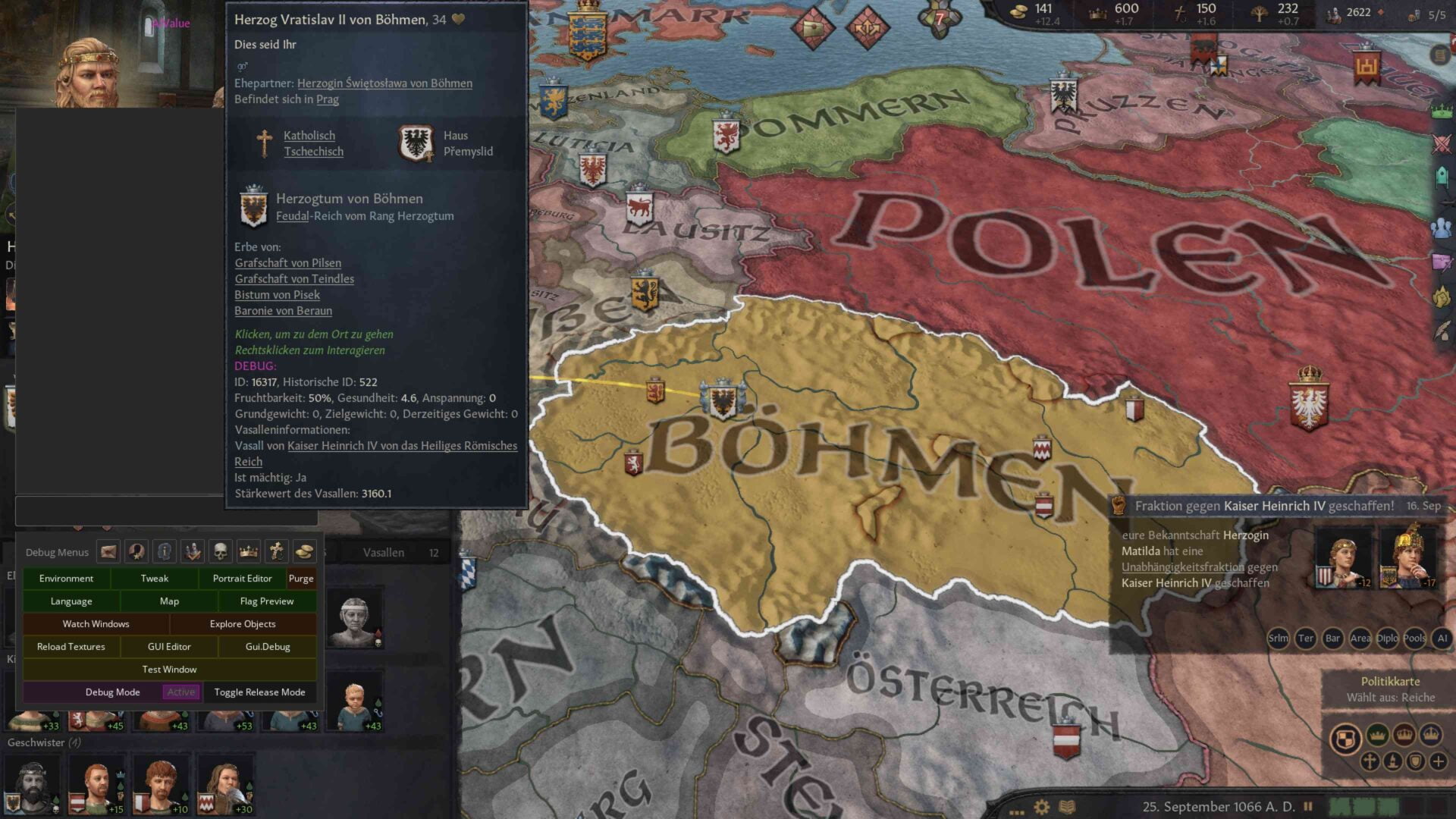
Basic Tips for using Cheats
The Cheat Console allows you to influence just about every aspect of the game. However, there are a few basic things to keep in mind:
- Accessing Character Information: Move the mouse button on any character portrait to display all additional basic information such as ID, Historical ID, Fertility, Health, Current Stress Level, Base Weight, Target Weight, and Current Weight. The character ID is an important basis for various cheats – write the ID of your current ruler down.
- Displaying Cheat options via TAB key: Enter a basic Cheat such as “add_perk” or “add_trait” into the Cheat Console and press the TAB key to display all available options in form of a long list in the window above the console line. You can scroll through this list by using the mouse wheel or the arrows.
- Change the currently played character: Switch from your current ruler to any other ruler by pressing the SHIFT key and left-clicking on the portrait of the desired character.
- Apply Cheats to your character: If you want to pimp your current ruler through Cheats, just type in the Cheat (plus a value for skills) and confirm it by pressing Enter. You have to enter an ID for Cheats that affect other persons. The basic amount for Cheats like Gold or Prestige is always 1,000, unless you enter a different value.
- Using Console Shortcuts: Below the console line there are several icons that grant you quick access to certain commands. With “Yesmen” you force the AI to accept all of your character’s suggestions, “Kill” kills the current ruler, a left-click on the cross icon provides you with 1,000 Piety, a left-click on the Gold icon flushes 1,000 Gold into your wallet.
Common Cheats for Crusader Kings 3
Common Cheats either affect the player character or other characters directly, or affect the Realm, Culture, or Faith. After entering the first part of the Cheat with the underlying command (for example, “add_trait”, “add_maa”), press the TAB key to display all available options.
Contents in square brackets, such as [Character ID] or [Trait ID], indicate a required input that includes a name from the game. You can see the character ID of your player character via mouseover. For [Value] you enter a numerical value of your choice – for example “300” for the cheat “gold 300”, which will provide your character with 300 Gold.
Cheats for Character Value Changes
| Cheat Code | Effect |
|---|---|
| set_diplomacy [Value] [Character ID] | Sets the Diplomacy ability of [Character ID] to [Value]. |
| set_martial [Value] [Character ID] | Sets the Martial ability of [Character ID] to [Value]. |
| set_stewardship [Value] [Character ID] | Sets the Stewardship ability of [Character ID] to [Value]. |
| set_intrigue [Value] [Character ID] | Sets the Intrigue ability of [Character ID] to [Value]. |
| set_learning [Value] [Character ID] | Sets the Learning ability of [Character ID] to [Value]. |
| set_prowess [Value] [Character ID] | Sets the Prowess ability of [Character ID] to [Value]. |
| add_lifestyle_xp_all [Value] [Character ID] | Adds the set amount [Value] of Experience Points to all [Character ID] Lifestyles. |
| add_diplomacy_lifestyle_xp [Value] [Character ID] | Adds the set amount of [Value] Experience Points to the Diplomacy Lifestyle of [Character ID]. |
| add_martial_lifestyle_xp [Value] [Character ID] | Adds the set amount of [Value] Experience Points to the Martial Lifestyle of [Character ID]. |
| add_stewardship_lifestyle_xp [Value] [Character ID] | Adds the set amount of [Value] Experience Points to the Stewardship Lifestyle of [Character ID]. |
| add_intrigue_lifestyle_xp [Value] [Character ID] | Adds the set amount of [Value] Experience Points to the Intrigue Lifestyle of [Character ID]. |
| add_learning_lifestyle_xp [Value] [Character ID] | Adds the set amount of [Value] Experience Points to the Learning Lifestyle of [Character ID]. |
| set_sexuality [Sexuality ID] [Character ID] | Gives [Character ID] the sexual orientation [Sexuality ID]. |
| instant_birth | Pregnancies last only one day. |
| end_pregnancy | Terminates a pregnancy. |
| age [Value] [Character ID] | Makes [Character ID] age by [Value] years. |
| kill [CharaCter ID] | Kills [Character ID]. |
| set_nick [Nickname ID] [Character ID] | Gives [Character ID] the nickname [Nickname ID]. |
| remove_nick [Character ID] | Removes the current nickname from [Character ID]. |
| add_perk [Perk ID] [Character ID] | Adds the [Perk ID] Attribute to [Character ID]. |
| remove_perk [Perk ID] [Character ID] | Removes the [Perk ID] Attribute from [Character ID]. |
| gain_all_perks [Character ID] | Gives [Character ID] all Lifestyle Perks. |
| gain_all_dynasty_perks [Character ID] | Grants [Character ID] all Dynasty unlockables. |
| add_trait [Trait ID] [Character ID] | Adds the [Trait ID] Trait to [Character ID]. |
| remove_trait [Trait ID] [Character ID] | Removes the [Trait ID] Trait from [Character ID]. |
| clear_traits [Character ID] | Removes all Traits from [Character ID]. |
| add_dread [Value] [Character ID] | Adds set amount [Value] of Dread to [Character ID]. |
| add_piety [Value] | Adds [Value] Piety. |
| add_prestige [Value] | Adds [Value] Prestige. |
| set_faith [Faith ID] [Character ID] | Gives [Character ID] the [Faith ID] Fait. |
| set_focus [Focus ID] [Character ID] | Gives [Character ID] the Lifestyle Focus [Focus ID]. |
| set_culture [Culture ID] [Character ID] | Gives [Character ID] the Culture [Culture ID]. |
| dynasty_prestige [Value] [Dynasty ID] | Adds the set amount [value] of Prestige to the Dynasty [Dynasty ID]. |
| add_stress [Value] | Adds [Value] Stress. |
| gold [Value] | Adds [Value] Gold. |
| add_secret [Secret ID] | Adds the Secret [Secret ID] to the current character. |
| know_schemes | Reveals all Schemes currently active against the player character. |
| end_schemes | End all Schemes against the player character. |
| yesmen | Forces the AI to accept all suggestions made by the player character. |
| give_title [Title ID] [Character ID] | Grants [Character ID] the Title [Title ID]. |
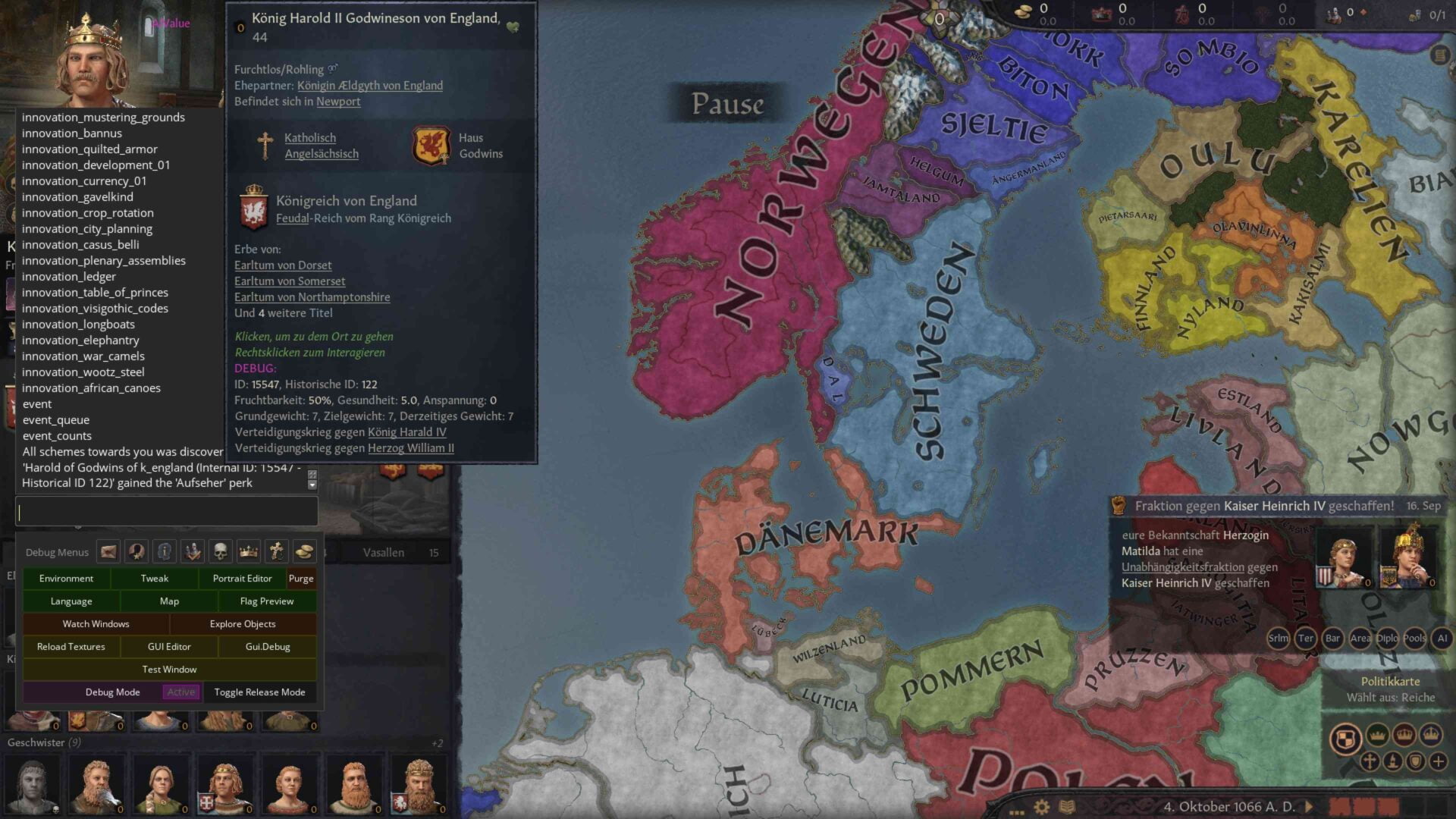
Cheats for changes in Realms & Religions
| Cheat Code | Effect |
|---|---|
| add_claim [Title ID] [Character ID] | Adds a Fabricated Claim of [character ID] for [Title ID]. |
| give_title [Title ID] [Character ID] | Gives [Character ID] the Title [Title ID]. |
| clear_title_laws [Title ID] | Removes all Succession Laws from [Title ID]. |
| add_maa [Regiment ID] [Character ID] | Adds Men for Arms Regiment [Regiment ID] to [Character ID]’s troops. |
| add_realm_law [Law ID] [Character ID] | Adds Law [Law ID] to the Realm of [Character ID]. |
| change_development_level [Value] [County ID] | Adds the set amount [Value] of Development to the County [County ID]. |
| change_culture [County ID] [Culture ID] | Changes the County’s Culture [County ID] to [Culture ID]. |
| merge_culture [Culture ID A] [Culture ID B] | Changes the culture of all controlled Counties from [Culture ID A] to [Culture ID B]. |
| instabuild | Holdings and Buildings in the controlled Area are completed after one day of construction. |
| event [Event ID] | Triggers the [Event ID] Event. |
| add_doctrine [Doctrine ID] [Faith ID] | Adds the Doctrine [Doctrine ID] to the Faith [Faith ID]. |
| remove_doctrine [Doctrine ID] [Faith ID] | Removes Doctrine [Doctrine ID] from Faith [Faith ID]. |
| change_fervor [Value] [Faith ID] | Adds the set amount [Value] of Fervor to the Faith [Faith ID]. Negative Values decrease the Fervor. |
| discover_era [Era ID] | Discover the Era [Era ID] and any associated Innovations for the player character’s culture. |
| discover_all_eras [Character ID] | Discovers all Innovations for the culture of [Character ID]. |
| discover_fascination [Character ID] | Discovers the Innovation for the culture of [Character ID], which receives the current Cultural Fascination. |
| discover_innovation [Innovation ID] [Character ID] | Discovers [Innovation ID] for the culture of [Character ID]. |
Translation by: Dennis Anjuschin
No related articles found.










